#all the solo paul photos are done now
Text
Meredith: First Time Caller, Long Time Listener - Chapter Two: Out the Dark
Author Notes: I'll beautify the post later - I'm exhausted and pumped up from a date with my partner and hanging with my homie that I haven't seen in-person close to a year. Crazy, huh? But we kissed! And I've never kissed before! History in the making! Anyways, I figured I'd drop this before life gets in the way again. Not much happens. Apologies. I've literally had all of this chapter written except for the last two paragraphs for weeks if not months now, but best to get it out of the way. I'm so excited for what's to come...the story of Meredith is near and dear to my heart and so help me, I will fight for her.
Of course, if you're just seeing this, do read Chapter One: Fire Starting first! It's even shorter and pinned on my blog!
------
Tags: @nocturnest @brittklein18 @silver-spoon-paper-plate @luluartpop @pretty-little-mind33
Yes, I do keep track of y'all and really appreciate that you're giving me a chance. Seriously. Thank you. Please don't think I'm stalking you. Pretty please.
------
Chapter Summary: Without Lemon, Tangerine gets a job of his own.
Word Count: 632
-------
Chapter Two: Out the Dark
One week. One fucking week.
More than long enough to take a solo job. Extra income was always a plus.
Against his better judgement of being fucking proactive like a professional, he couldn’t get the possibility of the whole situation suddenly going tits up off his mind, keeping Tangerine pathetically glued to his seat with the occasional fidget aside, eyes darting from anything akin to a pin drop.
After hours and still on edge, he’s checked every nook and cranny of the house.
Nothing bugged. Nothing hiding to ambush. Nothing out of the fucking ordinary.
He’s unable to stay focused on his novel, the swashbuckling antics of the Three Musketeers only fuelling his panic. He isn’t D’Artagnan at the Bastion de La Rochelle; he’s Milady on trial.
He thought about going to a pub, but he preferred to drink only after a job, and he hadn’t done shit that day.
“These the Twins?” Deep. Feminine. Mature.
“One of them.”
“I see. Still able to take on new clients?”
Why the fuck else would you call? “Yeah.” Sarcasm slipped in. He had gotten his fill of impertinent phone calls for the day.
“Perfect.” A tad higher-pitched. Pleasant. Mocking? “In the States, Saint Paul, Minnesota…”
Saint Paul.
It had been seven years since the Twins had taken their only job there.
It paid 10 million American dollars and he leaped at the chance.
The job was right fucked up. He’d done his share of shit, but Saint Paul made Bolivia child’s play.
That being said, Saint Paul was a big part of why he and his brother were so feared and successful nowadays. And he figured he’d at least spare the decency of never showing up there again.
Until the right business opportunity arose, of course.
“...Central District, there’s a cop, Justin Geoffrey.”
Justin Geoffrey.
The name was familiar.
He hadn’t recalled meeting or killing the guy, but it rattled in the back of his head.
“Sparing details, he’s crooked.” Attempting aloofness. Actually aggrieved. “It’s. Personal. I want him dead. I’m willing to pay three million–”
Well, shit.
“Consider it done. I’ll book a flight to Minneapolis.”
“Good. May I text this number?” More relaxed.
“Yeah.”
The line hung up. Within seconds, he receives a message from a contact identified only by a black-and-white square emoji.
🔲: Save this number and send a photo of Geoffrey’s body here. I’ll complete the wire transfer once you’re done.
The adrenaline coursing from the assignment of a mission pushed him to finally get off his ass and text Lemon.
🍊: Got a job.
🍋: See? doing something with your time already
🍊: In Saint Paul.
Tangerine knew Lemon would take longer to respond after mentioning that. His foot tapped even quicker.
🍋: Are you okay?
🍊: What kind of question is that? I do the job and come right fucking back. Simple.
🍋: You’re amped up again bruv you’d never go back there
🍊: Until now. Client’s offering three mil
🍋: three mil is fucking insane but maybe this is a trap?
🍊: Wouldn’t they want both of us? And what was that about you not bleeding? Same thing, I’ll handle shit
🍋: I don’t trust this. Seven years and now you get a call from that place?
🍊: We deliberately avoided Minnesota for years, wasn’t fucking blindness
🍋: This is Diesel shit bruv
🍊: Fucking again?
🍋: Just be on the lookout, I don’t like this at all
Tangerine lowered his phone with a huff. He routinely obtained what he needed for the job: ammunition, bulletproof vest, first-aid, holsters, weapons. All-in-all while slamming clothes into his suitcase, he was just relieved to do something of the ordinary in spite of the White Death bullshit.
Justin Geoffrey.
Tangerine clarified he had stolen the right ticket and left the house.
------
"Anger, which, far sweeter than trickling drops of honey, rises in the bosom of a man like smoke." - Homer
#tangerine bullet train#lemon bullet train#bullet train#bullet train movie#bullet train fanfic#original character#fanfic#bullet train tangerine#tangerine
4 notes
·
View notes
Text
Artist Research #7: Alec Soth

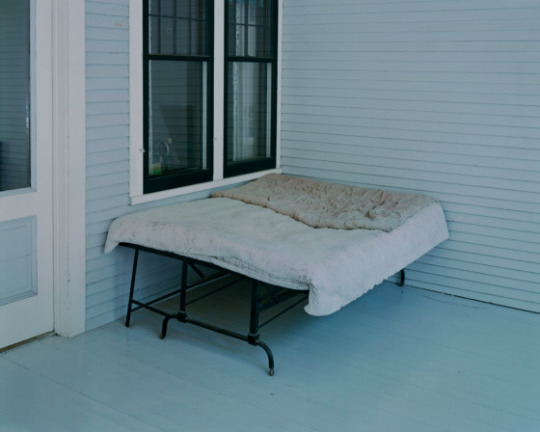
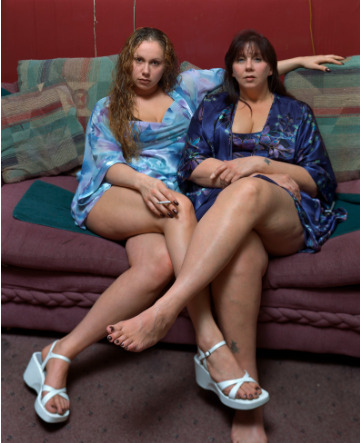
Introduction/Background:
Alec Soth is an American photographer born in 1969 in Minneapolis, Minnesota. Throughout his career as a photographer, he has published over 25 books and done over 50 solo exhibitions. Growing up he was known to be very shy during school, but nevertheless he successfully studied and graduated from Sarah Lawrence College In New York. His photographic style is documentation and with this style he is concerned with “mythologies and oddities that proliferate America’s disconnected communities' ' (Magnum, profile). His projects tend to feature the midwest in America in a large scale format. Soth’s view of photography is very unique with his work being compared to works of literature, but Soth believes photography to be more fragmented; “It’s more like poetry than writing a novel” (Magnum, profile).
Notable works:
Alec Soth’s Sleeping by the Mississippi is one of his most defining photo book publications. Published in 2004, this was Soth’s first book and established him as one of the leading figures of photographic practice. This photo book depicts a series of road trips along the Mississippi river. To show these road trips, he photographs a mix of individuals, landscapes, and interiors that all convey the mood of loneliness and longing. Sloth merges a “documentary style with poetic sensibility” (Mackbooks). He first began to get the idea for this project when he began to get influenced through seeing the tradition of road trip photography. He decided to make this his own tradition and started following the Mississippi river in the car. He used the river as a way to connect with the people he photographed along the way. His strategy was to stop his car as soon as someone or something caught his eye, although this didn’t go exactly as planned since the photos he ended up taking weren’t what he envisioned. He eventually was able to capture what he wanted when he met the people along the Mississippi and they let him into their homes.
Awards/Nominations:
Alec Soth has won many awards in his life so far. A few of these awards include the following:
1999: McKnight Foundation Photography Fellowship, Minneapolis, MN.
2001: Travel and Study Grant, Jerome Foundation, for Sleeping by the Mississippi.
2003: Santa Fe Prize for Photography.
2004: McKnight Foundation Photography Fellowship, Minneapolis, MN.
2006: Finalist, Deutsche Börse Photography Prize. A £3000 prize.
2008: Bush Fellowship, Bush Foundation, Saint Paul, MN. A $50000 grant.
2013: McKnight Foundation Photography Fellowship, Minneapolis, MN.
2021: Honorary Fellowship of the Royal Photographic Society, Bristol
Personal thoughts:
From researching Alec Soth and his work, I feel like his process of taking pictures is similar to mine, especially with how he took the photos for his project Sleeping by the Mississippi. Oftentimes I don’t have a set plan for how my pictures are going to look or even what pictures I will be taking at all. I did this for the scavenger hunt assignment, which I walked around Fresno State as well as my house looking for anything that stood out to me. I take a lot of comfort in the way he does this and even the fact that he almost didn’t stick with photography comforted me in a way as well. This gives me hope that even if I’m discouraged about how my photos look now, I know that if I keep on going I can accomplish everything I want to achieve.
Works cited:
https://www.magnumphotos.com/arts-culture/alec-soth-sleeping-by-the-mississippi/
https://www.magnumphotos.com/photographer/alec-soth/
https://www.mackbooks.us/products/sleeping-by-the-mississippi-br-alec-soth
https://alecsoth.com/photography/about
https://en.wikipedia.org/wiki/Alec_Soth
0 notes
Text
Documentary Review - The Lost Weekend: A Love Story / We Are Not Alone
This week I got to review two very different documentaries now available on home entertainment.
The Lost Weekend: A Love Story
May Pang is such a fascinating figure within The Beatles' history. She started as a music industry receptionist working for Apple Records in the early 70s just as The Beatles broke up and John Lennon, George Harrison and Ringo Starr's solo music was being released under Apple. This lead to her becoming the personal assistant to Lennon and wife Yoko Ono. During the couple's "lost weekend" as it became known, Ono encouraged Pang to go out to L.A. with Lennon. In that time from mid-1973 to early 1975, in addition to working with Lennon on his releases, they fell in love. As we all know, Lennon and Ono reconciled in early 1975 and the relationship with Pang ended. Since then Pang has been a footnote in Lennon-related documentaries, but now it is her turn to tell her story with the documentary The Lost Weekend: A Love Story, released earlier this year and dropping on blu-ray and VOD this week.

blu-ray cover
In this doc, Pang narrates and appears in both new interviews as well as archival interviews telling her story of that "Lost Weekend" that lasted 18 months. In that time period Lennon did the albums Mind Games, Walls and Bridges and Rock 'n' Roll. Lennon partied and collaborated with the likes of Mick Jagger, Alice Cooper, Elton John and more. There's stories within stories of stories here. It also shows how Lennon and Paul McCartney began talking and spending time together again. But one of the most touching parts of this doc is how Pang helped Lennon reunite with his son Julian (his son from his previous marriage to Cynthia Lennon), who appears in this doc as well. There is a great deal of Pang's own photographs, mind-blowing archival footage, animation to fill in certain anecdotes and more.

Lennon and Pang circa 1973
As I've said many times before, I am a firm believer that if you are going to make a documentary about The Beatles, the filmmaker needs to shine a light on some new aspect of The Beatles’ history or present something new, otherwise they are just reiterating what was already said with the 1982 feature The Compleat Beatles and 1995′s doc mini-series The Beatles Anthology, which were the most comprehensive Beatle docs ever. Close collaborators like George Martin are perfect subjects and one of my favorites was Good Ol' Freda about The Beatles' secretary and fan club president Freda Kelly. Pang's doc treatment is thoroughly intriguing (especially for Beatle fans) but I actually wanted it to go on longer beyond Lennon's death in 1980. The doc doesn't get into her being a published author, a photographer who has had photo shows all over, designed jewelry, and hosts a web radio show. I kind of wished it had showed what she has done since then. But there is a touching moment towards the end, where it breaks down the 4th wall of the documentary in a truly beautiful way (tried to not spoil it). Hopefully they make a sequel or an extended cut.
For info on The Lost Weekend: A Love Story
4 out of 5 stars
We Are Not Alone
I've always had a fascination with alien and UFO encounters. In college I did a paper about society's fascination with aliens and specifically the incident in Roswell, NM in 1947 when the U.S. government acknowledged a flying disc, but then retracted the story saying it was part of a weather balloon. Conspiracy theorists since then have had a field day with what is to be believed government cover-ups. At a time when there have been government hearings about UFOs recently, the new documentary We Are Not Alone hit VOD earlier this month.

movie poster
Director Michael Mazzola follows investigative filmmaker and reality TV star Serena DC as she explores UFO and alien encounters. There are a number of interviews with UFO experts as well as a better understanding of why they have visited Earth.
This doc is good, informative and is never boring. But the problem is, I've seen a number of docs about alien encounters and I didn't feel that this shed new light on the subject. Some of the interviewees had some interesting insight, but it wasn't anything new per se. If you are just starting to go down the UFO sighting rabbit hole, this would be a good place to start though. But it will make a believer out of skeptics. I've always believed it's a little ludicrous to think based on the vast canvas of outer space that Earth would be the only one with inhabitants, and this doc certainly makes that case as well.
For info on We Are Not Alone
3 out of 5 stars
#documentary#movie reviews#the lost weekend: a love story#may pang#john lennon#eve brandstein#richard kaufman#stuart samuels#we are not alone#michael mazzola#documentary review#film geek
1 note
·
View note
Text
"There is nothing like returning to a place that remains unchanged to find the ways in which you yourself have altered." - Nelson Mandela
Hey, hey, people, Greg Owlman here. What? Did you expect someone else? Now, I know that it has been nearly a year since last we saw one another, but I have a valid excuse this time. Stuff happened. That's right, this is my excuse, and I am sticking to it. Sufficient to say is that on the Internet, it's best not to give away too much about yourself. However, posting your opinions, whether they are relevant or not, is another matter entirely. Where was I again? Right, I was just about to tell you about our newest offer. A THREE-IN-ONE COMBO PACKAGE, ALL FOR THE PRICE OF ONE. You heard it right folks, its three ideas for one post. A real doozy and a downright steal considering the economy. Not convinced, let me give you a taste of things that might have been.
"I need more photos of Spider-Man!" ; a classic meme about our favorite Web Crawler, but you want to know what's not a classic or favoured by anyone with taste? The answer is the current run of the Amazing Spider-Man title, which it's best described as the Paul Rabin SI/OC story. Dear lord, I can't even call this a narrative let alone a story. Are we sure it isn't Dan Slott writing under a pseudonym? He is doing another Superior WHO run afterwards? Jeez, not only is there another lame fanfiction in official printing, but we also have to deal with the Superior Spider-Man 3: The Revengeance instead of the Amazing Spider-Man 3 for crying out loud. Anyways, let's clean up this mess shall we? First off, no more Paul. Forget he exists and let's assume everything done following the Spider-Man Beyond didn't happen. Peter Parker has finally beaten those allegations and gotten his doctorate, hallelujah. Let's be honest, Peter is nearly in his late twenties and he doesn't need to deal with academics anymore than the rest of us. He is back working at the Daily Bugle again under Robbie as his go-to guy regarding science since it neatly combines two aspects about Spidey, his past working for the press and his love for science. But, Peter wants something more suited towards research and development. Here comes old Norman Osborn, stalking Peter once more since he wants the two of them to work together and is trying to break the ice regarding the fate of baby May Parker. You know Peter and MJ's newborn who supposedly died, but was actually kidnapped by Norman? Yeah, that May. Anyways, besides these things, Peter is facing his biggest challenge yet, which is being content with his life and beginning to find his happiness. Who is he dating, you might ask? Well, the way I see it, Peter might just deal with a burgeoning polyamorous relationship between him, MJ and Felicia, after all if it worked for the X-Men, it will work for these guys. Also, the way I see it, Peter is doing a lot more team-ups this time around rather than being forced to solo it. I want a proper New Avengers reunion, dang it!
Todd Howard at it again with his newest classic, Skyrim IN SPACE! I am not the first to say that Starfield is average at best, but that has to do mostly with the fact that Bethesda kept under wraps and didn't interact with their audience to receive feedback while they could still change the game. But I am not here to rant about the game, there are plenty of people doing that. Instead, I will present my own vision about what it could have been. First of all, I would restrict the number of systems to only a handful, after all quality trumps quantity every time. Second of all, I would move most of the major settlements to one world. That planet being Proxima Centauri b since apparently Alpha Centauri is a bust and we can't blame the Stranger from Outer Wilds regarding cloaking those worlds. If you are curious about how the maps would look like here are some Reddit threads that had the closest things in mind to my idea, the images belong to their respective creators. Here are the links: https://reddit.com/r/imaginarymaps/s/ASsmDhI3du and https://reddit.com/r/imaginarymaps/s/bVFWQGzk33 . Personally, I would have liked for all recruitable crew members to have a loyalty mission or even some recurring mini quests other than the stuff we needed to do in order to get them. With that in mind, maybe they could have added more dialogue options for the members of Constellation that don't get to interact with the main character as much. Looking at you, Mateo. Or maybe have the same aforementioned treatment, but sadly, old Toady boy decided that it isn't too cash money to implement. Also, am I the only one not really interested with whatever the Freestar Rangers plotline is doing? Sure, exposing the corruption hidden in plain sight within the Collective is all fine and dandy, but maybe we could have gotten something more exciting like uncovering a conspiracy to create psychic super soldiers and agents of a vague, yet menacing, government agency à la Firefly. Would have been way more fun than playing Space Texas Ranger. Speaking of factions, maybe they could have added some benefits to joining them other than getting a nice apartment at the end, like a monthly salary, the ability to skip contraband searches every once in a while or even discounts at affiliated shops for crying out loud. Honestly, at this point maybe it would be better to play Star Sector rather than give you guys idea about modding an economic simulation in a Bethesda game, thereby letting you play the role of a space merchant à la Salvor Hardin from Asimov's Foundation series. The books, not the TV series.
Star Wars is a long way from home. Honestly, a lot of the stuff that Disney has done is a hit or miss, therefore the expanded material such as books and especially comic books have been carrying the franchise moreso than the movies or the shows. If it were up to me, I would just send the Sequels down the way of the dinosaurs, but sadly they are here to stay in all their uncreative glory. Therefore, I will not waste my time or yours with talking about anything after the Original Trilogy in terms of chronology. Oh, dear readers, what I have mind will take us all over the timeline. Honestly, I like the High Republic era, but they could have just said that the Republic lost contact with the Outer Rim territories after the Great Hyperspace Disaster than saying they haven't even been explored yet. Another thing that I liked is Star Wars Visions, which explores various themes and ideas while using the GFFA as background material without necessarily incorporating the stories into the timeline. Where am I going with this? Well, I have been wondering what if there were stories set throughout the Star Wars galaxy that we just haven't heard about and they are canon? I mean, we have a blank slate spanning thousands of years past and future, where we can incorporate our own stories regarding this galaxy far, far away without worrying about existing material contradicting us and these small chapters in the very large book that we call history could have consequences on the movie era stories or even happen long after these events passed. This is an opportunity, that too few authors online that I have seen have taken since most of them prefer to stick to what we already seen. As such, I duly elected myself to notify you about taking this chance by the jugular and see how far you can stretch the material. Have fun!
Now that I have presented my offer, all I can say that it's good to make a comeback even if no one will take notice of it. Also, I will take this opportunity to mention that my last post regarding Star Trek Discovery and how it could have been improved has done better than expected, therefore it would be great if you would spread the love to those other lonely posts of mine. Enough shilling and let's properly end this new chapter in my little corner of the platform.
This has been Greg for Owlman's Previously Owned Ideas. We do not advise you to trust Todd Howard's little lies ever again. We also do no refunds.
0 notes
Text


21 February 2023: Reality, Bill Callahan. (2023 vinyl issue of 2022 Drag City release)
I previously bought this, singer-songwriter Callahan’s 18th album of new solo material by my count, and the seventh credited to his own name after billing himself for 15 years as Smog, on CD when it came out late last year. (This page was on hiatus, so there is no post to link to.) Callahan did some of my favorite music of the Aughts and Teens, but I struggled to enjoy some of his recent albums and I outright refused to buy his recent guest-laden double album of covers co-billed to Bonnie Prince Billy. I’ve never been a Will Oldham fan, and I buy Callahan albums to hear him sing, not a rotating cast of indie personalities. I was nervous, then, when Reality was announced, and I wondered if I’d even buy it at all. I don’t remember what spurred me to get a copy, but I wound up liking it considerably; I think it’s his best work since 2013′s Dream River, and I think it may even transcend that one for me.
I’ve bought all of the Callahan-credited albums before this one on vinyl, but I opted for CD last year because I wanted to hear it during its year of release. At first I didn’t intend on following up and getting the vinyl when it came out a couple of months ago, but I liked it sufficiently to want a copy to put alongside all my other Callahan vinyl. I’m really glad that I bought it, because I’ve been playing it a lot again and I think it’s a fantastic album. This my be my favorite Callahan album since the first one of his I bought, 2009′s Sometimes I Wish We Were an Eagle. My brother recently saw Callahan do an intimate show at the Rose Bowl Tavern in Urbana, Illinois. I’d given up on seeing Callahan live, as I must have seen him five times within a short span of years and each show was diminishing returns, almost to the point of boredom. Callahan reportedly did a very exciting, dynamic show in Urbana, and now I wish I’d seen him on this current tour!
Above are the front and back covers.
Below is the opened gatefold.

Below are both sides of the two inner sleeves of this double album. The design is ever so slightly different on the first sleeve, the album title done in backwards block lettering on side two of the first inner. (The entire world seems insistent that the title of this album is YTILAER. This kind of slavish, literal interpretation of typography has always annoyed me. The example I always give is when people insist that Brian Wilson’s album Smile is actually titled SM!LE. These silly insistences seem to happen arbitrarily; there are plenty of albums with inventive typography that don’t get rendered into an artificial album title. Hell, even the Wikipedia entry for this Callahan album calls it Ytilaer. Ugh!)




Below is side one’s label. They all look like this. The sketch is by Callahan.

Drag City included a promotional poster with my order. As much as I like the album cover, all of it painted by artist Paul Ryan, I may like his impressionist painting of a pirate on this poster even more. It’s pretty large and hard to photograph on my ironing board.

Below is a photo from my brother’s tumblr page, showing the poster in more of a head-on view.

0 notes
Text
2023 February Feature
For the February Feature video, I am well aware that we are all likely very tired of winter and so I thought I would heat things up with some great art, a mystery thriller, and plenty more for this feature video. As always if you like what you see in the video please consider supporting the creators by following the links and maybe buying some of these amazing works featured in the video. And on a final note before we get to those creators, if you love winter, then you may need to see a doctor for a prescription of warm summer days and see you in the fall. First up to warm the day up is…
Shaun G. who has a very unique and abstract design scheme that helps to bring to the canvas something truly unique and special to see. These interesting images need a unique eye to create and bring to life. The artist he own statements:
“About me, the condensed version. Homeschooled art nerd from Wisconsin. I went to music school but hated it. I have a solo album out, and I'm working on three more for release soon. I had a running comic in the highschool in my hometown. I've sold maybe something like 50-60 paintings in my career. I've done several shows. I recently quit working to pursue a full-time art career. I was a balloon animal maker for every major sports team in Minnesota, and a face-painter too. I owned my own bonsai, garden, landscaping, and lawn service for 5 years, and also ran a rickshaw business in a small town. I live in the twin cities now and I'm just learning the ropes of the local art profession here.”
You can find more of his works at the links below.

Next up we have a mystery and thriller from writer Maggie Casteen. This is a sequel for the Kathy Hamilton series that she has created. Maggie’s description states,
“In the next installment of the Kathy Hamilton Mystery series a lot of changes are coming for Kathy. After a successful trip in the UK with the Brooks case, Kathy is back home in Rosemont and looking for a chance to work as an investigator. A local defense attorney, Bailey Clark, decides to give her a chance, but her first case could be her last. The client is accused of killing a young woman outside of Delany’s Bar, but the only thing is he can’t remember what happened. Did he do it or is something more sinister at work underneath? Kathy will follow the clues to discover the truth...if it’s not too late.
Full of mystery, twists, and turns Hush Now, Don’t Cry will take you on a ride that will leave you wondering what happens next.” Here is a sample of that great work.
#
Prologue
Her eyes glanced across the room as she walked into the Irish bar. She took a seat at the bar and tried to blend in. “He said he’d be here at midnight.” she said to herself. Sandy looked at the clock behind the bar; fifteen more minutes to wait. She laid her purse on the bar in front of her and tried to stay calm. There were plenty of people there having a good time and making memories that they would laugh about later. Sandy just sat there, keeping her eyes forward. The last thing that she wanted was trouble. In just one week, her life had been turned upside–down. I’m just a waitress, she thought, and now after this I’ll be nobody. Sandy looked at the clock again when she saw a man walking towards her. Oh no, she cringed inside, but it was too late; she had been noticed.
“Can I buy you a drink?” Sandy looked up and saw a good-looking guy maybe a little over six-foot leaning against the bar.
“No, that’s ok” she said smiling, “I’m not going to be here much longer.”
“Aww, come on” he said with a sly smile, “one drink and I’ll help you wait it out.”
Wow, this guy is not going to go away, Sandy thought to herself.
“Name’s Chase. What’s yours?” he asked as he held out his hand.
“Umm, it looks like my friend is late,” Sandy said as she began to leave the bar, “Maybe...”
“Look,” he said grabbing her arm, “all I want is a drink and your name,” he said; the smile had vanished.
“Stop it!” she said pulling away, “You’re hurting me.”
She said louder than she intended, and people were starting to look.
“Hey! Leave the lady alone,” shouted the bartender, approaching Chase. It had been a fairly quiet night and he wasn’t about to let anybody ruin it now.
“Fine, Kevin,” Chase said as he threw up his hands in retreat. “Go on; leave then,” he spat at her. Sandy grabbed her purse and softly smiled at the bartender as she made her way out. He’s not going to like this she thought as she walked outside and stood beside the bench. She leaned against the glass window that read Delany’s Pub & Pool Hall as she wiped the tear from her check. Then, she started to check her phone when she felt someone come up behind her and point something into her back. God save me, she thought as she felt her tears run down her cheeks.
“Shhh,” the voice behind her whispered, “hush now, don’t cry.” And then he slowly grabbed her by the waist. “I’m going to take care of you.” Sandy closed her eyes as they started to back into the alley, she knew what was coming...she had been found.
#
Suspenseful writing and great introduction to the book. If you enjoyed the story please go to the links below and get a copy of this great mystery.
Barnes and Noble:
https://www.barnesandnoble.com/w/hush-now-dont-cry-maggie-casteen/1139454226?ean=9781098379445
Amazon:
The next up is Stefano Corrao, he is an artist that does some very detailed and interesting art that ranges from comic book art to fantasy landscape art and even caricatures. The pieces are very detailed and well designed. Comments from the artist.
“Hi, my name is Stefano Corrao and I'm an Italian artist, these are some samples of the graphic novel I made about Bob Dylan's life. The book is published by Edizioni NPE : www.edizioninpe.it
The title in Italian is:
"Bob Dylan - La risposta è nel vento"
("Bob Dylan - The answer is in the wind".)
and can be bought on their website, in all the Italian bookstores (I don't know if it's already available abroad) and can also be bought on amazon.
I am a very versatile artist and I can do many different genres and styles, if you could please mention on your magazine also my website: www.stefanocorrao.com where you can view various works.”

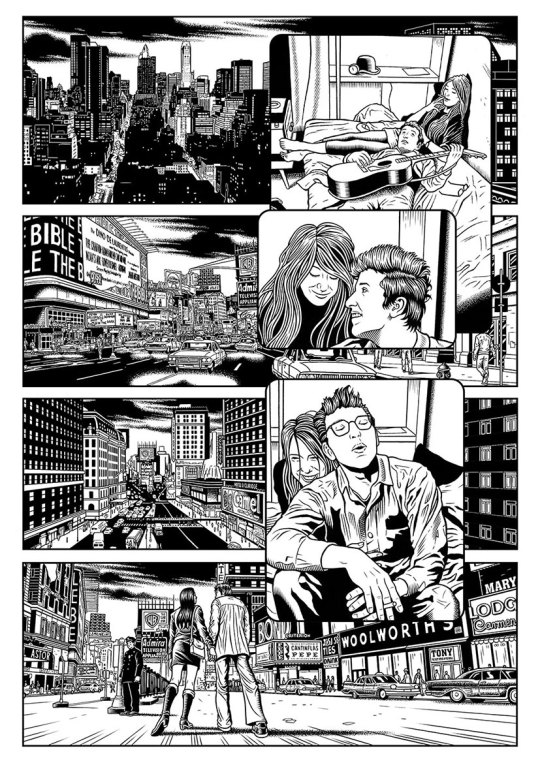
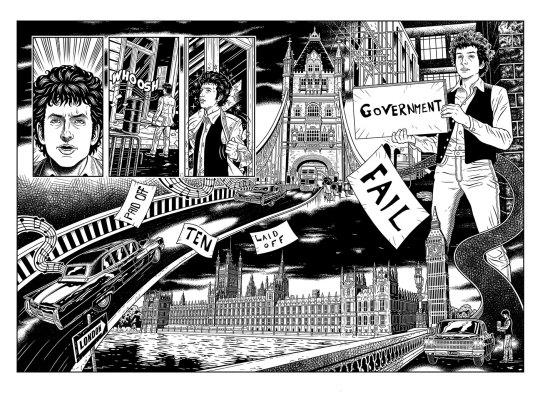
Rounding out this month's issue is a great podcast that talks about those family issues and hopes to educate individuals about issues that may arise within family life. From the creator of the podcasts own words.
“My name is Stefanie and our podcast is Table for Four! It is a podcast featuring our Hispanic family talking about all different issues that affect all families. Talking about the tough topics, funny stories and learning along with our kids from different perspectives. We invite guests on the podcast and we have fun talking with everyone.
Table for Four is made up of myself, my husband Andre, my oldest son Adriean and my youngest Stefan and we are the Molina Family. We are a Hispanic millennial family trying to navigate this thing called LIFE. We talk about a wide variety of topics that affect all families and we get to use this platform to share our experiences”
Listen to the introduction video right here.
Thank you for joining me for these great creators being featured. Don’t forget to check them out and follow for more amazing content in the weeks ahead. Also remember, Be Your Own Fable.
0 notes
Text
Musicians On Musicians: Paul McCartney & Taylor Swift
By: Patrick Doyle for Rolling Stone
Date: November 13th 2020
On songwriting secrets, making albums at home, and what they’ve learned during the pandemic.
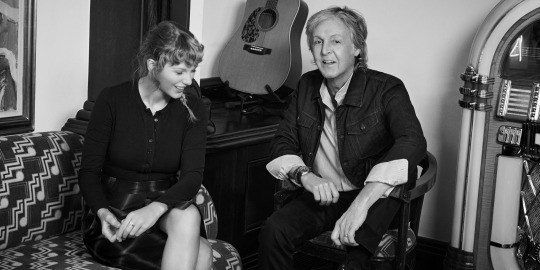
Taylor Swift arrived early to Paul McCartney’s London office in October, “mask on, brimming with excitement.” “I mostly work from home these days,” she writes about that day, “and today feels like a rare school field trip that you actually want to go on.”
Swift showed up without a team, doing her own hair and makeup. In addition to being two of the most famous pop songwriters in the world, Swift and McCartney have spent the past year on similar journeys. McCartney, isolated at home in the U.K., recorded McCartney III. Like his first solo album, in 1970, he played nearly all of the instruments himself, resulting in some of his most wildly ambitious songs in a long time. Swift also took some new chances, writing over email with the National’s Aaron Dessner and recording the raw Folklore, which abandons arena pop entirely in favor of rich character songs. It’s the bestselling album of 2020.
Swift listened to McCartney III as she prepared for today’s conversation; McCartney delved into Folkore. Before the photo shoot, Swift caught up with his daughters Mary (who would be photographing them) and Stella (who designed Swift’s clothes; the two are close friends). “I’ve met Paul a few times, mostly onstage at parties, but we’ll get to that later,” Swift writes. “Soon he walks in with his wife, Nancy. They’re a sunny and playful pair, and I immediately feel like this will be a good day. During the shoot, Paul dances and takes almost none of it too seriously and sings along to Motown songs playing from the speakers. A few times Mary scolds, ‘Daaad, try to stand still!’ And it feels like a window into a pretty awesome family dynamic. We walk into his office for a chat, and after I make a nervous request, Paul is kind enough to handwrite my favorite lyric of his and sign it. He makes a joke about me selling it, and I laugh because it’s something I know I’ll cherish for the rest of my life. That’s around the time when we start talking about music.”
Taylor Swift: I think it’s important to note that if this year had gone the way that we thought it was going to go, you and I would have played Glastonbury this year, and instead, you and I both made albums in isolation.
Paul McCartney: Yeah!
Swift: And I remember thinking it would have been so much fun because the times that I’ve run into you, I correlate with being some of the most fun nights of my life. I was at a party with you, when everybody just started playing music. And it was Dave Grohl playing, and you...
McCartney: You were playing one of his songs, weren’t you?
Swift: Yes, I was playing his song called “Best of You,” but I was playing it on piano, and he didn’t recognize it until about halfway through. I just remember thinking, “Are you the catalyst for the most fun times ever?” Is it your willingness to get up and play music that makes everyone feel like this is a thing that can happen tonight?
McCartney: I mean, I think it’s a bit of everything, isn’t it? I’ll tell you who was very... Reese Witherspoon was like, “Are you going to sing?” I said “Oh, I don’t know.” She said, “You’ve got to, yeah!” She’s bossing me around. So I said, “Whoa,” so it’s a bit of that.
Swift: I love that person, because the party does not turn musical without that person.
McCartney: Yeah, that’s true.
Swift: If nobody says, “Can you guys play music?” we’re not going to invite ourselves up onstage at whatever living-room party it is.
McCartney: I seem to remember Woody Harrelson got on the piano, and he starts playing “Let It Be,” and I’m thinking, “I can do that better.” So I said, “Come on, move over, Woody.” So we’re both playing it. It was really nice... I love people like Dan Aykroyd, who’s just full of energy and he loves his music so much, but he’s not necessarily a musician, but he just wanders around the room, just saying, “You got to get up, got to get up, do some stuff.”
Swift: I listened to your new record. And I loved a lot of things about it, but it really did feel like kind of a flex to write, produce, and play every instrument on every track. To me, that’s like flexing a muscle and saying, “I can do all this on my own if I have to.”
McCartney: Well, I don’t think like that, I must admit. I just picked up some of these instruments over the years. We had a piano at home that my dad played, so I picked around on that. I wrote the melody to “When I’m 64” when I was, you know, a teenager.
Swift: Wow.
McCartney: When the Beatles went to Hamburg, there were always drum kits knocking around, so when there was a quiet moment, I’d say, “Do you mind if I have a knock around?” So I was able to practice, you know, without practicing. That’s why I play right-handed. Guitar was just the first instrument I got. Guitar turned to bass; it also turned into ukulele, mandolin. Suddenly, it’s like, “Wow,” but it’s really only two or three instruments.
Swift: Well, I think that’s downplaying it a little bit. In my mind, it came with a visual of you being in the country, kind of absorbing the sort of do-it-yourself [quality] that has had to come with the quarantine and this pandemic. I found that I’ve adapted a do-it-yourself mentality to a lot of things in my career that I used to outsource. I’m just wondering what a day of recording in the pandemic looked like for you.
McCartney: Well, I’m very lucky because I have a studio that’s, like, 20 minutes away from where I live. We were in lockdown on a farm, a sheep farm with my daughter Mary and her four kids and her husband. So I had four of my grandkids, I had Mary, who’s a great cook, so I would just drive myself to the studio. And there were two other guys that could come in and we’d be very careful and distanced and everything: my engineer Steve, and then my equipment guy Keith. So the three of us made the record, and I just started off. I had to do a little bit of film music - I had to do an instrumental for a film thing - so I did that. And I just kept going, and that turned into the opening track on the album. I would just come in, say, “Oh, yeah, what are we gonna do?” [Then] have some sort of idea, and start doing it. Normally, I’d start with the instrument I wrote it on, either piano or guitar, and then probably add some drums and then a bit of bass till it started to sound like a record, and then just gradually layer it all up. It was fun.
Swift: That’s so cool.
McCartney: What about yours? You’re playing guitar and piano on yours.
Swift: Yeah, on some of it, but a lot of it was made with Aaron Dessner, who’s in a band called the National that I really love. And I had met him at a concert a year before, and I had a conversation with him, asking him how he writes. It’s my favorite thing to ask people who I’m a fan of. And he had an interesting answer. He said, “All the band members live in different parts of the world. So I make tracks. And I send them to our lead singer, Matt, and he writes the top line.” I just remember thinking, “That is really efficient.” And I kind of stored it in my brain as a future idea for a project. You know, how you have these ideas... “Maybe one day I’ll do this.” I always had in my head: “Maybe one day I’ll work with Aaron Dessner.”
So when lockdown happened, I was in L.A., and we kind of got stuck there. It’s not a terrible place to be stuck. We were there for four months maybe, and during that time, I sent an email to Aaron Dessner and I said, “Do you think you would want to work during this time? Because my brain is all scrambled, and I need to make something, even if we’re just kind of making songs that we don’t know what will happen...”
McCartney: Yeah, that was the thing. You could do stuff - you didn’t really worry it was going to turn into anything.
Swift: Yeah, and it turned out he had been writing instrumental tracks to keep from absolutely going crazy during the pandemic as well, so he sends me this file of probably 30 instrumentals, and the first one I opened ended up being a song called “Cardigan,” and it really happened rapid-fire like that. He’d send me a track; he’d make new tracks, add to the folder; I would write the entire top line for a song, and he wouldn’t know what the song would be about, what it was going to be called, where I was going to put the chorus. I had originally thought, “Maybe I’ll make an album in the next year, and put it out in January or something,” but it ended up being done and we put it out in July. And I just thought there are no rules anymore, because I used to put all these parameters on myself, like, “How will this song sound in a stadium? How will this song sound on radio?” If you take away all the parameters, what do you make? And I guess the answer is Folklore.
McCartney: And it’s more music for yourself than music that’s got to go do a job. My thing was similar to that: After having done this little bit of film music, I had a lot of stuff that I had been working on, but I’d said, “I’m just going home now,” and it’d be left half-finished. So I just started saying, “Well, what about that? I never finished that.” So we’d pull it out, and we said, “Oh, well, this could be good.” And because it didn’t have to amount to anything, I would say, “Ah, I really want to do tape loops. I don’t care if they fit on this song, I just want to do some.” So I go and make some tape loops, and put them in the song, just really trying to do stuff that I fancy.
I had no idea it would end up as an album; I may have been a bit less indulgent, but if a track was eight minutes long, to tell you the truth, what I thought was, “I’ll be taking it home tonight, Mary will be cooking, the grandkids will all be there running around, and someone, maybe Simon, Mary’s husband, is going to say, ‘What did you do today?’ And I’m going to go, ‘Oh,’ and then get my phone and play it for them.” So this became the ritual.
Swift: That’s the coziest thing I’ve ever heard.
McCartney: Well, it’s like eight minutes long, and I said, “I hate it when I’m playing someone something and it finishes after three minutes.” I kind of like that it just [continues] on.
Swift: You want to stay in the zone.
McCartney: It just keeps going on. I would just come home, “Well, what did you do today?” “Oh, well, I did this. I’m halfway through this,” or, “We finished this.”
Swift: I was wondering about the numerology element to McCartney III. McCartney I, II, and III have all come out on years with zeroes.
McCartney: Ends of decades.
Swift: Was that important?
McCartney: Yeah, well, this was being done in 2020, and I didn’t really think about it. I think everyone expected great things of 2020. “It’s gonna be great! Look at that number! 2020! Auspicious!” Then suddenly Covid hit, and it was like, “That’s gonna be auspicious all right, but maybe for the wrong reasons.” Someone said to me, “Well, you put out McCartney right after the Beatles broke up, and that was 1970, and then you did McCartney II in 1980.” And I said, “Oh, I’m going to release this in 2020 just for whatever you call it, the numerology...”
Swift: The numerology, the kind of look, the symbolism. I love numbers. Numbers kind of rule my whole world. The numbers 13... 89 is a big one. I have a few others that I find...
McCartney: Thirteen is lucky for some.
Swift: Yeah, it’s lucky for me. It’s my birthday. It’s all these weird coincidences of good things that have happened. Now, when I see it places, I look at it as a sign that things are going the way they’re supposed to. They may not be good now, they could be painful now, but things are on a track. I don’t know, I love the numerology.
McCartney: It’s spooky, Taylor. It’s very spooky. Now wait a minute: Where’d you get 89?
Swift: That’s when I was born, in 1989, and so I see it in different places and I just think it’s...
McCartney: No, it’s good. I like that, where certain things you attach yourself to, and you get a good feeling off them. I think that’s great.
Swift: Yeah, one of my favorite artists, Bon Iver, he has this thing with the number 22. But I was also wondering: You have always kind of seeked out a band or a communal atmosphere with like, you know, the Beatles and Wings, and then Egypt Station. I thought it was interesting when I realized you had made a record with no one else. I just wondered, did that feel natural?
McCartney: It’s one of the things I’ve done. Like with McCartney, because the Beatles had broken up, there was no alternative but to get a drum kit at home, get a guitar, get an amp, get a bass, and just make something for myself. So on that album, which I didn’t really expect to do very well, I don’t think it did. But people sort of say, “I like that. It was a very casual album.” It didn’t really have to mean anything. So I’ve done that, the play-everything-myself thing. And then I discovered synths and stuff, and sequencers, so I had a few of those at home. I just thought I’m going to play around with this and record it, so that became McCartney II. But it’s a thing I do. Certain people can do it. Stevie Wonder can do it. Stevie Winwood, I believe, has done it. So there are certain people quite like that.
When you’re working with someone else, you have to worry about their variances. Whereas your own variance, you kind of know it. It’s just something I’ve grown to like. Once you can do it, it becomes a little bit addictive. I actually made some records under the name the Fireman.
Swift: Love a pseudonym.
McCartney: Yeah, for the fun! But, you know, let’s face it, you crave fame and attention when you’re young. And I just remembered the other day, I was the guy in the Beatles that would write to journalists and say [speaks in a formal voice]: “We are a semiprofessional rock combo, and I’d think you’d like [us]... We’ve written over 100 songs (which was a lie), my friend John and I. If you mention us in your newspaper...” You know, I was always, like, craving the attention.
Swift: The hustle! That’s so great, though.
McCartney: Well, yeah, you need that.
Swift: Yeah, I think, when a pseudonym comes in is when you still have a love for making the work and you don’t want the work to become overshadowed by this thing that’s been built around you, based on what people know about you. And that’s when it’s really fun to create fake names and write under them.
McCartney: Do you ever do that?
Swift: Oh, yeah.
McCartney: Oh, yeah? Oh, well, we didn’t know that! Is that a widely known fact?
Swift: I think it is now, but it wasn’t. I wrote under the name Nils Sjöberg because those are two of the most popular names of Swedish males. I wrote this song called “This Is What You Came For” that Rihanna ended up singing. And nobody knew for a while. I remembered always hearing that when Prince wrote “Manic Monday,” they didn’t reveal it for a couple of months.
McCartney: Yeah, it also proves you can do something without the fame tag. I did something for Peter and Gordon; my girlfriend’s brother and his mate were in a band called Peter and Gordon. And I used to write under the name Bernard Webb.
Swift: [Laughs.] That’s a good one! I love it.
McCartney: As Americans call it, Ber-nard Webb. I did the Fireman thing. I worked with a producer, a guy called Youth, who’s this real cool dude. We got along great. He did a mix for me early on, and we got friendly. I would just go into the studio, and he would say, “Hey, what about this groove?” and he’d just made me have a little groove going. He’d say, “You ought to put some bass on it. Put some drums on it.” I’d just spend the whole day putting stuff on it. And we’d make these tracks, and nobody knew who Fireman was for a while. We must have sold all of 15 copies.
Swift: Thrilling, absolutely thrilling.
McCartney: And we didn’t mind, you know?
Swift: I think it’s so cool that you do projects that are just for you. Because I went with my family to see you in concert in 2010 or 2011, and the thing I took away from the show most was that it was the most selfless set list I had ever seen. It was completely geared toward what it would thrill us to hear. It had new stuff, but it had every hit we wanted to hear, every song we’d ever cried to, every song people had gotten married to, or been brokenhearted to. And I just remembered thinking, “I’ve got to remember that,” that you do that set list for your fans.
McCartney: You do that, do you?
Swift: I do now. I think that learning that lesson from you taught me at a really important stage in my career that if people want to hear “Love Story” and “Shake It Off,” and I’ve played them 300 million times, play them the 300-millionth-and-first time. I think there are times to be selfish in your career, and times to be selfless, and sometimes they line up.
McCartney: I always remembered going to concerts as a kid, completely before the Beatles, and I really hoped they would play the ones I loved. And if they didn’t, it was kind of disappointing. I had no money, and the family wasn’t wealthy. So this would be a big deal for me, to save up for months to afford the concert ticket.
Swift: Yeah, it feels like a bond. It feels like that person on the stage has given something, and it makes you as a crowd want to give even more back, in terms of applause, in terms of dedication. And I just remembered feeling that bond in the crowd, and thinking, “He’s up there playing these Beatles songs, my dad is crying, my mom is trying to figure out how to work her phone because her hands are shaking so much.” Because seeing the excitement course through not only me, but my family and the entire crowd in Nashville, it just was really special. I love learning lessons and not having to learn them the hard way. Like learning nice lessons I really value.
McCartney: Well, that’s great, and I’m glad that set you on that path. I understand people who don’t want to do that, and if you do, they’ll say, “Oh, it’s a jukebox show.” I hear what they’re saying. But I think it’s a bit of a cheat, because the people who come to our shows have spent a lot of money. We can afford to go to a couple of shows and it doesn’t make much difference. But a lot of ordinary working folks... it’s a big event in their life, and so I try and deliver. I also, like you say, try and put in a few weirdos.
Swift: That’s the best. I want to hear current things, too, to update me on where the artist is. I was wondering about lyrics, and where you were lyrically when you were making this record. Because when I was making Folklore, I went lyrically in a total direction of escapism and romanticism. And I wrote songs imagining I was, like, a pioneer woman in a forbidden love affair [laughs]. I was completely...
McCartney: Was this “I want to give you a child”? Is that one of the lines?
Swift: Oh, that’s a song called “Peace.”
McCartney: “Peace,” I like that one.
Swift: “Peace” is actually more rooted in my personal life. I know you have done a really excellent job of this in your personal life: carving out a human life within a public life, and how scary that can be when you do fall in love and you meet someone, especially if you’ve met someone who has a very grounded, normal way of living. I, oftentimes, in my anxieties, can control how I am as a person and how normal I act and rationalize things, but I cannot control if there are 20 photographers outside in the bushes and what they do and if they follow our car and if they interrupt our lives. I can’t control if there’s going to be a fake weird headline about us in the news tomorrow.
McCartney: So how does that go? Does your partner sympathize with that and understand?
Swift: Oh, absolutely.
McCartney: They have to, don’t they?
Swift: But I think that in knowing him and being in the relationship I am in now, I have definitely made decisions that have made my life feel more like a real life and less like just a storyline to be commented on in tabloids. Whether that’s deciding where to live, who to hang out with, when to not take a picture - the idea of privacy feels so strange to try to explain, but it’s really just trying to find bits of normalcy. That’s what that song “Peace” is talking about. Like, would it be enough if I could never fully achieve the normalcy that we both crave? Stella always tells me that she had as normal a childhood as she could ever hope for under the circumstances.
McCartney: Yeah, it was very important to us to try and keep their feet on the ground amongst the craziness.
Swift: She went to a regular school...
McCartney: Yeah, she did.
Swift: And you would go trick-or-treating with them, wearing masks.
McCartney: All of them did, yeah. It was important, but it worked pretty well, because when they kind of reached adulthood, they would meet other kids who might have gone to private schools, who were a little less grounded.
And they could be the budding mothers to [kids]. I remember Mary had a friend, Orlando. Not Bloom. She used to really counsel him. And it’s ’cause she’d gone through that. Obviously, they got made fun of, my kids. They’d come in the classroom and somebody would sing, “Na na na na,” you know, one of the songs. And they’d have to handle that. They’d have to front it out.
Swift: Did that give you a lot of anxiety when you had kids, when you felt like all this pressure that’s been put on me is spilling over onto them, that they didn’t sign up for it? Was that hard for you?
McCartney: Yeah, a little bit, but it wasn’t like it is now. You know, we were just living a kind of semi-hippie life, where we withdrew from a lot of stuff. The kids would be doing all the ordinary things, and their school friends would be coming up to the house and having parties, and it was just great. I remember one lovely evening when it was Stella’s birthday, and she brought a bunch of school kids up. And, you know, they’d all ignore me. It happens very quickly. At first they’re like, “Oh, yeah, he’s like a famous guy,” and then it’s like [yawns]. I like that. I go in the other room and suddenly I hear this music going on. And one of the kids, his name was Luke, and he’s doing break dancing.
Swift: Ohhh!
McCartney: He was a really good break dancer, so all the kids are hanging out. That allowed them to be kind of normal with those kids. The other thing is, I don’t live fancy. I really don’t. Sometimes it’s a little bit of an embarrassment, if I’ve got someone coming to visit me, or who I know…
Swift: Cares about that stuff?
McCartney: Who’s got a nice big house, you know. Quincy Jones came to see me and I’m, like, making him a veggie burger or something. I’m doing some cooking. This was after I’d lost Linda, in between there. But the point I’m making is that I’m very consciously thinking, “Oh, God, Quincy’s got to be thinking, ‘What is this guy on? He hasn’t got big things going on. It’s not a fancy house at all. And we’re eating in the kitchen! He’s not even got the dining room going,’” you know?
Swift: I think that sounds like a perfect day.
McCartney: But that’s me. I’m awkward like that. That’s my kind of thing. Maybe I should have, like, a big stately home. Maybe I should get a staff. But I think I couldn’t do that. I’d be so embarrassed. I’d want to walk around dressed as I want to walk around, or naked, if I wanted to.
Swift: That can’t happen in Downton Abbey.
McCartney: [Laughs.] Exactly.
Swift: I remember what I wanted to know about, which is lyrics. Like, when you’re in this kind of strange, unparalleled time, and you’re making this record, are lyrics first? Or is it when you get a little melodic idea?
McCartney: It was a bit of both. As it kind of always is with me. There’s no fixed way. People used to ask me and John, “Well, who does the words, who does the music?” I used to say, “We both do both.” We used to say we don’t have a formula, and we don’t want one. Because the minute we get a formula, we should rip it up. I will sometimes, as I did with a couple of songs on this album, sit down at the piano and just start noodling around, and I’ll get a little idea and start to fill that out. So the lyrics - for me, it’s following a trail. I’ll start [sings “Find My Way,” a song from “McCartney III”]: “I can find my way. I know my left from right, da da da.” And I’ll just sort of fill it in. Like, we know this song, and I’m trying to remember the lyrics. Sometimes I’ll just be inspired by something. I had a little book which was all about the constellations and the stars and the orbits of Venus and...
Swift: Oh, I know that song - “The Kiss of Venus”?
McCartney: Yeah, “The Kiss of Venus.” And I just thought, “That’s a nice phrase.” So I was actually just taking phrases out of the book, harmonic sounds. And the book is talking about the maths of the universe, and how when things orbit around each other, and if you trace all the patterns, it becomes like a lotus flower.
Swift: Wow.
McCartney: It’s very magical.
Swift: That is magical. I definitely relate to needing to find magical things in this very not-magical time, needing to read more books and learn to sew, and watch movies that take place hundreds of years ago. In a time where, if you look at the news, you just want to have a panic attack - I really relate to the idea that you are thinking about stars and constellations.
McCartney: Did you do that on Folklore?
Swift: Yes. I was reading so much more than I ever did, and watching so many more films.
McCartney: What stuff were you reading?
Swift: I was reading, you know, books like Rebecca, by Daphne du Maurier, which I highly recommend, and books that dealt with times past, a world that doesn’t exist anymore. I was also using words I always wanted to use - kind of bigger, flowerier, prettier words, like “epiphany,” in songs. I always thought, “Well, that’ll never track on pop radio,” but when I was making this record, I thought, “What tracks? Nothing makes sense anymore. If there’s chaos everywhere, why don’t I just use the damn word I want to use in the song?”
McCartney: Exactly. So you’d see the word in a book and think, “I love that word”?
Swift: Yeah, I have favorite words, like “elegies” and “epiphany” and “divorcée,” and just words that I think sound beautiful, and I have lists and lists of them.
McCartney: How about “marzipan”?
Swift: Love “marzipan.”
McCartney: The other day, I was remembering when we wrote “Lucy in the Sky With Diamonds”: “kaleidoscope.”
Swift: “Kaleidoscope” is one of mine! I have a song on 1989, a song called “Welcome to New York,” that I put the word “kaleidoscope” in just because I’m obsessed with the word.
McCartney: I think a love of words is a great thing, particularly if you’re going to try to write a lyric, and for me, it’s like, “What is this going to say to that person?” I often feel like I’m writing to someone who is not doing so well. So I’m trying to write songs that might help. Not in a goody-goody, crusading kind of way, but just thinking there have been so many times in my life when I’ve heard a song and felt so much better. I think that’s the angle I want, that inspirational thing.
I remember once, a friend of mine from Liverpool, we were teenagers and we were going to a fairground. He was a schoolmate, and we had these jackets that had a little fleck in the material, which was the cool thing at the time.
Swift: We should have done matching jackets for this photo shoot.
McCartney: Find me a fleck, I’m in. But we went to the fair, and I just remember - this is what happens with songs - there was this girl at the fair. This is just a little Liverpool fair - it was in a place called Sefton Park - and there was this girl, who was so beautiful. She wasn’t a star. She was so beautiful. Everyone was following her, and it’s like, “Wow.” It’s like a magical scene, you know? But all this gave me a headache, so I ended up going back to his house - I didn’t normally get headaches. And we thought, “What can we do?” So we put on the Elvis song “All Shook Up.” By the end of that song, my headache had gone. I thought, you know, “That’s powerful.”
Swift: That really is powerful.
McCartney: I love that, when people stop me in the street and say, “Oh, I was going through an illness and I listened to a lot of your stuff, and I’m better now and it got me through,” or kids will say, “It got me through exams.” You know, they’re studying, they’re going crazy, but they put your music on. I’m sure it happens with a lot of your fans. It inspires them, you know?
Swift: Yeah, I definitely think about that as a goal. There’s so much stress everywhere you turn that I kind of wanted to make an album that felt sort of like a hug, or like your favorite sweater that makes you feel like you want to put it on.
McCartney: What, a “cardigan”?
Swift: Like a good cardigan, a good, worn-in cardigan. Or something that makes you reminisce on your childhood. I think sadness can be cozy. It can obviously be traumatic and stressful, too, but I kind of was trying to lean into sadness that feels like somehow enveloping in not such a scary way - like nostalgia and whimsy incorporated into a feeling like you’re not all right. Because I don’t think anybody was really feeling like they were in their prime this year. Isolation can mean escaping into your imagination in a way that’s kind of nice.
McCartney: I think a lot of people have found that. I would say to people, “I feel a bit guilty about saying I’m actually enjoying this quarantine thing,” and people go, “Yeah, I know, don’t say it to anyone.” A lot of people are really suffering.
Swift: Because there’s a lot in life that’s arbitrary. Completely and totally arbitrary. And [the quarantine] is really shining a light on that, and also a lot of things we have that we outsource that you can actually do yourself.
McCartney: I love that. This is why I said I live simply. That’s, like, at the core of it. With so many things, something goes wrong and you go, “Oh, I’ll get somebody to fix that.” And then it’s like, “No, let me have a look at it...”
Swift: Get a hammer and a nail.
McCartney: “Maybe I can put that picture up.” It’s not rocket science. The period after the Beatles, when we went to live in Scotland on a really - talk about dumpy - little farm. I mean, I see pictures of it now and I’m not ashamed, but I’m almost ashamed. Because it’s like, “God, nobody’s cleaned up around here.”
But it was really a relief. Because when I was with the Beatles, we’d formed Apple Records, and if I wanted a Christmas tree, someone would just buy it. And I thought, after a while, “No, you know what? I really would like to go and buy our Christmas tree. Because that’s what everyone does.” So you go down - “I’ll have that one” - and you carried it back. I mean, it’s little, but it’s huge at the same time.
I needed a table in Scotland and I was looking through a catalog and I thought, “I could make one. I did woodwork in school, so I know what a dovetail joint is.” So I just figured it out. I’m just sitting in the kitchen, and I’m whittling away at this wood and I made this little joint. There was no nail technology - it was glue. And I was scared to put it together. I said, “It’s not going to fit,” but one day, I got my woodwork glue and thought, “There’s no going back.” But it turned out to be a real nice little table I was very proud of. It was that sense of achievement.
The weird thing was, Stella went up to Scotland recently and I said, “Isn’t it there?” and she said, “No.” Anyway, I searched for it. Nobody remembered it. Somebody said, “Well, there’s a pile of wood in the corner of one of the barns, maybe that’s it. Maybe they used it for firewood.” I said, “No, it’s not firewood.” Anyway, we found it, and do you know how joyous that was for me? I was like, “You found my table?!” Somebody might say that’s a bit boring.
Swift: No, it’s cool!
McCartney: But it was a real sort of great thing for me to be able to do stuff for yourself. You were talking about sewing. I mean normally, in your position, you’ve got any amount of tailors.
Swift: Well, there’s been a bit of a baby boom recently; several of my friends have gotten pregnant.
McCartney: Oh, yeah, you’re at the age.
Swift: And I was just thinking, “I really want to spend time with my hands, making something for their children.” So I made this really cool flying-squirrel stuffed animal that I sent to one of my friends. I sent a teddy bear to another one, and I started making these little silk baby blankets with embroidery. It’s gotten pretty fancy. And I’ve been painting a lot.
McCartney: What do you paint? Watercolors?
Swift: Acrylic or oil. Whenever I do watercolor, all I paint is flowers. When I have oil, I really like to do landscapes. I always kind of return to painting a lonely little cottage on a hill.
McCartney: It’s a bit of a romantic dream. I agree with you, though, I think you’ve got to have dreams, particularly this year. You’ve got to have something to escape to. When you say “escapism,” it sounds like a dirty word, but this year, it definitely wasn’t. And in the books you’re reading, you’ve gone into that world. That’s, I think, a great thing. Then you come back out. I normally will read a lot before I go to bed. So I’ll come back out, then I’ll go to sleep, so I think it really is nice to have those dreams that can be fantasies or stuff you want to achieve.
Swift: You’re creating characters. This was the first album where I ever created characters, or wrote about the life of a real-life person. There’s a song called “The Last Great American Dynasty” that’s about this real-life heiress who lived just an absolutely chaotic, hectic...
McCartney: She’s a fantasy character?
Swift: She’s a real person. Who lived in the house that I live in.
McCartney: She’s a real person? I listened to that and I thought, “Who is this?”
Swift: Her name was Rebekah Harkness. And she lived in the house that I ended up buying in Rhode Island. That’s how I learned about her. But she was a woman who was very, very talked about, and everything she did was scandalous. I found a connection in that. But I also was thinking about how you write “Eleanor Rigby” and go into that whole story about what all these people in this town are doing and how their lives intersect, and I hadn’t really done that in a very long time with my music. It had always been so microscope personal.
McCartney: Yeah, ’cause you were writing breakup songs like they were going out of style.
Swift: I was, before my luck changed [laughs]. I still write breakup songs. I love a good breakup song. Because somewhere in the world, I always have a friend going through a breakup, and that will make me write one.
McCartney: Yeah, this goes back to this thing of me and John: When you’ve got a formula, break it. I don’t have a formula. It’s the mood I’m in. So I love the idea of writing a character. And, you know, trying to think, “What am I basing this on?” So “Eleanor Rigby” was based on old ladies I knew as a kid. For some reason or other, I got great relationships with a couple of local old ladies. I was thinking the other day, I don’t know how I met them, it wasn’t like they were family. I’d just run into them, and I’d do their shopping for them.
Swift: That’s amazing.
McCartney: It just felt good to me. I would sit and talk, and they’d have amazing stories. That’s what I liked. They would have stories from the wartime - because I was born actually in the war - and so these old ladies, they were participating in the war. This one lady I used to sort of just hang out with, she had a crystal radio that I found very magical. In the war, a lot of people made their own radios - you’d make them out of crystals [sings “The Twilight Zone” theme].
Swift: How did I not know this? That sounds like something I would have tried to learn about.
McCartney: It’s interesting, because there is a lot of parallels with the virus and lockdowns and wartime. It happened to everyone. Like, this isn’t HIV, or SARS, or Avian flu, which happened to others, generally. This has happened to everyone, all around the world. That’s the defining thing about this particular virus. And, you know, my parents... it happened to everyone in Britain, including the queen and Churchill. War happened. So they were all part of this thing, and they all had to figure out a way through it. So you figured out Folklore. I figured out McCartney III.
Swift: And a lot of people have been baking sourdough bread. Whatever gets you through!
McCartney: Some people used to make radios. And they’d take a crystal - we should look it up, but it actually is a crystal. I thought, “Oh, no, they just called it a crystal radio,” but it’s actually crystals like we know and love.
Swift: Wow.
McCartney: And somehow they get the radio waves - this crystal attracts them - they tune it in, and that’s how they used to get their news. Back to “Eleanor Rigby,” so I would think of her and think of what she’s doing and then just try to get lyrical, just try to bring poetry into it, words you love, just try to get images like “picks up the rice in the church where a wedding has been,” and Father McKenzie “is darning his socks in the night.” You know, he’s a religious man, so I could’ve said, you know, “preparing his Bible,” which would have been more obvious. But “darning his socks” kind of says more about him. So you get into this lovely fantasy. And that’s the magic of songs, you know. It’s a black hole, and then you start doing this process, and then there’s this beautiful little flower that you’ve just made. So it is very like embroidery, making something.
Swift: Making a table.
McCartney: Making a table.
Swift: Wow, it would’ve been so fun to play Glastonbury for the 50th anniversary together.
McCartney: It would’ve been great, wouldn’t it? And I was going to be asking you to play with me.
Swift: Were you going to invite me? I was hoping that you would. I was going to ask you.
McCartney: I would’ve done “Shake It Off.”
Swift: Oh, my God, that would have been amazing.
McCartney: I know it, it’s in C!
Swift: One thing I just find so cool about you is that you really do seem to have the joy of it, still, just no matter what. You seem to have the purest sense of joy of playing an instrument and making music, and that’s just the best, I think.
McCartney: Well, we’re just so lucky, aren’t we?
Swift: We’re really lucky.
McCartney: I don’t know if it ever happens to you, but with me, it’s like, “Oh, my god, I’ve ended up as a musician.”
Swift: Yeah, I can’t believe it’s my job.
McCartney: I must tell you a story I told Mary the other day, which is just one of my favorite little sort of Beatles stories. We were in a terrible, big blizzard, going from London to Liverpool, which we always did. We’d be working in London and then drive back in the van, just the four of us with our roadie, who would be driving. And this was a blizzard. You couldn’t see the road. At one point, it slid off and it went down an embankment. So it was “Ahhh,” a bunch of yelling. We ended up at the bottom. It didn’t flip, luckily, but so there we are, and then it’s like, “Oh, how are we going to get back up? We’re in a van. It’s snowing, and there’s no way.” We’re all standing around in a little circle, and thinking, “What are we going to do?” And one of us said, “Well, something will happen.” And I thought that was just the greatest. I love that, that’s a philosophy.
Swift: “Something will happen.”
McCartney: And it did. We sort of went up the bank, we thumbed a lift, we got the lorry driver to take us, and Mal, our roadie, sorted the van and everything. So that was kind of our career. And I suppose that’s like how I ended up being a musician and a songwriter: “Something will happen.”
Swift: That’s the best.
McCartney: It’s so stupid it’s brilliant. It’s great if you’re ever in that sort of panic attack: “Oh, my God,” or, “Ahhh, what am I going to do?”
Swift: “Something will happen.”
McCartney: All right then, thanks for doing this, and this was, you know, a lot of fun.
Swift: You’re the best. This was so awesome. Those were some quality stories!
#this just might be the longest post I have ever posted#I have so much work so I'll read and edit later#taylor swift#paul mccartney#Rolling Stone magazine#interview#folklore era
1K notes
·
View notes
Photo
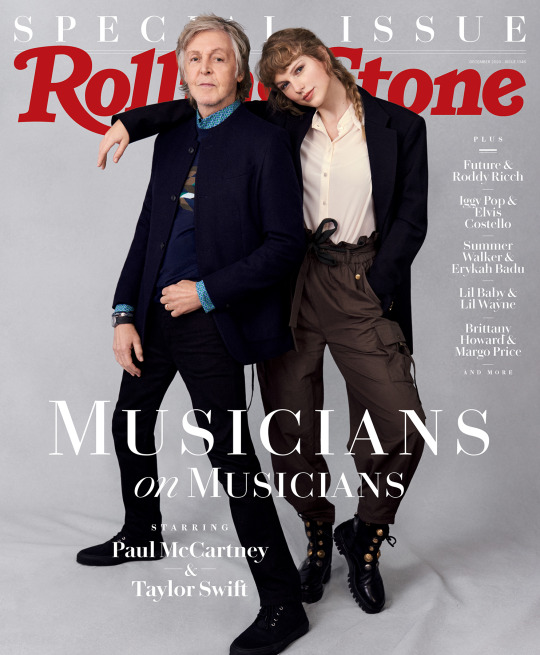
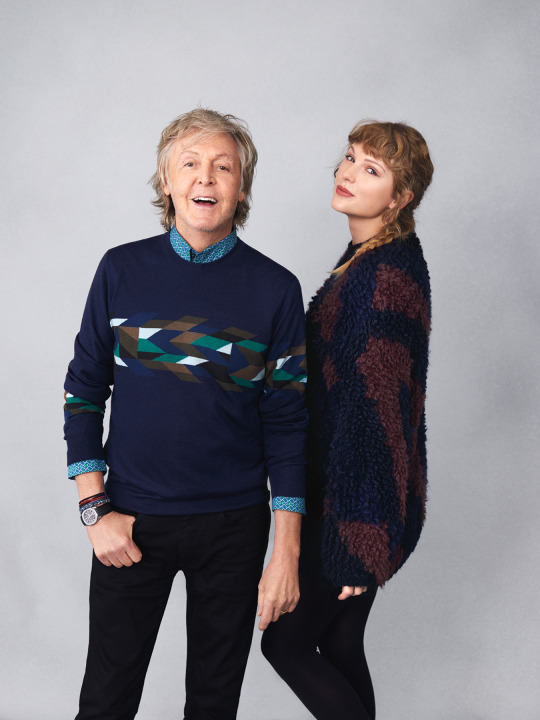
MUSICIANS ON MUSICIANS: Paul McCartney & Taylor Swift
© Mary McCartney
❝ During the shoot, Paul dances and takes almost none of it too seriously and sings along to Motown songs playing from the speakers. A few times Mary scolds, ‘Daaad, try to stand still!’ And it feels like a window into a pretty awesome family dynamic. ❞
interview below the cut:
Taylor Swift arrived early to Paul McCartney’s London office in October, “mask on, brimming with excitement.” “I mostly work from home these days,” she writes about that day, “and today feels like a rare school field trip that you actually want to go on.”
Swift showed up without a team, doing her own hair and makeup. In addition to being two of the most famous pop songwriters in the world, Swift and McCartney have spent the past year on similar journeys. McCartney, isolated at home in the U.K., recorded McCartney III. Like his first solo album, in 1970, he played nearly all of the instruments himself, resulting in some of his most wildly ambitious songs in a long time. Swift also took some new chances, writing over email with the National’s Aaron Dessner and recording the raw Folklore, which abandons arena pop entirely in favor of rich character songs. It’s the bestselling album of 2020.
Swift listened to McCartney III as she prepared for today’s conversation; McCartney delved into Folkore. Before the photo shoot, Swift caught up with his daughters Mary (who would be photographing them) and Stella (who designed Swift’s clothes; the two are close friends). “I’ve met Paul a few times, mostly onstage at parties, but we’ll get to that later,” Swift writes. “Soon he walks in with his wife, Nancy. They’re a sunny and playful pair, and I immediately feel like this will be a good day. During the shoot, Paul dances and takes almost none of it too seriously and sings along to Motown songs playing from the speakers. A few times Mary scolds, ‘Daaad, try to stand still!’ And it feels like a window into a pretty awesome family dynamic. We walk into his office for a chat, and after I make a nervous request, Paul is kind enough to handwrite my favorite lyric of his and sign it. He makes a joke about me selling it, and I laugh because it’s something I know I’ll cherish for the rest of my life. That’s around the time when we start talking about music.”
Taylor Swift: I think it’s important to note that if this year had gone the way that we thought it was going to go, you and I would have played Glastonbury this year, and instead, you and I both made albums in isolation.
Paul McCartney: Yeah!
Swift: And I remember thinking it would have been so much fun because the times that I’ve run into you, I correlate with being some of the most fun nights of my life. I was at a party with you, when everybody just started playing music. And it was Dave Grohl playing, and you…
McCartney: You were playing one of his songs, weren’t you?
Swift: Yes, I was playing his song called “Best of You,” but I was playing it on piano, and he didn’t recognize it until about halfway through. I just remember thinking, “Are you the catalyst for the most fun times ever?” Is it your willingness to get up and play music that makes everyone feel like this is a thing that can happen tonight?
McCartney: I mean, I think it’s a bit of everything, isn’t it? I’ll tell you who was very … Reese Witherspoon was like, “Are you going to sing?” I said “Oh, I don’t know.” She said, “You’ve got to, yeah!” She’s bossing me around. So I said, “Whoa,” so it’s a bit of that.
Swift: I love that person, because the party does not turn musical without that person.
McCartney: Yeah, that’s true.
Swift: If nobody says, “Can you guys play music?” we’re not going to invite ourselves up onstage at whatever living-room party it is.
McCartney: I seem to remember Woody Harrelson got on the piano, and he starts playing “Let It Be,” and I’m thinking, “I can do that better.” So I said, “Come on, move over, Woody.” So we’re both playing it. It was really nice.… I love people like Dan Aykroyd, who’s just full of energy and he loves his music so much, but he’s not necessarily a musician, but he just wanders around the room, just saying, “You got to get up, got to get up, do some stuff.”
Swift: I listened to your new record. And I loved a lot of things about it, but it really did feel like kind of a flex to write, produce, and play every instrument on every track. To me, that’s like flexing a muscle and saying, “I can do all this on my own if I have to.”
McCartney: Well, I don’t think like that, I must admit. I just picked up some of these instruments over the years. We had a piano at home that my dad played, so I picked around on that. I wrote the melody to “When I’m 64” when I was, you know, a teenager.
Swift: Wow.
McCartney: When the Beatles went to Hamburg, there were always drum kits knocking around, so when there was a quiet moment, I’d say, “Do you mind if I have a knock around?” So I was able to practice, you know, without practicing. That’s why I play right-handed. Guitar was just the first instrument I got. Guitar turned to bass; it also turned into ukulele, mandolin. Suddenly, it’s like, “Wow,” but it’s really only two or three instruments.
Swift: Well, I think that’s downplaying it a little bit. In my mind, it came with a visual of you being in the country, kind of absorbing the sort of do-it-yourself [quality] that has had to come with the quarantine and this pandemic. I found that I’ve adapted a do-it-yourself mentality to a lot of things in my career that I used to outsource. I’m just wondering what a day of recording in the pandemic looked like for you.
McCartney: Well, I’m very lucky because I have a studio that’s, like, 20 minutes away from where I live. We were in lockdown on a farm, a sheep farm with my daughter Mary and her four kids and her husband. So I had four of my grandkids, I had Mary, who’s a great cook, so I would just drive myself to the studio. And there were two other guys that could come in and we’d be very careful and distanced and everything: my engineer Steve, and then my equipment guy Keith. So the three of us made the record, and I just started off. I had to do a little bit of film music — I had to do an instrumental for a film thing — so I did that. And I just kept going, and that turned into the opening track on the album. I would just come in, say, “Oh, yeah, what are we gonna do?” [Then] have some sort of idea, and start doing it. Normally, I’d start with the instrument I wrote it on, either piano or guitar, and then probably add some drums and then a bit of bass till it started to sound like a record, and then just gradually layer it all up. It was fun.
Swift: That’s so cool.
McCartney: What about yours? You’re playing guitar and piano on yours.
Swift: Yeah, on some of it, but a lot of it was made with Aaron Dessner, who’s in a band called the National that I really love. And I had met him at a concert a year before, and I had a conversation with him, asking him how he writes. It’s my favorite thing to ask people who I’m a fan of. And he had an interesting answer. He said, “All the band members live in different parts of the world. So I make tracks. And I send them to our lead singer, Matt, and he writes the top line.” I just remember thinking, “That is really efficient.” And I kind of stored it in my brain as a future idea for a project. You know, how you have these ideas… “Maybe one day I’ll do this.” I always had in my head: “Maybe one day I’ll work with Aaron Dessner.”
So when lockdown happened, I was in L.A., and we kind of got stuck there. It’s not a terrible place to be stuck. We were there for four months maybe, and during that time, I sent an email to Aaron Dessner and I said, “Do you think you would want to work during this time? Because my brain is all scrambled, and I need to make something, even if we’re just kind of making songs that we don’t know what will happen…”
McCartney: Yeah, that was the thing. You could do stuff — you didn’t really worry it was going to turn into anything.
Swift: Yeah, and it turned out he had been writing instrumental tracks to keep from absolutely going crazy during the pandemic as well, so he sends me this file of probably 30 instrumentals, and the first one I opened ended up being a song called “Cardigan,” and it really happened rapid-fire like that. He’d send me a track; he’d make new tracks, add to the folder; I would write the entire top line for a song, and he wouldn’t know what the song would be about, what it was going to be called, where I was going to put the chorus. I had originally thought, “Maybe I’ll make an album in the next year, and put it out in January or something,” but it ended up being done and we put it out in July. And I just thought there are no rules anymore, because I used to put all these parameters on myself, like, “How will this song sound in a stadium? How will this song sound on radio?” If you take away all the parameters, what do you make? And I guess the answer is Folklore.
McCartney: And it’s more music for yourself than music that’s got to go do a job. My thing was similar to that: After having done this little bit of film music, I had a lot of stuff that I had been working on, but I’d said, “I’m just going home now,” and it’d be left half-finished. So I just started saying, “Well, what about that? I never finished that.” So we’d pull it out, and we said, “Oh, well, this could be good.” And because it didn’t have to amount to anything, I would say, “Ah, I really want to do tape loops. I don’t care if they fit on this song, I just want to do some.” So I go and make some tape loops, and put them in the song, just really trying to do stuff that I fancy.
I had no idea it would end up as an album; I may have been a bit less indulgent, but if a track was eight minutes long, to tell you the truth, what I thought was, “I’ll be taking it home tonight, Mary will be cooking, the grandkids will all be there running around, and someone, maybe Simon, Mary’s husband, is going to say, ‘What did you do today?’ And I’m going to go, ‘Oh,’ and then get my phone and play it for them.” So this became the ritual.
Swift: That’s the coziest thing I’ve ever heard.
McCartney: Well, it’s like eight minutes long, and I said, “I hate it when I’m playing someone something and it finishes after three minutes.” I kind of like that it just [continues] on.
Swift: You want to stay in the zone.
McCartney: It just keeps going on. I would just come home, “Well, what did you do today?” “Oh, well, I did this. I’m halfway through this,” or, “We finished this.”
Swift: I was wondering about the numerology element to McCartney III. McCartney I, II, and III have all come out on years with zeroes.
McCartney: Ends of decades.
Swift: Was that important?
McCartney: Yeah, well, this was being done in 2020, and I didn’t really think about it. I think everyone expected great things of 2020. “It’s gonna be great! Look at that number! 2020! Auspicious!” Then suddenly Covid hit, and it was like, “That’s gonna be auspicious all right, but maybe for the wrong reasons.” Someone said to me, “Well, you put out McCartney right after the Beatles broke up, and that was 1970, and then you did McCartney II in 1980.” And I said, “Oh, I’m going to release this in 2020 just for whatever you call it, the numerology.…”
Swift: The numerology, the kind of look, the symbolism. I love numbers. Numbers kind of rule my whole world. The numbers 13 … 89 is a big one. I have a few others that I find…
McCartney: Thirteen is lucky for some.
Swift: Yeah, it’s lucky for me. It’s my birthday. It’s all these weird coincidences of good things that have happened. Now, when I see it places, I look at it as a sign that things are going the way they’re supposed to. They may not be good now, they could be painful now, but things are on a track. I don’t know, I love the numerology.
McCartney: It’s spooky, Taylor. It’s very spooky. Now wait a minute: Where’d you get 89?
Swift: That’s when I was born, in 1989, and so I see it in different places and I just think it’s…
McCartney: No, it’s good. I like that, where certain things you attach yourself to, and you get a good feeling off them. I think that’s great.
Swift: Yeah, one of my favorite artists, Bon Iver, he has this thing with the number 22. But I was also wondering: You have always kind of seeked out a band or a communal atmosphere with like, you know, the Beatles and Wings, and then Egypt Station. I thought it was interesting when I realized you had made a record with no one else. I just wondered, did that feel natural?
McCartney: It’s one of the things I’ve done. Like with McCartney, because the Beatles had broken up, there was no alternative but to get a drum kit at home, get a guitar, get an amp, get a bass, and just make something for myself. So on that album, which I didn’t really expect to do very well, I don’t think it did. But people sort of say, “I like that. It was a very casual album.” It didn’t really have to mean anything. So I’ve done that, the play-everything-myself thing. And then I discovered synths and stuff, and sequencers, so I had a few of those at home. I just thought I’m going to play around with this and record it, so that became McCartney II. But it’s a thing I do. Certain people can do it. Stevie Wonder can do it. Stevie Winwood, I believe, has done it. So there are certain people quite like that.
When you’re working with someone else, you have to worry about their variances. Whereas your own variance, you kind of know it. It’s just something I’ve grown to like. Once you can do it, it becomes a little bit addictive. I actually made some records under the name the Fireman.
Swift: Love a pseudonym.
McCartney: Yeah, for the fun! But, you know, let’s face it, you crave fame and attention when you’re young. And I just remembered the other day, I was the guy in the Beatles that would write to journalists and say [speaks in a formal voice]: “We are a semiprofessional rock combo, and I’d think you’d like [us].… We’ve written over 100 songs (which was a lie), my friend John and I. If you mention us in your newspaper…” You know, I was always, like, craving the attention.
Swift: The hustle! That’s so great, though.
McCartney: Well, yeah, you need that.
Swift: Yeah, I think, when a pseudonym comes in is when you still have a love for making the work and you don’t want the work to become overshadowed by this thing that’s been built around you, based on what people know about you. And that’s when it’s really fun to create fake names and write under them.
McCartney: Do you ever do that?
Swift: Oh, yeah.
McCartney: Oh, yeah? Oh, well, we didn’t know that! Is that a widely known fact?
Swift: I think it is now, but it wasn’t. I wrote under the name Nils Sjöberg because those are two of the most popular names of Swedish males. I wrote this song called “This Is What You Came For” that Rihanna ended up singing. And nobody knew for a while. I remembered always hearing that when Prince wrote “Manic Monday,” they didn’t reveal it for a couple of months.
McCartney: Yeah, it also proves you can do something without the fame tag. I did something for Peter and Gordon; my girlfriend’s brother and his mate were in a band called Peter and Gordon. And I used to write under the name Bernard Webb.
Swift: [Laughs.] That’s a good one! I love it.
McCartney: As Americans call it, Ber-nard Webb. I did the Fireman thing. I worked with a producer, a guy called Youth, who’s this real cool dude. We got along great. He did a mix for me early on, and we got friendly. I would just go into the studio, and he would say, “Hey, what about this groove?” and he’d just made me have a little groove going. He’d say, “You ought to put some bass on it. Put some drums on it.” I’d just spend the whole day putting stuff on it. And we’d make these tracks, and nobody knew who Fireman was for a while. We must have sold all of 15 copies.
Swift: Thrilling, absolutely thrilling.
McCartney: And we didn’t mind, you know?
Swift: I think it’s so cool that you do projects that are just for you. Because I went with my family to see you in concert in 2010 or 2011, and the thing I took away from the show most was that it was the most selfless set list I had ever seen. It was completely geared toward what it would thrill us to hear. It had new stuff, but it had every hit we wanted to hear, every song we’d ever cried to, every song people had gotten married to, or been brokenhearted to. And I just remembered thinking, “I’ve got to remember that,” that you do that set list for your fans.
McCartney: You do that, do you?
Swift: I do now. I think that learning that lesson from you taught me at a really important stage in my career that if people want to hear “Love Story” and “Shake It Off,” and I’ve played them 300 million times, play them the 300-millionth-and-first time. I think there are times to be selfish in your career, and times to be selfless, and sometimes they line up.
McCartney: I always remembered going to concerts as a kid, completely before the Beatles, and I really hoped they would play the ones I loved. And if they didn’t, it was kind of disappointing. I had no money, and the family wasn’t wealthy. So this would be a big deal for me, to save up for months to afford the concert ticket.
Swift: Yeah, it feels like a bond. It feels like that person on the stage has given something, and it makes you as a crowd want to give even more back, in terms of applause, in terms of dedication. And I just remembered feeling that bond in the crowd, and thinking, “He’s up there playing these Beatles songs, my dad is crying, my mom is trying to figure out how to work her phone because her hands are shaking so much.” Because seeing the excitement course through not only me, but my family and the entire crowd in Nashville, it just was really special. I love learning lessons and not having to learn them the hard way. Like learning nice lessons I really value.
McCartney: Well, that’s great, and I’m glad that set you on that path. I understand people who don’t want to do that, and if you do, they’ll say, “Oh, it’s a jukebox show.” I hear what they’re saying. But I think it’s a bit of a cheat, because the people who come to our shows have spent a lot of money. We can afford to go to a couple of shows and it doesn’t make much difference. But a lot of ordinary working folks … it’s a big event in their life, and so I try and deliver. I also, like you say, try and put in a few weirdos.
Swift: That’s the best. I want to hear current things, too, to update me on where the artist is. I was wondering about lyrics, and where you were lyrically when you were making this record. Because when I was making Folklore, I went lyrically in a total direction of escapism and romanticism. And I wrote songs imagining I was, like, a pioneer woman in a forbidden love affair [laughs]. I was completely …
McCartney: Was this “I want to give you a child”? Is that one of the lines?
Swift: Oh, that’s a song called “Peace.”
McCartney: “Peace,” I like that one.
Swift: “Peace” is actually more rooted in my personal life. I know you have done a really excellent job of this in your personal life: carving out a human life within a public life, and how scary that can be when you do fall in love and you meet someone, especially if you’ve met someone who has a very grounded, normal way of living. I, oftentimes, in my anxieties, can control how I am as a person and how normal I act and rationalize things, but I cannot control if there are 20 photographers outside in the bushes and what they do and if they follow our car and if they interrupt our lives. I can’t control if there’s going to be a fake weird headline about us in the news tomorrow.
McCartney: So how does that go? Does your partner sympathize with that and understand?
Swift: Oh, absolutely.
McCartney: They have to, don’t they?
Swift: But I think that in knowing him and being in the relationship I am in now, I have definitely made decisions that have made my life feel more like a real life and less like just a storyline to be commented on in tabloids. Whether that’s deciding where to live, who to hang out with, when to not take a picture — the idea of privacy feels so strange to try to explain, but it’s really just trying to find bits of normalcy. That’s what that song “Peace” is talking about. Like, would it be enough if I could never fully achieve the normalcy that we both crave? Stella always tells me that she had as normal a childhood as she could ever hope for under the circumstances.
McCartney: Yeah, it was very important to us to try and keep their feet on the ground amongst the craziness.
Swift: She went to a regular school .…
McCartney: Yeah, she did.
Swift: And you would go trick-or-treating with them, wearing masks.
McCartney: All of them did, yeah. It was important, but it worked pretty well, because when they kind of reached adulthood, they would meet other kids who might have gone to private schools, who were a little less grounded.
And they could be the budding mothers to [kids]. I remember Mary had a friend, Orlando. Not Bloom. She used to really counsel him. And it’s ’cause she’d gone through that. Obviously, they got made fun of, my kids. They’d come in the classroom and somebody would sing, “Na na na na,” you know, one of the songs. And they’d have to handle that. They’d have to front it out.
Swift: Did that give you a lot of anxiety when you had kids, when you felt like all this pressure that’s been put on me is spilling over onto them, that they didn’t sign up for it? Was that hard for you?
McCartney: Yeah, a little bit, but it wasn’t like it is now. You know, we were just living a kind of semi-hippie life, where we withdrew from a lot of stuff. The kids would be doing all the ordinary things, and their school friends would be coming up to the house and having parties, and it was just great. I remember one lovely evening when it was Stella’s birthday, and she brought a bunch of school kids up. And, you know, they’d all ignore me. It happens very quickly. At first they’re like, “Oh, yeah, he’s like a famous guy,” and then it’s like [yawns]. I like that. I go in the other room and suddenly I hear this music going on. And one of the kids, his name was Luke, and he’s doing break dancing.
Swift: Ohhh!
McCartney: He was a really good break dancer, so all the kids are hanging out. That allowed them to be kind of normal with those kids. The other thing is, I don’t live fancy. I really don’t. Sometimes it’s a little bit of an embarrassment, if I’ve got someone coming to visit me, or who I know…
Swift: Cares about that stuff?
McCartney: Who’s got a nice big house, you know. Quincy Jones came to see me and I’m, like, making him a veggie burger or something. I’m doing some cooking. This was after I’d lost Linda, in between there. But the point I’m making is that I’m very consciously thinking, “Oh, God, Quincy’s got to be thinking, ‘What is this guy on? He hasn’t got big things going on. It’s not a fancy house at all. And we’re eating in the kitchen! He’s not even got the dining room going,’” you know?
Swift: I think that sounds like a perfect day.
McCartney: But that’s me. I’m awkward like that. That’s my kind of thing. Maybe I should have, like, a big stately home. Maybe I should get a staff. But I think I couldn’t do that. I’d be so embarrassed. I’d want to walk around dressed as I want to walk around, or naked, if I wanted to.
Swift: That can’t happen in Downton Abbey.
McCartney: [Laughs.] Exactly.
Swift: I remember what I wanted to know about, which is lyrics. Like, when you’re in this kind of strange, unparalleled time, and you’re making this record, are lyrics first? Or is it when you get a little melodic idea?
McCartney: It was a bit of both. As it kind of always is with me. There’s no fixed way. People used to ask me and John, “Well, who does the words, who does the music?” I used to say, “We both do both.” We used to say we don’t have a formula, and we don’t want one. Because the minute we get a formula, we should rip it up. I will sometimes, as I did with a couple of songs on this album, sit down at the piano and just start noodling around, and I’ll get a little idea and start to fill that out. So the lyrics — for me, it’s following a trail. I’ll start [sings “Find My Way,” a song from “McCartney III”]: “I can find my way. I know my left from right, da da da.” And I’ll just sort of fill it in. Like, we know this song, and I’m trying to remember the lyrics. Sometimes I’ll just be inspired by something. I had a little book which was all about the constellations and the stars and the orbits of Venus and.…
Swift: Oh, I know that song — “The Kiss of Venus”?
McCartney: Yeah, “The Kiss of Venus.” And I just thought, “That’s a nice phrase.” So I was actually just taking phrases out of the book, harmonic sounds. And the book is talking about the maths of the universe, and how when things orbit around each other, and if you trace all the patterns, it becomes like a lotus flower.
Swift: Wow.
McCartney: It’s very magical.
Swift: That is magical. I definitely relate to needing to find magical things in this very not-magical time, needing to read more books and learn to sew, and watch movies that take place hundreds of years ago. In a time where, if you look at the news, you just want to have a panic attack — I really relate to the idea that you are thinking about stars and constellations.
McCartney: Did you do that on Folklore?
Swift: Yes. I was reading so much more than I ever did, and watching so many more films.
McCartney: What stuff were you reading?
Swift: I was reading, you know, books like Rebecca, by Daphne du Maurier, which I highly recommend, and books that dealt with times past, a world that doesn’t exist anymore. I was also using words I always wanted to use — kind of bigger, flowerier, prettier words, like “epiphany,” in songs. I always thought, “Well, that’ll never track on pop radio,” but when I was making this record, I thought, “What tracks? Nothing makes sense anymore. If there’s chaos everywhere, why don’t I just use the damn word I want to use in the song?”
McCartney: Exactly. So you’d see the word in a book and think, “I love that word”?
Swift: Yeah, I have favorite words, like “elegies” and “epiphany” and “divorcée,” and just words that I think sound beautiful, and I have lists and lists of them.
McCartney: How about “marzipan”?
Swift: Love “marzipan.”
McCartney: The other day, I was remembering when we wrote “Lucy in the Sky With Diamonds”: “kaleidoscope.”
Swift: “Kaleidoscope” is one of mine! I have a song on 1989, a song called “Welcome to New York,” that I put the word “kaleidoscope” in just because I’m obsessed with the word.
McCartney: I think a love of words is a great thing, particularly if you’re going to try to write a lyric, and for me, it’s like, “What is this going to say to that person?” I often feel like I’m writing to someone who is not doing so well. So I’m trying to write songs that might help. Not in a goody-goody, crusading kind of way, but just thinking there have been so many times in my life when I’ve heard a song and felt so much better. I think that’s the angle I want, that inspirational thing.
I remember once, a friend of mine from Liverpool, we were teenagers and we were going to a fairground. He was a schoolmate, and we had these jackets that had a little fleck in the material, which was the cool thing at the time.
Swift: We should have done matching jackets for this photo shoot.
McCartney: Find me a fleck, I’m in. But we went to the fair, and I just remember — this is what happens with songs — there was this girl at the fair. This is just a little Liverpool fair — it was in a place called Sefton Park — and there was this girl, who was so beautiful. She wasn’t a star. She was so beautiful. Everyone was following her, and it’s like, “Wow.” It’s like a magical scene, you know? But all this gave me a headache, so I ended up going back to his house — I didn’t normally get headaches. And we thought, “What can we do?” So we put on the Elvis song “All Shook Up.” By the end of that song, my headache had gone. I thought, you know, “That’s powerful.”
Swift: That really is powerful.
McCartney: I love that, when people stop me in the street and say, “Oh, I was going through an illness and I listened to a lot of your stuff, and I’m better now and it got me through,” or kids will say, “It got me through exams.” You know, they’re studying, they’re going crazy, but they put your music on. I’m sure it happens with a lot of your fans. It inspires them, you know?
Swift: Yeah, I definitely think about that as a goal. There’s so much stress everywhere you turn that I kind of wanted to make an album that felt sort of like a hug, or like your favorite sweater that makes you feel like you want to put it on.
McCartney: What, a “cardigan”?
Swift: Like a good cardigan, a good, worn-in cardigan. Or something that makes you reminisce on your childhood. I think sadness can be cozy. It can obviously be traumatic and stressful, too, but I kind of was trying to lean into sadness that feels like somehow enveloping in not such a scary way — like nostalgia and whimsy incorporated into a feeling like you’re not all right. Because I don’t think anybody was really feeling like they were in their prime this year. Isolation can mean escaping into your imagination in a way that’s kind of nice.
McCartney: I think a lot of people have found that. I would say to people, “I feel a bit guilty about saying I’m actually enjoying this quarantine thing,” and people go, “Yeah, I know, don’t say it to anyone.” A lot of people are really suffering.
Swift: Because there’s a lot in life that’s arbitrary. Completely and totally arbitrary. And [the quarantine] is really shining a light on that, and also a lot of things we have that we outsource that you can actually do yourself.
McCartney: I love that. This is why I said I live simply. That’s, like, at the core of it. With so many things, something goes wrong and you go, “Oh, I’ll get somebody to fix that.” And then it’s like, “No, let me have a look at it.…”
Swift: Get a hammer and a nail.
McCartney: “Maybe I can put that picture up.” It’s not rocket science. The period after the Beatles, when we went to live in Scotland on a really — talk about dumpy — little farm. I mean, I see pictures of it now and I’m not ashamed, but I’m almost ashamed. Because it’s like, “God, nobody’s cleaned up around here.”
But it was really a relief. Because when I was with the Beatles, we’d formed Apple Records, and if I wanted a Christmas tree, someone would just buy it. And I thought, after a while, “No, you know what? I really would like to go and buy our Christmas tree. Because that’s what everyone does.” So you go down — “I’ll have that one” — and you carried it back. I mean, it’s little, but it’s huge at the same time.
I needed a table in Scotland and I was looking through a catalog and I thought, “I could make one. I did woodwork in school, so I know what a dovetail joint is.” So I just figured it out. I’m just sitting in the kitchen, and I’m whittling away at this wood and I made this little joint. There was no nail technology — it was glue. And I was scared to put it together. I said, “It’s not going to fit,” but one day, I got my woodwork glue and thought, “There’s no going back.” But it turned out to be a real nice little table I was very proud of. It was that sense of achievement.
The weird thing was, Stella went up to Scotland recently and I said, “Isn’t it there?” and she said, “No.” Anyway, I searched for it. Nobody remembered it. Somebody said, “Well, there’s a pile of wood in the corner of one of the barns, maybe that’s it. Maybe they used it for firewood.” I said, “No, it’s not firewood.” Anyway, we found it, and do you know how joyous that was for me? I was like, “You found my table?!” Somebody might say that’s a bit boring.
Swift: No, it’s cool!
McCartney: But it was a real sort of great thing for me to be able to do stuff for yourself. You were talking about sewing. I mean normally, in your position, you’ve got any amount of tailors.
Swift: Well, there’s been a bit of a baby boom recently; several of my friends have gotten pregnant.
McCartney: Oh, yeah, you’re at the age.
Swift: And I was just thinking, “I really want to spend time with my hands, making something for their children.” So I made this really cool flying-squirrel stuffed animal that I sent to one of my friends. I sent a teddy bear to another one, and I started making these little silk baby blankets with embroidery. It’s gotten pretty fancy. And I’ve been painting a lot.
McCartney: What do you paint? Watercolors?
Swift: Acrylic or oil. Whenever I do watercolor, all I paint is flowers. When I have oil, I really like to do landscapes. I always kind of return to painting a lonely little cottage on a hill.
McCartney: It’s a bit of a romantic dream. I agree with you, though, I think you’ve got to have dreams, particularly this year. You’ve got to have something to escape to. When you say “escapism,” it sounds like a dirty word, but this year, it definitely wasn’t. And in the books you’re reading, you’ve gone into that world. That’s, I think, a great thing. Then you come back out. I normally will read a lot before I go to bed. So I’ll come back out, then I’ll go to sleep, so I think it really is nice to have those dreams that can be fantasies or stuff you want to achieve.
Swift: You’re creating characters. This was the first album where I ever created characters, or wrote about the life of a real-life person. There’s a song called “The Last Great American Dynasty” that’s about this real-life heiress who lived just an absolutely chaotic, hectic…
McCartney: She’s a fantasy character?
Swift: She’s a real person. Who lived in the house that I live in.
McCartney: She’s a real person? I listened to that and I thought, “Who is this?”
Swift: Her name was Rebekah Harkness. And she lived in the house that I ended up buying in Rhode Island. That’s how I learned about her. But she was a woman who was very, very talked about, and everything she did was scandalous. I found a connection in that. But I also was thinking about how you write “Eleanor Rigby” and go into that whole story about what all these people in this town are doing and how their lives intersect, and I hadn’t really done that in a very long time with my music. It had always been so microscope personal.
McCartney: Yeah, ’cause you were writing breakup songs like they were going out of style.
Swift: I was, before my luck changed [laughs]. I still write breakup songs. I love a good breakup song. Because somewhere in the world, I always have a friend going through a breakup, and that will make me write one.
McCartney: Yeah, this goes back to this thing of me and John: When you’ve got a formula, break it. I don’t have a formula. It’s the mood I’m in. So I love the idea of writing a character. And, you know, trying to think, “What am I basing this on?” So “Eleanor Rigby” was based on old ladies I knew as a kid. For some reason or other, I got great relationships with a couple of local old ladies. I was thinking the other day, I don’t know how I met them, it wasn’t like they were family. I’d just run into them, and I’d do their shopping for them.
Swift: That’s amazing.
McCartney: It just felt good to me. I would sit and talk, and they’d have amazing stories. That’s what I liked. They would have stories from the wartime — because I was born actually in the war — and so these old ladies, they were participating in the war. This one lady I used to sort of just hang out with, she had a crystal radio that I found very magical. In the war, a lot of people made their own radios — you’d make them out of crystals [sings “The Twilight Zone” theme].
Swift: How did I not know this? That sounds like something I would have tried to learn about.
McCartney: It’s interesting, because there is a lot of parallels with the virus and lockdowns and wartime. It happened to everyone. Like, this isn’t HIV, or SARS, or Avian flu, which happened to others, generally. This has happened to everyone, all around the world. That’s the defining thing about this particular virus. And, you know, my parents … it happened to everyone in Britain, including the queen and Churchill. War happened. So they were all part of this thing, and they all had to figure out a way through it. So you figured out Folklore. I figured out McCartney III.
Swift: And a lot of people have been baking sourdough bread. Whatever gets you through!
McCartney: Some people used to make radios. And they’d take a crystal — we should look it up, but it actually is a crystal. I thought, “Oh, no, they just called it a crystal radio,” but it’s actually crystals like we know and love.
Swift: Wow.
McCartney: And somehow they get the radio waves — this crystal attracts them — they tune it in, and that’s how they used to get their news. Back to “Eleanor Rigby,” so I would think of her and think of what she’s doing and then just try to get lyrical, just try to bring poetry into it, words you love, just try to get images like “picks up the rice in the church where a wedding has been,” and Father McKenzie “is darning his socks in the night.” You know, he’s a religious man, so I could’ve said, you know, “preparing his Bible,” which would have been more obvious. But “darning his socks” kind of says more about him. So you get into this lovely fantasy. And that’s the magic of songs, you know. It’s a black hole, and then you start doing this process, and then there’s this beautiful little flower that you’ve just made. So it is very like embroidery, making something.
Swift: Making a table.
McCartney: Making a table.
Swift: Wow, it would’ve been so fun to play Glastonbury for the 50th anniversary together.
McCartney: It would’ve been great, wouldn’t it? And I was going to be asking you to play with me.
Swift: Were you going to invite me? I was hoping that you would. I was going to ask you.
McCartney: I would’ve done “Shake It Off.”
Swift: Oh, my God, that would have been amazing.
McCartney: I know it, it’s in C!
Swift: One thing I just find so cool about you is that you really do seem to have the joy of it, still, just no matter what. You seem to have the purest sense of joy of playing an instrument and making music, and that’s just the best, I think.
McCartney: Well, we’re just so lucky, aren’t we?
Swift: We’re really lucky.
McCartney: I don’t know if it ever happens to you, but with me, it’s like, “Oh, my god, I’ve ended up as a musician.”
Swift: Yeah, I can’t believe it’s my job.
McCartney: I must tell you a story I told Mary the other day, which is just one of my favorite little sort of Beatles stories. We were in a terrible, big blizzard, going from London to Liverpool, which we always did. We’d be working in London and then drive back in the van, just the four of us with our roadie, who would be driving. And this was a blizzard. You couldn’t see the road. At one point, it slid off and it went down an embankment. So it was “Ahhh,” a bunch of yelling. We ended up at the bottom. It didn’t flip, luckily, but so there we are, and then it’s like, “Oh, how are we going to get back up? We’re in a van. It’s snowing, and there’s no way.” We’re all standing around in a little circle, and thinking, “What are we going to do?” And one of us said, “Well, something will happen.” And I thought that was just the greatest. I love that, that’s a philosophy.
Swift: “Something will happen.”
McCartney: And it did. We sort of went up the bank, we thumbed a lift, we got the lorry driver to take us, and Mal, our roadie, sorted the van and everything. So that was kind of our career. And I suppose that’s like how I ended up being a musician and a songwriter: “Something will happen.”
Swift: That’s the best.
McCartney: It’s so stupid it’s brilliant. It’s great if you’re ever in that sort of panic attack: “Oh, my God,” or, “Ahhh, what am I going to do?”
Swift: “Something will happen.”
McCartney: All right then, thanks for doing this, and this was, you know, a lot of fun.
Swift: You’re the best. This was so awesome. Those were some quality stories!
#paul mccartney#old paul#taylor swift#*m#💖#grandpaul#silver stubble#(aahh king)#(I LOVE HIM SO MUCH F*CK OFF EVERYONE)#(the thumbs lads. its always about the thumbs)
592 notes
·
View notes
Note
Hello! I’m wondering what your take is on Dear Friend (and especially “I’m in love with a friend of mine”?) I find the song a little confusing, and I’ve read a lot of different interpretations. I really love your films and I know you’ve done a lot of research, would love to know what you think. Thanks!
Thanks for your appreciation, anon! I love Dear Friend and am happy to share my thoughts on this haunting, mournful, mysterious song!
I’ll be the first to admit the lyrics are confusing (like so many McCartney songs!), mostly by virtue of the fact that Paul uses “friend” twice in a row. Are there two friends, or only one? By using the word “friend” on top of each other as he does, it suggests either a single friend (the titular “Dear Friend”) in two situations OR two friends, in separate/competing situations.
Dear Friend, throw the wine
I’m in love with a friend of mine
Really, truly, young and newlywed
Of course, everyone is entitled to their own opinion, interpretation, fantasy, etc. and no one but McCartney himself can definitively declare precisely what he meant with this song. But it’s my opinion that Paul was saying the latter; that he is in love with his friend and new wife, Linda. This is my conclusion after having deeply researched this period extensively for TWO documentary series (McCartney (2020) and Understanding Lennon/McCartney), an opinion that obviously no one is required to entertain and anyone is free to discard. But for those who are interested, I’ll share my reasoning below.
Firstly, this is NOT an attempt to disprove that Paul was ever in love with John or vice verse. They both used this term publicly and therefore probably/possibly did privately with each other as well. But Paul’s statements in April, 1970 pretty clearly spell out the situation:
“Personally, I don’t think John could do the Beatles thing now. I don’t think it would be good for him.
John’s in love with Yoko, and he’s no longer in love with the other three of us. And let’s face it, we were in love with the Beatles as much as anyone.”
So John and Paul were “in love” (with each other as people, or the Beatles as a concept, or Lennon/McCartney as a team, etc) for a long time. But by 1970, they both have new spouses and new lives and are following different paths. Here’s a brief recap of the events that led to this statement:
In a now-famous meeting in September 1969, John told Paul that he was leaving the Beatles and wanted a divorce. Whether this was an idle threat designed to scare/hurt Paul, or a real desire on John’s part is open to interpretation, but Paul, for his part, took it seriously.
Allen Klein asked John not to go public with his decision to leave the group and John happily and uncharacteristically agreed to sit on this “news” indefinitely. Paul subsequently disappeared for 6-8 weeks, mourned the loss of the band privately in Scotland, and then began working on his first solo album. Communication between John and Paul fell apart at that point, and John began a campaign of maneuvers - possibly engineered or facilitated by Klein - to bring Paul back into the Beatles’ fold and force him to submit to Klein’s management and John’s leadership. Backed into a proverbial corner by John, George, Ringo, Yoko and Klein, Paul played the last card he had: he quit.
In April 1970, Paul made the split official (deliberately or accidentally? YMMV) with the release of his first solo LP, and attempted to finalize the divorce with an uncooperative John for the remainder of the year. As is pretty well-documented, Paul tried for a quick and amicable split, requesting a release from the Beatles’ contract. But after John was unresponsive and Allen Klein advised him to set duplicitous legal traps that would prevent Paul from separating from the Beatles, Paul (as advised by his lawyers) decided to sue for divorce by the end of 1970.
By 2020, even the most casual Beatles fans know two basic truisms: 1) that Paul loved John always and 2) that Paul didn’t want the band to break up. Of course there’s more to the story than just that. We have also been told repeatedly that John “left Paul,” but this is not the whole truth either.
Essentially what John did was yell “I’m breaking up with you!” and then block the door every time Paul tried to leave.
As late as September, 1971 John is still saying publicly that he hopes Paul will return.
Int.: Let's talk a bit about Paul's aversion to Klein. From what we've read it seemed as if this wasn't there in the beginning, even though Paul wanted the Eastmans to run things. But it came on later as things progressed. And yet despite this, we gather that Klein was still hoping that Paul would return to the group.
John: Oh, he'd love it if Paul would come back. I think he was hoping he would for years and years. He thought that if he did something, to show Paul that he could do it, Paul would come around. But no chance. I mean, I want him to come out of it, too, you know. He will one day. I give him five years, I've said that. In five years he'll wake up.
[Narrator voice: Paul did not came back.]
Yes, Paul loved John. No, Paul didn’t want the Beatles to break up.
But when John said he wanted out, Paul took him seriously, respected his decision, never made a single attempt to woo John back and showed up 6 months later with a moving van and divorce papers.
When you hear Dear Friend out of context -knowing only that Paul loved John and was sad after the breakup- it’s not wholly unreasonable to think maybe Paul was declaring his eternal love for John here:
I’m in love with a friend of mine really, truly, young and newlywed
But when you experience Dear Friend in the proper context, that interpretation sounds less and less likely. Here’s Paul:
April 21, 1970
“I’m not blaming her. I’m blaming me. You can’t blame John for falling in love with Yoko any more than you can blame me for falling in love with Linda.
We tried writing together a few more times, but I think we both decided it would be easier to work separately. I told John on the phone the other day that at the beginning of last year I was annoyed with him. I was jealous because of Yoko, and afraid about the break-up of a great musical partnership. It’s taken me a year to realise that they were in love. Just like Linda and me."
Summer 1970
Paul writes John a 12-page letter requesting that they “let each other out of the trap.” John’s response was a picture of himself and Yoko with a balloon drawn above his head saying “How and Why?”
Paul responded: “How? By singing a paper that says we hereby dissolve our partnership. Why? Because there is no partnership.”
April 16, 1971
PAUL: “We used to get asked at press conferences, 'What are you going to do when the bubble bursts?' When I talked to John just the other day, he said something about, 'Well, the bubble's going to burst.' And I said, 'It has burst. That's the point. That's why I've had to do this, why l had to apply to the court. You don't think I really enjoy doing that kind of stuff. I had to do it because the bubble has burst-- everywhere but on paper.' That's the only place we're tied now.”
Nov 11, 1971
MM: But John said to me that what you’d done in bringing the [court] trials up and everything was what they all wanted, that you’d just done it a lot earlier than they would have done.
PAUL: Well if that’s true, well… well, come on! That’s – see, I’ve told you… The joke is, though, that we don’t have to do trials. It’s not necessary. If the four Beatles signed a bit of paper, or even ripped the old contract up and said, “This contract is no longer valid, we all hereby said it, we all legally direct the shareholders…” the whole thing, to wind it all up, we could do it. And if that’s really what he wants, he could do it this minute. [snaps fingers]
Furthermore, Paul was deeply in love with Linda during this period, as reflected by: the songs on both McCartney and RAM, the testimony of those around them at the time and by Paul’s own recollections. The first few years of Paul and Linda’s marriage was their honeymoon period, their era as newlyweds. It was certainly an awful time for Paul in many respects: the business battles of the Beatles were excruciating and extremely stressful and the loss of his three best friends was heartbreaking. Furthermore, the rock press had largely turned against him (sometimes viciously so), and John & Yoko (and Allen Klein) were painting him as a traitor to the counterculture and a villain for destroying the Beatles with his granny music, giant ego and overbearing personality. Paul and Linda were extremely isolated, partially by choice and partially by force.
But even though this was a terrible time for Paul in many respects, he was extremely happy with his new family. He later described this period with Linda as one of the happiest periods of their life. Paul has said numerous times Linda (along with nature and horse-riding) brought him out of depression after the Beatles ended and gave him the strength to push forward with his solo career, at a time when many were rooting against him (and a literal cult was forming that claimed he was DEAD and had been replaced by an inferior imposter- let that sink in for a moment!). He has been consistent about it over the years, and reiterated it as recently as 2020:
UNCUT: Tell me about the guy in the photo n the McCartney sleeve. He looks happy.
PAUL: I was really happy, yeah. The Beatles had become such a business machine, and with the arrival of Allen Klein the whole thing, every day was very unpleasant.
UNCUT: So there you were on the farm, finding solace in a new family...
PAUL: Yes. I had a little place in Scotland. So we just went out there. “It’s so remote, no one can be bothered trekking all the way up here for a meeting.” It was a good period. We grabbed our freedom- you know what, we seized the day! Also, I had a new baby; I’d not been a father before, so I was very happy.
In December of 1970, John gave his infamous Lennon Remembers interview to Rolling Stone. According to the liner notes of the Wildlife reissue from 2018 (and confirmed by the timing of the demo), Paul composed Dear Friend in reaction to John’s comments in that interview (not How Do You Sleep, as is commonly believed). But he sat on the song for awhile and didn’t record it until late 1971 (for inclusion on Wildlife). Judging from the tone of Too Many People and other songs on RAM, Paul’s initial sadness, confusion and disappointment gradually morphed into (or perhaps swung back and forth between) anger and defiance, accompanied by a taunting and/or gloating tone. Having gotten Dear Friend out of his system, it seems it simply didn’t fit thematically on RAM. Perhaps after the release of HDYS, Paul was deflated and despondent enough to return to Dear Friend? Perhaps Jealous Guy tempered or calmed Paul’s anger?
Or maybe it was just a genuine attempt to turn the heat down. We know that immediately following its release, John and Paul agreed (seemingly at Paul’s insistence) to quit bickering in public.
In any case, Dear Friend is a complex songs with a spectrum of emotions. Unlike Jealous Guy it is not apologetic; it’s mournful but also incredulous and slightly accusatory. Paul appears to be calling John’s bluff: Do you really believe all the bullshit you’re spewing?
Are you a fool, or is it true?
The John Lennon of Lennon Remembers is without hope or faith, denouncing everything he ever believed in and everyone he ever trusted -with the notable exceptions of Allen Klein, Phil Spector and Yoko. Paul clearly loves John and hopes to salvage their relationship, but Dear Friend was written at a time when John was being manipulated and exploited by people he later admitted were misplaced “daddy figures.” While Klein and Spector turned out to not be the most reliable friends to John, Paul certainly seems to know and understand John’s vulnerabilities and motivations better than most. As he sings in the demo:
Are you afraid? Or are you blue?
So why does Paul mention that he’s newlywed and in love with Linda? Firstly, because he is, and he wants to celebrate with his best friend. We know Paul’s desire was for the two couples to make peace and be friends. Pour the Wine. Clink glasses and celebrate their new marriages together.
PAUL: Dear Friend was to do with John, a bit of longing about John. Let’s have a glass of wine and forget about it. A making up song. (July 2001).
This is precisely what the two couples did in December of 1971, immediately following the release of Wildlife.
JOHN: We were both nervous, the four of us were nervous. I hadn’t seen him for a long time. I’d spoken on the phone [with him]. Uh, it was alright, you know. It was alright.
This is precisely what happened again throughout 1974 (with John & May Pang this time around), which John affectionately called their “Beaujolais evenings.”
Admittedly, It may seem odd for Paul to mention that he is happily married (and in love with another “friend”) in a make up song to John. Until you think about the romantic tension between John and Paul and Paul’s bold public recognition of it with this statement: “It’s taken me a year to realise that they were in love. Just like Linda and me.” Paul acknowledges here that John is in love with Yoko and wants John to acknowledge his love for Linda as well.
In Dear Friend he’s communicating that there is nothing to fear; they are secure in their respective marriages, there is no need to be hurt or angry or jealous anymore. We’re no longer partners, but we can still be friends. “Let’s have a glass of wine and forget about it.” A softer, gentler version of: Wake up, John. It’s over. Sign the fucking papers already.
So I think of Dear Friend as an olive branch, but not the groveling type some apparently do. And I most definitely do not think it was a signal to John that Paul was still in love with him, despite being newlywed to Linda.
I suppose it might seem a bit brutal for Paul to be singing about loving someone else in a song to John (although he’s done it before and I think John has done the same). But I honestly think it is something Paul believes John needs to hear and accept at this point; that he is “really, truly” in love with Linda and that he’s not about to divorce her or run after the first “blonde with big tits” as Allen Klein so charmingly suggested.
By September 1971, John still hasn’t seemed to accept Linda, or Paul’s relationship with her:
John: Paul always wanted the home life, you see. [... long, rambling story about being terrified when Paul got a job in 1961 and for a second looked as if he might abandon John and the group]
All the other girls were just groupies mainly. And with Linda not only did he have a ready-made family, but she knows what he wants, obviously, and has given it to him. The complete family life. He's in Scotland. He told me he doesn't like English cities anymore. So that's how it is.
Int.: So you think with Linda he's found what he wanted?
John: I guess so. I guess so. I just don't understand . . . I never knew what he wanted in a woman because I never knew what I wanted.
With comments like this John seems (IMO) to be twisting himself into knots trying to rationalize Paul’s choice of Linda, practically wondering aloud what could she give him that I couldn’t? He still seems unwilling to face or accept what Paul begrudgingly accepted and admitted years before: that his partner fell in love with someone else.
Here’s 76 year old Paul reminiscing about this tender, bittersweet time in his life, happy and in love with his wife and young family and simultaneously in deep pain over losing his dearly beloved best friend:
I remember when I heard the song recently, listening to the roughs in the car. And I thought, ‘Oh God’. That lyric: ‘Really truly, young and newly wed’. Listening to that was like, ‘Oh my God, it’s true!’ I’m trying to say to John, ‘Look, you know, it’s all cool. Have a glass of wine. Let’s be cool.’
“Let’s be cool.” Not “Please take me back,” not “Ignore my just-for-show marriage, I’m still in love with YOU.” To me, Paul is saying “I’m really, truly in love with my friend and new wife, can we please just be happy for each other? It’s all cool.” And for the record, I don’t find this sentiment any less loving on Paul’s part because I don’t think Paul being in love with his own wife (which he was), detracts from his love for John in any way. Again, I agree that the lyrics are slightly ambiguous, and perhaps this is meaningful too. It could be that the lack of hard boundary between the two friends (John and Linda) reflects how much Paul loves them both; they certainly aren’t positioned as opposites (i.e. I love her but I hate you). Instead they’re both part of the imagined celebration; Paul wants them all to share the wine together- and he wants them to tolerate (love) each other.
I think the traditional narrative doesn’t account for all of this because the traditional narrative does not acknowledge that John has any feelings for Paul in the first place. How in the world could Paul be asking John to “be cool” and accept the new situation when John didn’t even care about Paul in the first place and had been trying to get rid of him for years? This perception - of John gleefully blasting Paul with HDYS and Paul replying that he’s in love with John - has taken hold in many minds and has picked up a lot of steam in recent years with so-called “jean jackets” because they fundamentally believe that Paul’s love for John was one-sided. They cannot comprehend that Paul would ever tell John to “cool it” or back off in any way (even in 70-71) because they take the surface story at face value: John dumped Paul for Yoko and heartbroken Paul spent the rest of his life desperately trying to win John back. This is the narrative depicted in virtually every book I’ve read. My analysis is based on my own research, not this narrative.
I would invite readers of this post to watch (or re-watch) ULM (particularly volume 3 ) for a more comprehensive study of John and Paul’s relationship.
Lastly, after doing my own independent research for McCartney (2020), I found that the Paul McCartney described by the musicians and collaborators in Paul’s life was dramatically different from the person depicted in books like Man on the Run. My films are free from narration and commentary; I rely on first-hand interviews and information from the people involved, and in my opinion there is a great deal to be learned about Paul from the way he relates to others, especially through music. And although the McCartney series is about his solo career as opposed to his Beatle career, I would definitely recommend it to anyone who is interested in Lennon/McCartney for the insights they could gain.
Thank you very much for this ask- hopefully there aren’t too many typos!
176 notes
·
View notes
Photo
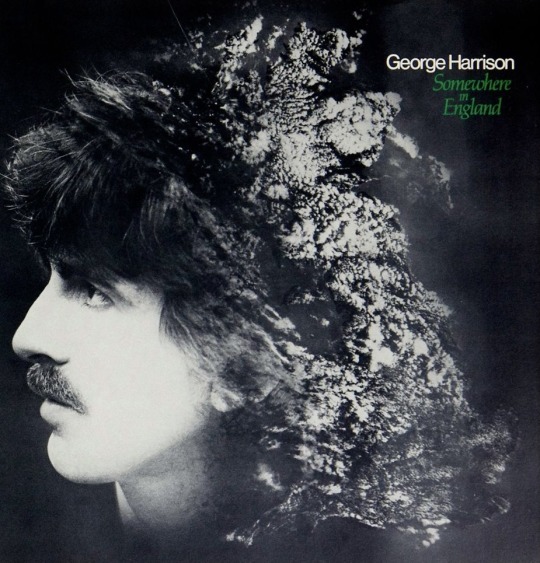
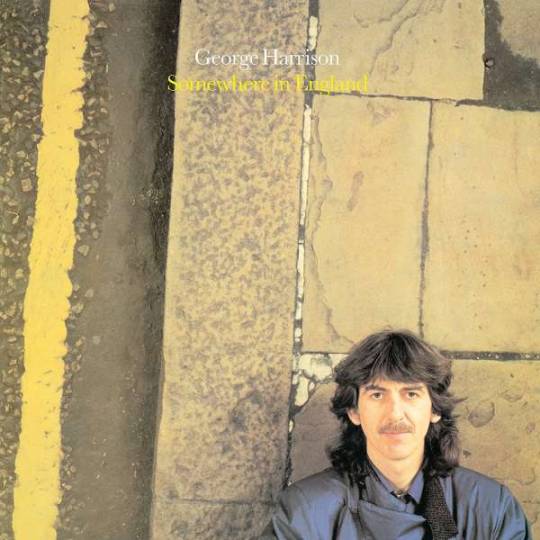
Somewhere In England was released on 1 June 1981. A look at the album cover...
The original proof cover (seen in the first image) is also the one featured on the cover of the 2004 Dark Horse Years remaster of the album.
Original cover concept by Basil Pao. George was persuaded to change the cover, with the concept for the new cover coming from Ray Cooper; photographed by Caroline Irwin, and featuring Mark Boyle’s Holland Park Avenue Study, 1967.
Q: “On Somewhere In England you were shown on the cover in front of a Mark Boyle painting. Do you collect art?”
George Harrison: “That painting was wonderful. He’d done a cast of the pavement and the gutter and a piece of the road. It’s quite an amazing process, like a sculpting of the street. I like certain artists, but by the time I got to like them they were to expensive to collect, like Dali and Magritte. Paul’s got a bunch of Magrittes. He bought them for, like 50 dollars each. Then the guy died in 1967 and now they’re worth millions.” - Musician, November 1987 (x)
An account from someone there on the day of the new cover shoot:
"Sometime in early 1981 I got a phone call from a friend who worked as a porter at the Tate Gallery on the south bank in London. “Come ’round the back door when we close tomorrow if you want to meet George Harrison” was all he said. It turned out that Beatle George had booked the gallery after hours for a photo shoot. That’s all I knew.
So, armed with a bag of LP sleeves and related items I turned up at the Tate just as they were closing. I later found out that the boss in charge of the backroom boys, porters and the like had asked if anyone wanted to work back a couple of hours to accommodate George and his party. Most of the long-serving old blokes didn’t want the overtime, but my mate and some of the younger guys jumped at the chance and probably would have done it for nothing.
When I arrived George was already there with his manager and a few others, including everyone’s favourite mad percussionist Ray Cooper (who, it transpired, came up with the whole idea for the shoot). The idea was to photograph George up against a 3D relief artwork by Mark Boyle titled 'Holland Park Avenue Study'. Dating from 1967 the piece was basically a 239cm square x 11.5cm thick representation of pavement and road made from (it says here) ‘Earth on Epikote and fibreglass’. The idea was for George to sit on the floor and lean against the artwork on the wall and, suitably cropped, it would seem like he was lying on the street itself. Caroline Irwin was the photographer.
While everything was being set up I spoke to George’s manager/PR man (I forget which) and asked about the chances of getting autographs. He assured me it would be OK and asked to see what I had brought. He gave the OK to everything except a copy of the 1976 Best Of George Harrison LP (the UK version with cover showing George sitting on the bumper of a hot rod car). 'If you give him that to sign, he’ll probably tear it up in front of you!' said the manager. It turns out that George hated that album, feeling insulted that EMI had filled only one side with his solo material and padded out the other with his Beatles hits.
As we waited I overheard George relating how he’d been pulled over for speeding in his black Porsche on the way into London that afternoon. 'So when the cop asked for my address, I said "which address do you want, my LA address, my New York address, or my Surrey address"?' he said in that oh-so familiar languid scouse drawl which could have come straight from a scene in 'A Hard Day’s Night'.
Finally the photo shoot was over and I produced my bag of assorted goodies for signing (minus the Best Of LP). I’d taken the Faster single picture disc insert, a copy of Wonderwall and the booklet from the Concert For Bangla Desh. It was this last item which caused the most excitement. George grabbed it and after flicking through, became quite animated and insisted on showing it around. He called Ray Cooper over saying stuff like, 'Look at Eric on this one' and generally behaving like he’d never seen it before.
The 'Holland Park Avenue Study' picture was used for the original version of George’s Somewhere In England album, but the cover was changed when the CD appeared years later, however.
I still have the Faster picture disc, but parted with the rest of the signed items years ago. Yeah, I wish I still had it all, but a guy’s gotta eat.
Footnote. As George was leaving he called my mate over, thanked him for looking after his party and keeping the gallery open late. Then as they shook hands he quietly pressed a fifty pound note into his palm. And that’s fifty 1981 pounds, folks. Whadda guy." - "Johnny Concheroo," The Afterword dot co dot uk, 16 January 2017 [x]
#George Harrison#quote#quotes by George#quotes about George#Somewhere In England#1981#1980s#fan recollections#fan recollections: 1980s#Ray Cooper#Basil Pao#Caroline Irwin#fits queue like a glove
10 notes
·
View notes
Text
Peach Pit Releases Heartfelt and Multifaceted Third Album 'From 2 to 3' [Q&A]
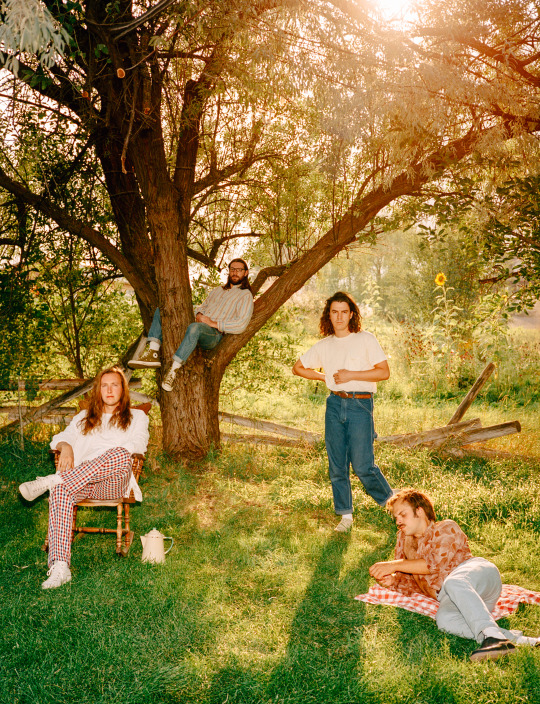
Photo: Mackenzie Walker
Canadian indie-rock quartet Peach Pit has finally released their highly anticipated third studio album, From 2 to 3, and it was well worth the wait. The bright and clean-sounding eleven-track project highlights Peach Pit's extensive musicality, with each band member playing multiple instruments on the record, including tambourine, cowbell, harmonica, lap steel, and more.
Written just months before the world shut down when it was easy to romanticize being shut-in, the band shared that being alone shaped the record's sound and reminded them that music by yourself is great, but it's better when you're with your friends. "We wrote the record on instruments we had in our living rooms, so it seemed fitting that we record it that way too," says lead vocalist and guitarist Neil Smith.
Ones To Watch had the chance to talk with Smith further about creating the album, his favorite music moments, and their upcoming 53-date North American and European tour this spring.
youtube
Ones to Watch: Can you tell me about the beginning of From 2 to 3’s creation?
Peach Pit: Well, I guess we started writing the album pretty soon after putting out our last one. We'd written a few songs near the end of 2019 and didn't think they'd be out anytime soon. Then the pandemic happened, so with no shows for the foreseeable future, it seemed like a good time to make a record!
Who or what inspires you creatively?
I mostly get inspiration from the people I'm around. Often, a song starts when I'm with my friends, and somebody says something I think sounds funny or interesting, maybe a phrase or a weird interaction that makes me laugh. I'll jot it down on my phone and revisit it later when I'm working on music. It also means I have a ton of random-ass notes clogging up my phone's storage since 99% of it I never actually look at again. As a group though, we get lots of inspiration from the music we're listening to at the time. Recently it's been a lot of oldies, George Harrison, Paul McCartney, Neil Young; that kind of stuff.
What is your songwriting process like right now? Is it a tried and true method, or is it an ever-evolving process?
It's stayed pretty much the same throughout our time as a band. Usually, I'll write a song on my guitar at home and try to get the verses and chorus to a place I'm happy with. As I'm working on the song, Chris is hounding me to send him recordings of what I have, but I usually hold out until I feel good about what I've written. I'm kind of nervous to show him, so he has to bug me. [laughs] Then, Chris writes his guitar parts, and we work on the song arrangement and style as a band. Peter is really good at that part; he's usually the one to unlock the best arrangement for the song. And then Mikey's drumming dictates a lot too. Since all the songs start out solo-acoustic, Mike's drums are often the deciding factor on how the songs end up.
How do you feel that this record differs from your previous work sound-wise and writing-wise, and what do you hope to experiment more with on upcoming music?
I'd say it mostly differs from a production standpoint. The album sounds a lot more like how we sound when we're playing live. There's not a lot of effects on the vocals and guitars, so it sounds like us playing in a room together. We set out to make a record like this because of all the oldies we were listening to at the time. We wanted that good clean tone, baby! As far as the future goes, we don't really have a vision for the next record yet, but we want to try and make records that don't all sound alike. Easier said than done though, especially when you keep making music with the same four people. [laughs]
What is your favorite song on the album? Why?
My favorite has switched a bunch since writing and recording it. But right now, I really like "Give Up Baby Go." The music video we shot for it made me excited about it again, and we'll be playing it on tour, so we've been rehearsing it every day, and it's a fun one to play.
What has been the most challenging part of making this album?
I thought it would be all of the Covid restrictions that were in place when we started working on it, but that wasn't the case. We ended up doing the album over Zoom with our producer, Robbie Lackritz, who was in Toronto at the time. When we started out, I was pretty anxious if it would be weird, him not being with us in Vancouver and all, but it worked out great! We would be on a Zoom call all day, us in Vancouver and him back home, and it couldn't have been easier. We've still never shaken the guy's hand, but we got to know each other very well and became good friends. It also helped that we had Dave Ogilvie and Liam Moes in the studio engineering the record. Those two guys are the best to work with; we have tons of laughs and watch lots of hockey. :)
Do you have any favorite music moments on the album?
Oh man, there are so many parts of the record that I love. I really think Mikey, Pete, and Chris have written some of their best stuff recently. My Top 3 would probably be: Mikey's lead guitar part on "Look Out," Peter's bassline in the chorus of "2015," and just all of Chris' guitar playing on "Give Up Baby Go." Those boys are shredders.
youtube
I love the music videos you made for this album, especially "Up Granville." What was your favorite music video to shoot?
I loved making "Look Out." It was one where Lester had a vision for how he wanted the video, and none of us had really given the concept too much thought or really bought into it yet. And then one day, we're up on this stretch of road in the countryside near Keremeos, BC, sitting in the back of that truck driving back and forth all afternoon trying to make it in one take. When we finally got the shot, it was awesome! Chris was the most excited because it meant he didn't have to keep chasing after us.
What was the most fun or most challenging part of shooting the music videos?
The most fun part was definitely the road trip we took last summer to shoot "Up Granville." There were eight of us driving around for a week in the middle of summer, just shooting all day, stopping at cool places in BC, and camping every night. It was funny because we were getting to enjoy an actual road trip while shooting a music video about four guys taking a road trip. [laughs]
I know you must be excited about your upcoming tour. Where are you most excited to perform?
I'm most excited for the couple of places we're playing two nights back to back. We're usually only in town for a day tops, so we don't get to explore that much of the cities. But on this tour, we get to spend like three days each in SF and LA, and that sounds pretty awesome. My sister is also flying down for the LA shows, and she's never seen us on the road before, so I'm excited to kick it with her :) I'm gonna try and get her to stage dive one night. I hope she doesn't chicken out!
What song do you think will be the most fun to play live?
I don't want to give anything away, but I'm really excited for how we're opening the show! We're starting out with some really fun songs, and I know after not having played live for so long, it's gonna feel good!
Peach Pit’s From 2 to 3 is available everywhere you can stream it.
4 notes
·
View notes
Text
Queen live at Royal Dublin Society Simmonscourt in Dublin, Ireland - November 22, 1979 (Part-1)

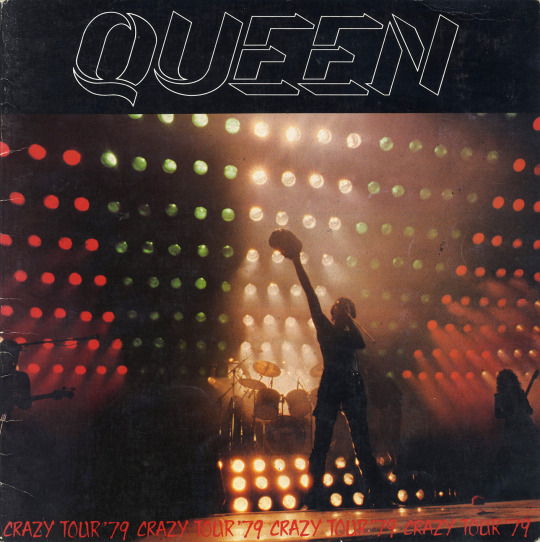
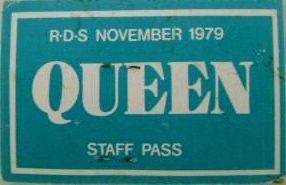
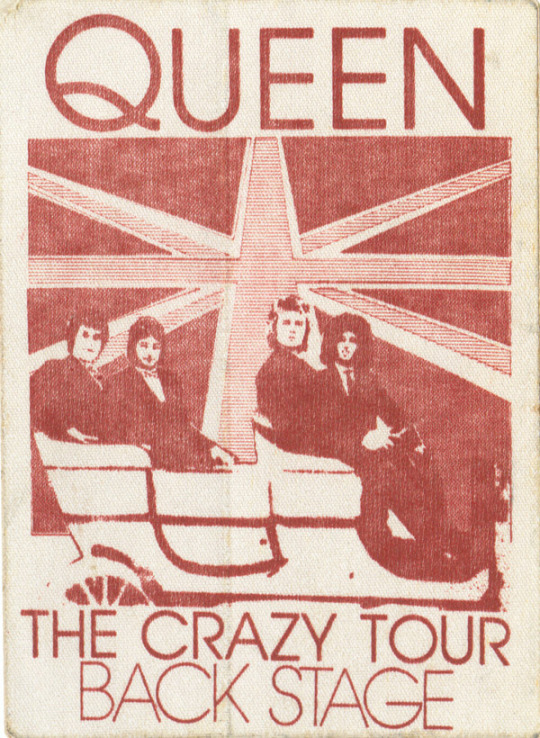
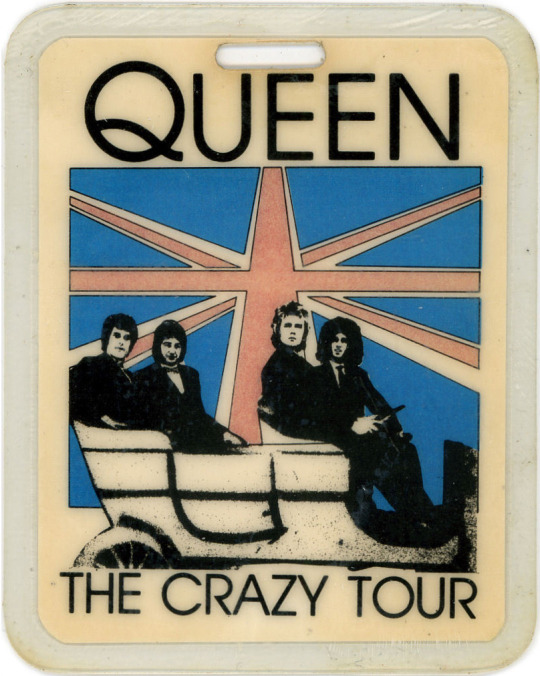
(x)
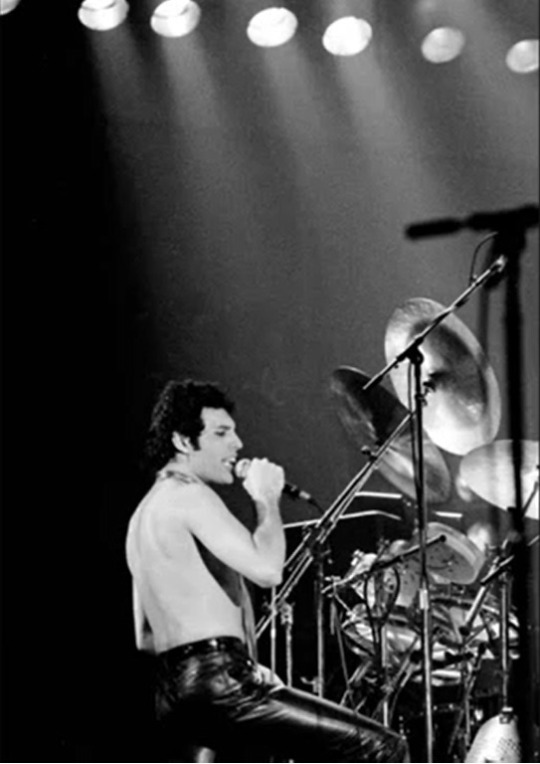
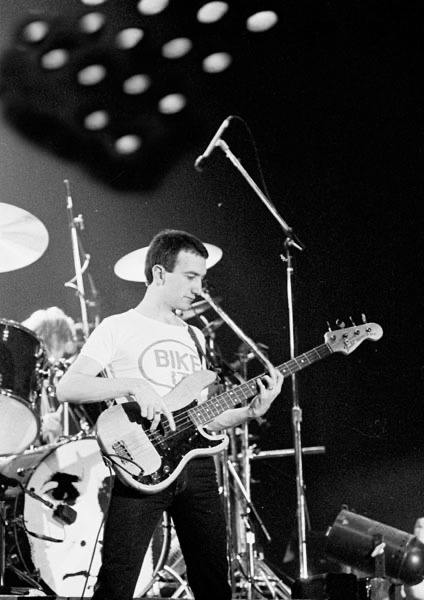
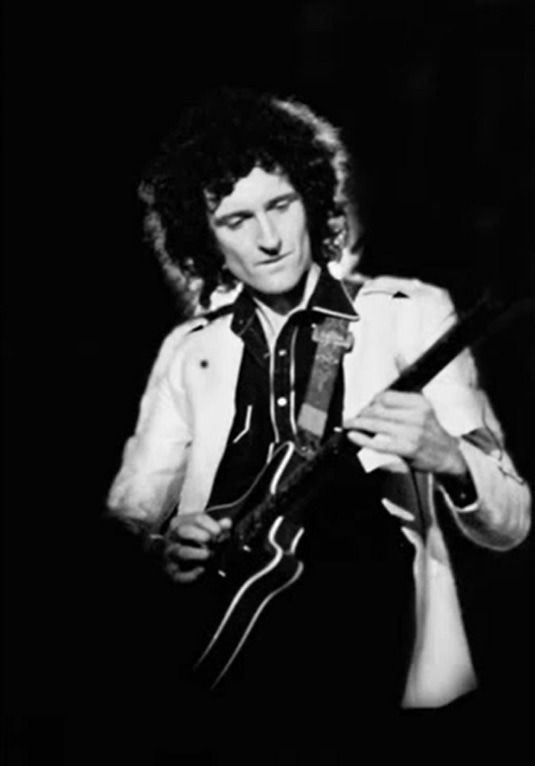
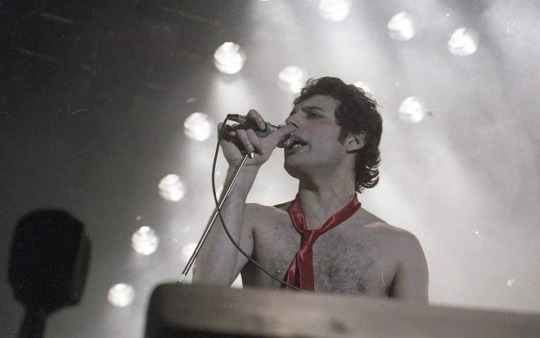
Tonight is the opening night of the "Crazy Tour," the tour when Queen decided to go back and play the smaller, more intimate venues (especially the London ones). The lighting rig had to be scaled down to accommodate most of the venues. There used to be five rows of red and green lights and four rows of white, but the red and green have been cut back to four as well. Along with the change in the band's attire (particularly Freddie's pants with knee-pads) and Roger's bass drum head sporting a picture of himself, all these factors make pictures from this tour easy to distinguish from those taken earlier in the year.
Queen's old front of house sound technician returned to the job after a long illness (the Jazz album is dedicated to him for this reason).
The show now begins with an intense drone leading into the thunder and lightning. Combined with their lighting rig (even the scaled down version), this would be a very effective opening of their show. It has been said that people were often left breathless before the band even played a note.
Being their first gig in the UK since releasing Live Killers, the band decide to shake things up a bit by opening the show with Let Me Entertain You, followed by the fast We Will Rock You. The setlist is otherwise mostly similar to the live album and previous tour, with a couple new songs added to the repertoire (Mustapha made its first appearance in Saarbrucken in the summer).
Tonight would see the first performances of Save Me and Crazy Little Thing Called Love, which had been recently recorded. The latter has been released as a single and would fare quite well on the charts, becoming their first American #1. Save Me would be released as a single early next year, peaking at #11 in the UK. On stage, Brian May plays the piano on the ballad. Through 1981, he'd play the first two verses on piano and switch to guitar at the second chorus. The instrumentation would change slightly in 1982 with the addition of an auxiliary keyboardist. In the meantime, these 1979 versions would have the band finishing the song at the end of the last chorus, omitting the piano outro.
As for Crazy Little Thing Called Love, Brian would start on acoustic guitar, switch to a black Telecaster for the guitar solo, and to his beloved Red Special for the finale of the song. Unlike the 1950s-flavoured studio version, it would become a heavy rock song by the final verse. By 1982, the end of the song would often be a relatively long jam. Freddie would play a 12-string Ovation Pacemaker acoustic guitar for the song through 1982, and would switch to a cream-coloured Telecaster from 1984 to 1986. Throughout the years, he would often joke about how he knew how to play only a few chords on the guitar.
On stage, the band end Crazy Little Thing Called Love with a coda similar to the one in You're My Best Friend.
This is Queen's first of four shows they would play in Ireland, and so they perform a one-off version of Danny Boy in the encore. As told by someone who attended the show, almost no one in the audience knew the words of the second verse, while Freddie had done his homework.
During Now I'm Here, a fan manages to make his way on stage for a brief moment, and Freddie sings, "Now He's Here." An audience recording of the song was reportedly broadcast on the radio not long after the show, but no known copy has survived.
At the end of the show, instead of playing their version of Britain's national anthem as always, in Ireland the band use the outro from the A Day At The Races album - the only location where they would make a political gesture like this.
Here is a review of this show from the Dublin Evening Press, submitted by Rob Schoorl.
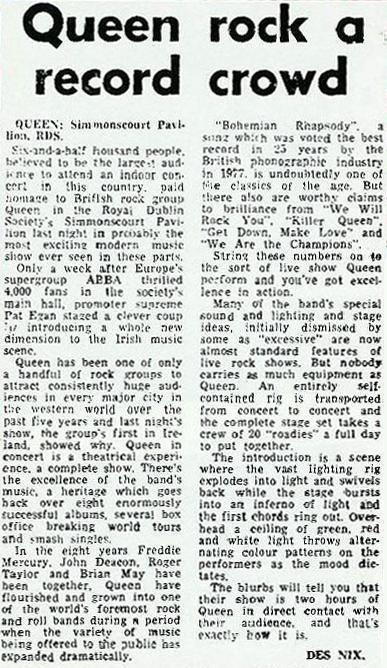
Photos 1-3 were taken by Eddie Mallin.
Fan Stories
“I couldn't believe it! Summer 1979 and I was reading a review of a gig in one of Dublin's evening newspapers. At the end of the review, added almost as an afterthought, was news that the promoter, Pat Egan, was planning to bring Queen to Dublin! I read and re-read it but still could not believe it. Queen, at last, would make their debut in front of an Irish audience! The Crazy Tour would begin in Dublin. Fast forward to the autumn and myself and a number of friends from school eagerly queued up to buy tickets to see our heroes. After buying the tickets, it was a long countdown to the show which would take place on Thursday November 22nd 1979. I still clearly remember the date even after all the years. Eventually the day arrived. That night Queen were on Top of the Pops with Crazy Little Thing Called Love but I didn't mind missing it. We were going to the real thing! After a long day in school we made our way to the RDS in Dublin. After a wait outside the gates we were allowed in to the venue and found a standing place near the front of the stage. I recall it got ever more crowded at the front of the stage and before the show, the tour manager (was it Gerry Stickells?) had to go on stage and appeal to people near the stage to relax and step back. Eventually the lights dimmed, there was a tremendous roar from the crowd, the Pizza Oven exploded into light and there were our heroes only yards away from us. I recall at the time being so overwhelmed by the amazing lights and the fact that we could almost touch Freddie, dressed all in black leather and sunglasses, that I barely registered that Let Me Entertain You was the opener. After that, it was into We Will Rock You and, largely the same songs and running order as the Live Killers album which I knew very well (!!) at that time and had almost worn out playing over the previous months. There were however some exceptions. Of most interest to Queen fans now and the biggest shock to me then was that Danny Boy was played live - a great version, from what I recall which received a terrific ovation from the audience. Also, If You Can't Beat Them was played which surprised me as it wasn't included on Live Killers and I wasn't even aware at that time that it was ever played live. The Dublin show was the first time that Save Me and Crazy Little Thing were played live. I remember being astounded at the power and range of Freddie's voice - even better than Live Killers. At that stage he was developing as a singer and over the next few years became recognised as one of the best rock singers and best frontmen in the business. (Am I the only one who was slightly disappointed with the quality and range of his voice during the final Magic Tour especially when compared to earlier tours?). The gig was a terrific show, especially to a young person attending his first major rock gig, and many of the songs are still memorable to me. During Now I'm Here one idiot actually got up on stage and Freddie sang "Now *he's* here" before he was removed from the stage. One girl also managed to get up on stage and plant a kiss on Freddie during the show. The following night, a couple of songs recorded during the show by someone in the audience were played on the Radio Dublin pirate radio station. These included Now I'm Here. A bootleg of the gig definitely exists *somewhere* but, try as I might, I cannot track it down. I would be grateful if anyone reading this comes across it or has it in their collection, that they get in touch with me!” - John Brogan
“The first night of the Crazy tour - amazing show. Seen some people on the web note that they played Danny Boy that night but for some reason I can only remember Brian playing it as part of his solo and us singing our heads off. Freddie handing out a champagne glass to a friend of mine who still has it. Anyway it was nearly 30 years ago and I find it hard to remember what I did last week never mind that long ago. They ended the show with the outro from A Day At The Races which took me a while to figure out what it actually was. The lighting rig was totally amazing - the pizza oven was aptly named - it was scorching and the intensity of the light when it turned around behind the band to face the audience was something else made a couple of friends that night (in the horse show bar opposite the venue) that I am still in contact with and we are all still crazy after all these years.” - Gary aka hoops
“A couple of notes on the Queen show in Dublin, 1979. Fred was in red trousers, not black as John Brogan has mentioned above. Small point but there you go. And when it came time for the audience to sing along to Danny Boy, almost no one knew the words of the second verse - I remember one chap shouting out to Freddie that he was doing a grand job all by himself. I saw them sixteen times in all and that show, the first, has a very special place in my memory. On the subject of bootlegs from that show, a chap in Aungier Street in Dublin used to have just about every show ever played in Dublin by anyone worth taping. I got a really bad and incomplete (C60) copy of the Queen show from him just as a record of having been there - his voice could be heard just before the start of the show, discussing bootlegging. The tape is somewhere in a box in my house and should I come across it, I'll let you know.” - Paul
Part-2
30 notes
·
View notes
Text
HOLLYWOOD BOND CAVALCADE
September 4, 1943
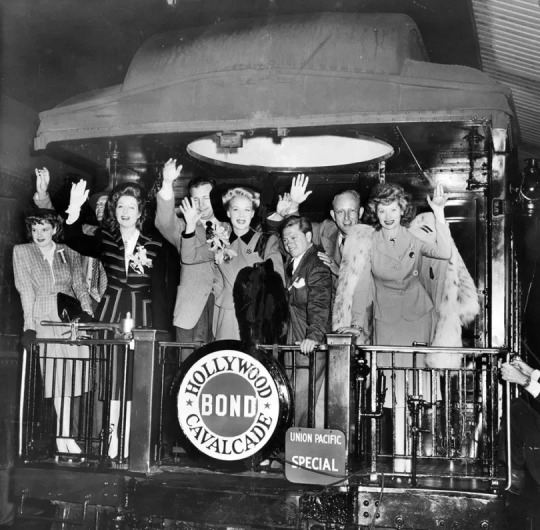
On September 4, 1943, the Hollywood Bond Cavalcade departed to raise money for America’s Third War Loan. It began in Washington DC and went through 16 American cities before ending in San Francisco 21 days later. Millions of Americans flocked to these events buying war bonds as their tickets, with seat prices ranging from $18.75 to $1 million. After crossing 10,091 miles, the campaign raised a total of $40,110,000 and pushed America’s War Loan over the $2 billion mark.
The Hollywood Victory Committee was an organization founded on December 10, 1941 during World War II to provide a means for stage, screen, television and radio performers that were not in military service to contribute to the war effort through bond drives and improving morale for troops. It was associated with the Screen Actors Guild. The Committee organized events between January 1942 until August 1945. Its first chairman was Clark Gable.

This was not the first such event. In 1942, Desi Arnaz participated in the Hollywood Victory Caravan. He was joined by stars Joan Bennett, Joan Blondell, Charles Boyer, James Cagney, Claudette Colbert, Jerry Colonna, Bing Crosby, Olivia de Havilland, Cary Grant, Charlotte Greenwood, Bob Hope, Frances Langford, Laurel and Hardy, Bert Lahr, Groucho Marx, Frank McHugh, Ray Middleton, Merle Oberon, Pat O'Brien, Eleanor Powell, and Risë Stevens. The Caravan show played in 12 cities and netted over $700,000 for Army and Navy relief funds. [Note that in the above Minneapolis welcome sign, Desi’s surname is mis-spelled!]
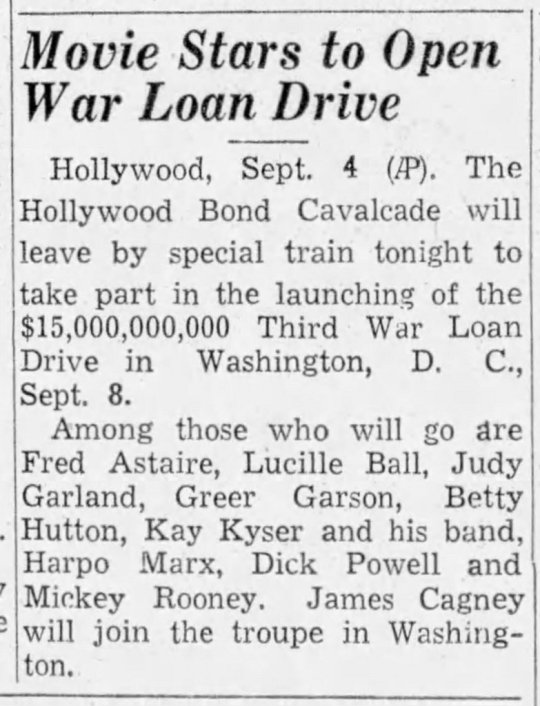
Along with Lucille Ball, some of the celebrities involved included:
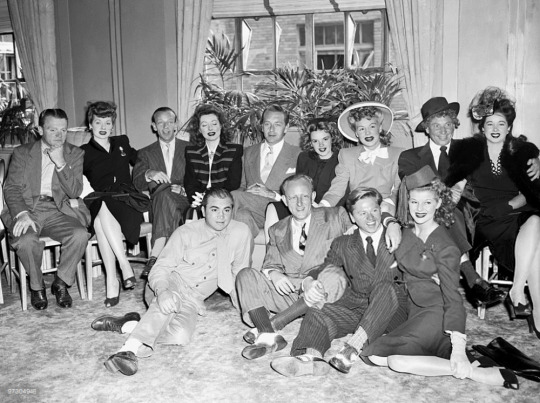
James Cagney ~ had just opened his film Johnny Come Lately on September 3, 1943.
Judy Garland ~ won a 1940 special Oscar for her contributions to film. In September 1943, she released Thousands Cheer (co-starring Lucille Ball) and two months later, Girl Crazy with Mickey Rooney.
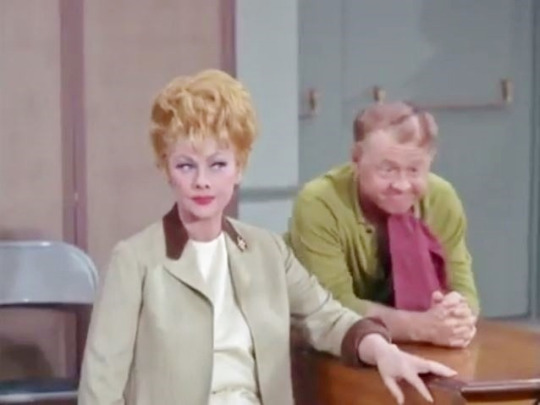
Mickey Rooney ~ was also in Thousands Cheer with Garland and Ball, as well as premiering Girl Crazy with Judy Garland in November 1943. Rooney won Oscars in 1939 and 1940. In 1966 he played himself on an episode of “The Lucy Show.”
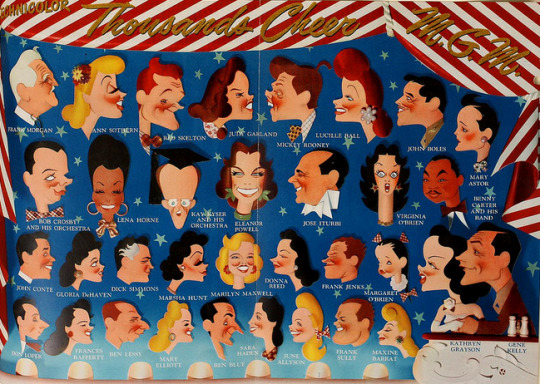
Kay Kyser ~ was a bandleader who made his film debut with Lucille Ball in That’s Right - You’re Wrong. He made four films in 1943, including Thousands Cheer.
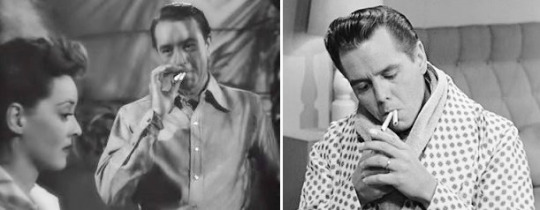
Paul Henreid ~ was most known for playing Victor Laszlo in Casablanca (1942). His name was mentioned on “I Love Lucy” in “The Adagio” (ILL S1;E12) when Ricky lights two cigarettes at once, just a Paul Henreid did for Bette Davis in 1942′s Now Voyager.
Greer Garson ~ won Oscars in 1940, 1942, and 1943, for Mrs. Miniver, her most recent success at the time. She had a film in release called The Youngest Profession and was about to debut another hit, Madame Curie.
Betty Hutton ~ was an actress and singer who was seen that summer of ‘43 in Let’s Face It, starring Bob Hope.
Kathryn Grayson ~ was yet another Cavalcade member starring in Thousands Cheer.

Harpo Marx ~ is best known for the act he developed with his brothers that was a hit on Broadway and screen. He was a silent clown in an over-sized raincoat and fright wig. Lucy and Harpo had appeared together in Room Service in 1938. In 1955, he guest-starred on “I Love Lucy” (S4;E28) as himself.
Fred Astaire ~ was one of Hollywood’s most legendary dancers. In July 1943 he released The Sky’s The Limit with Joan Leslie. In 1943, he had already done three musical films with Lucille Ball, and was about to film a fourth - Ziegfeld Follies. His name was mentioned on two episodes of “I Love Lucy.”
Olivia DeHavilland ~ was a two-time Oscar nominee at the time of the Cavalcade. She memorably played Melanie Wilkes in Gone With The Wind in 1939.
Martha Scott ~ was a 1940 Oscar nominee for the screen version of Our Town. Her film Hi Diddle Diddle was in release during the summer of 1943.
Dick Powell ~ was preparing to premiere Riding High with Dorothy Lamour in November 1943. He was about to start filming Meet the People with Lucille Ball, which opened in 1944.
The stars participated upon behest of the US Treasury Department.

A special 11-car Union Pacific Railroad train carried the stars from Los Angeles, to Washington DC for the kick-off.

Union Pacific Railroad provided access to their new Domeliner for location and second unit footage on “I Love Lucy” during “The Great Train Robbery” (S5;E5).
Tour Schedule:
Sept 4 - Depart Los Angeles
Sept 8 – Washington, DC
Sept 9 – Philadelphia
Sept 10 – Boston
Sept 11 – New York
Sept 12 – Pittsburgh
Sept 13 – Cleveland
Sept 14 – Detroit
Sept 15 – Cincinnati
Sept 16 – Chicago
Sept 17 – Minneapolis
Sept 18 – St Louis
Sept 20 – New Orleans
Sept 21 – Dallas
Sept 22 – San Antonio
Sept 25 – San Francisco
Sept 26 & 27 – Los Angeles
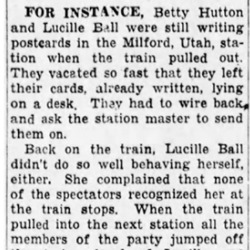
A Typical Cavalcade Performance (depending on celebrity availability)
Kay Kyser served as master of ceremonies and started the show with his band's theme "Thinking Of You". James Cagney came on to read a poem - "What Do We Do When We Buy A Bond" - and did two numbers and a dance from Yankee Doodle Dandy, for which he had recently won the Academy Award. Dick Powell then crooned some of his hits: "Don't Give Up The Ship," "Let's Get Lost," "In My Arms," and "Happy Go Lucky".
Harpo Marx would intermittently chase a blonde across the stage. He eventually settled down to play two harp solos, bang on the piano, wheeze on the harmonica, and finally played a pantomime poker game with Lucille Ball, who had appeared with Harpo in Room Service in 1938 and learned physical comedy at his knee. Harpo ended the game by cutting the cards with an ax!
After Fred Astaire danced, Kyser brought down the house with a burlesque imitation of his style. Mickey Rooney did imitations of Franklin Roosevelt, Eleanor Roosevelt, Herbert Hoover, Wendell Wilkie, and then played the drums.
Betty Hutton performed some hot boogie-woogie. Judy Garland sang "The Man I Love," "Embraceable You," and "Blow, Gabriel, Blow."
Greer Garson urged continued bond purchases, saying, "If we relax, if we don't back the attack, the war will go on indefinitely."

Upon arrival in Washington DC on September 8, Lucille Ball and the stars paraded through the streets in military jeeps, waving to the assembled crowds on their way to the Washington Monument. A similar parade was held in most all subsequent cities.
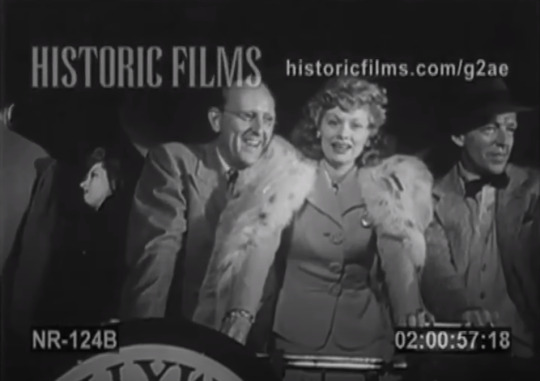
After departing DC, the stars embarked on a 15 city ‘barn-storming’ tour of American cities.
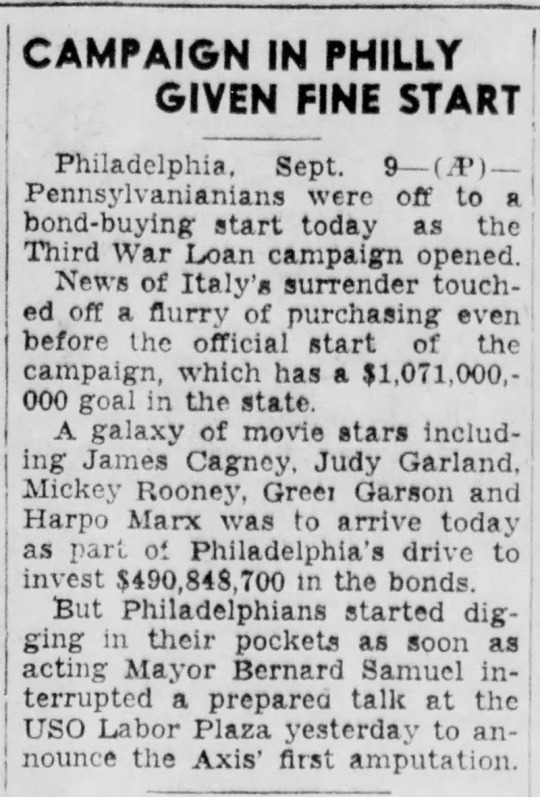
September 9 ~ the Cavalcade played Philadelphia's Convention Hall...
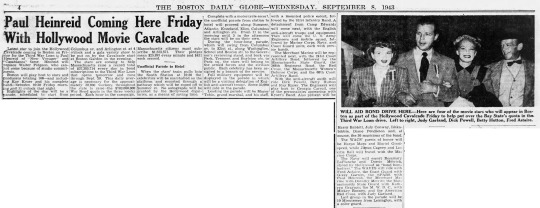
...and moved to play Boston on September 10.
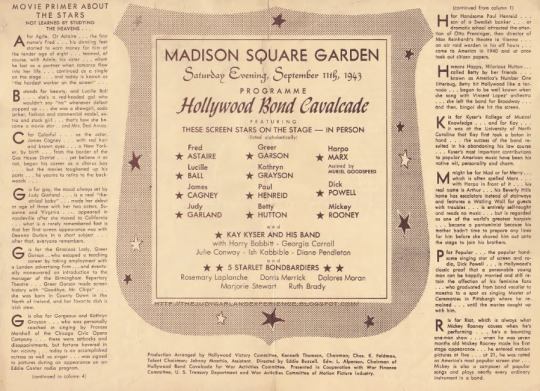
September 11 ~ at Madison Square Garden in New York City. It was here that Betty Hutton announced her engagement to camera manufacturer Ted Briskin. They tied the knot in 1945 but the marriage ended in divorce in 1951.
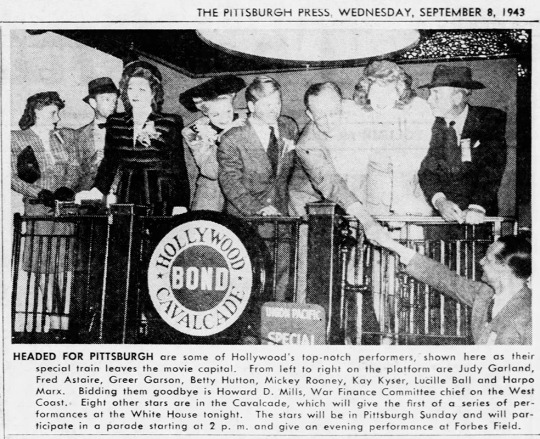
September 12 ~ Pittsburgh, Pennsylvania. The newspapers promoted its arrival with this photo from their Los Angeles departure.

September 13 ~ the Cavalcade rolled through Cleveland, Ohio the stars spoke to an assembly of Defense Workers. That night, at the Civic Auditorium, Kay Kyser auctioned off an American flag for $10,000,000 and two pounds of butter and a three pound steak for $100,000 each!
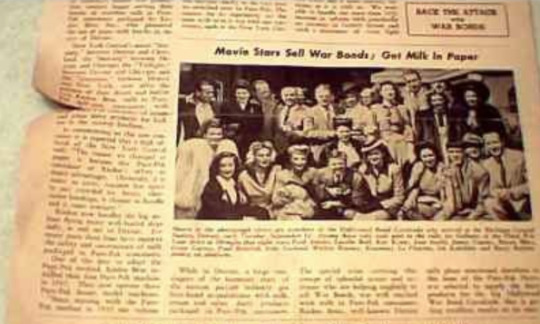
September 14 ~ Detroit, Michigan

September 15 ~ Cincinnati, Ohio. Stars rode into town on chartered Cincinnati Street Railway buses kicked off at Union Station. Lucille Ball is 8th from the right, next to Harpo Marx.
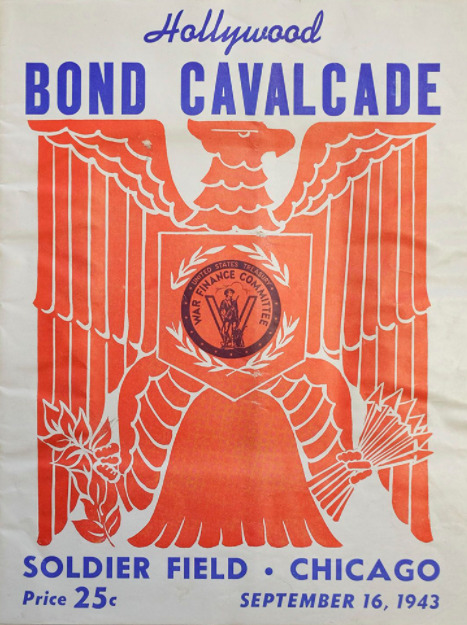
September 16 in Chicago’s Soldier Field.

September 17 in Minneapolis, Minnesota.
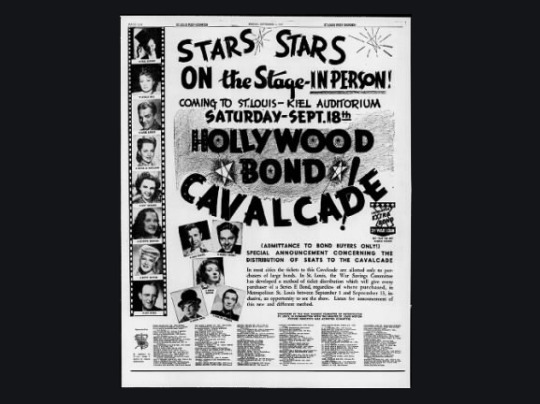
September 18 in St. Louis, Missouri at the Kiel Auditorium. Most of the stars lodged at the Hotel Jefferson, where police had to chase 300 autograph hounds out of the lobby. They also had to drag a high school girl out from beneath Fred Astaire's bed. In another incident, surging fans shattered a plate glass window, which tore Judy Garland's dress to shreds.
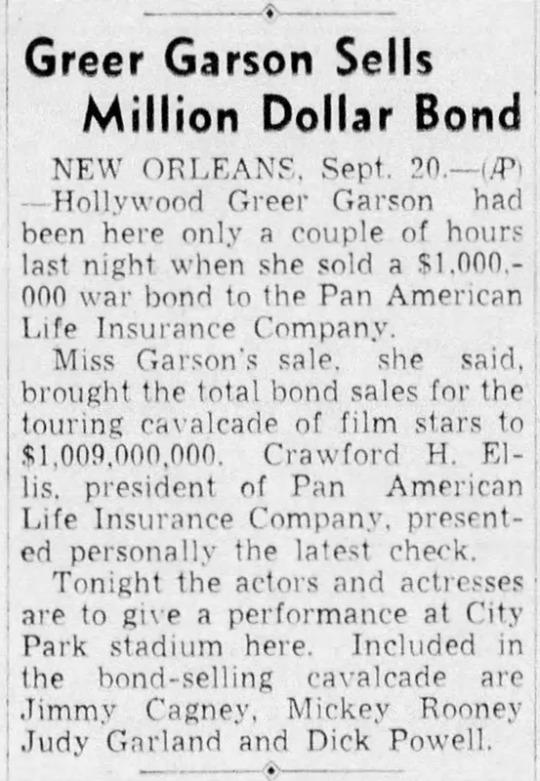
September 19 was left as an ‘open’ day in New Orleans, Louisiana, before their official performances on September 20 at the Tad Gormley Stadium. Variety reported the crowd at 50,000, The States stated it was between 65,000 and 75,000, while The Item claimed 100,000 showed up, despite the actual venue only seating 35,000!

September 21 in Dallas, Texas at the Cotton Bowl...
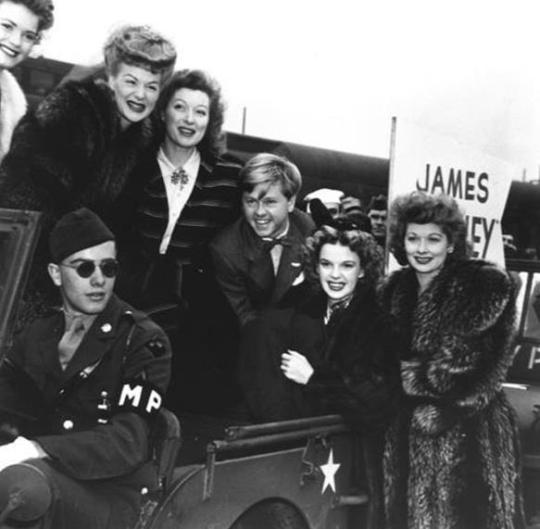
...and in San Antonio, Texas on September 22.
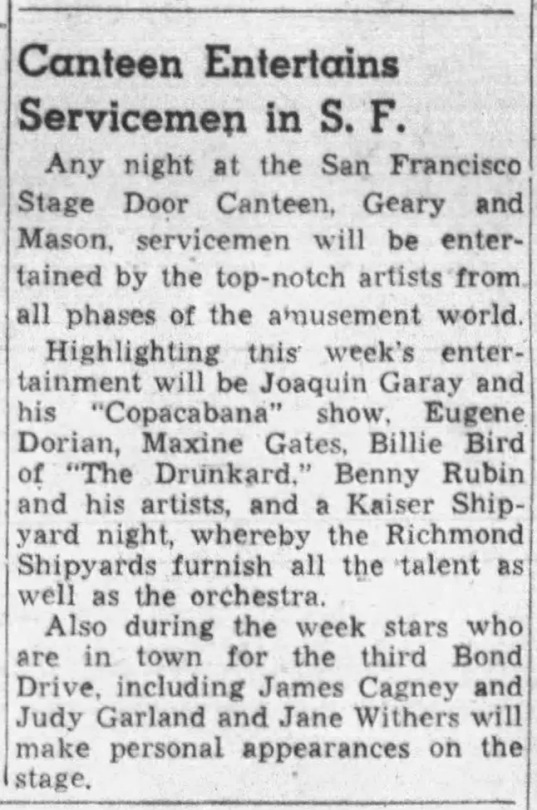
September 25 in San Francisco to perform...
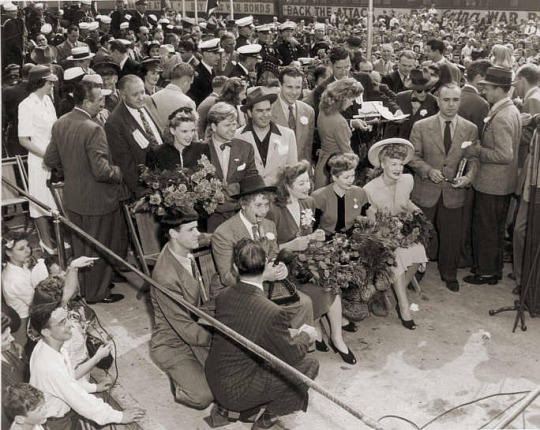
...and on September 26 went home to Los Angeles to conclude the 10,000 mile tour. A crowd of 6,000 greeted them at the station in Glendale as the Navy Band played "California, Here I Come."
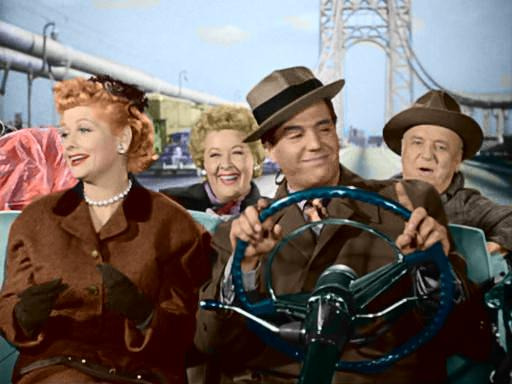
The song would memorably be sung on “I Love Lucy” to launch the Hollywood episodes in 1955.
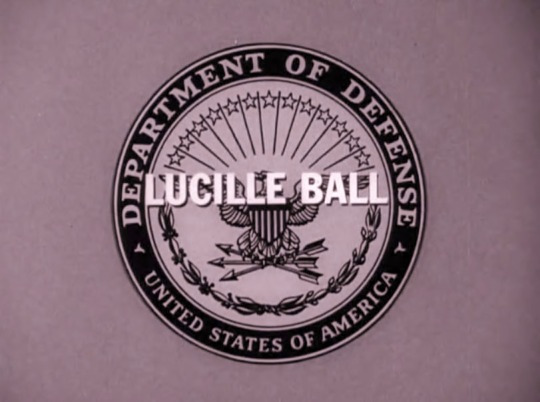
Lucille Ball helped sell bonds throughout her career. Click here for a look at Lucy and US Savings Bonds!
16 notes
·
View notes
Text
The Fates of Man
S3E7 recap
I’ve been actively avoiding spoilers for the finale so if some of this analysis has already been debunked then I’m sorry for the clownery you are about to read.
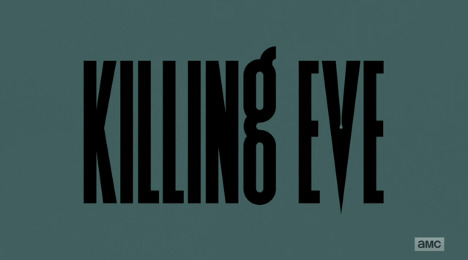
Firstly, I’d like to point out the infamous opening title cards are back but this time, they are a greenish color rather than the reddish color we saw in S3E2. It’s worth noting in this episode Villanelle wears green on more than one occasion while Eve is wearing a red colored shirt underneath her cardigan.
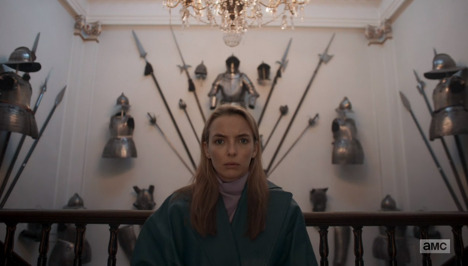

It’s an interesting use of opposing yet complimentary primary colors perhaps signifying that Eve and Villanelle are strong and bold personalities that lie on opposing sides of this spy game and the psychopathy spectrum, but they complement each other none the less.
In the opening scene, Villanelle is meeting with Helene and her go-to assassin Rhian. The purpose of this meeting is for Helene to assess Villanelle’s fitness for duty after her injury on her last mission.
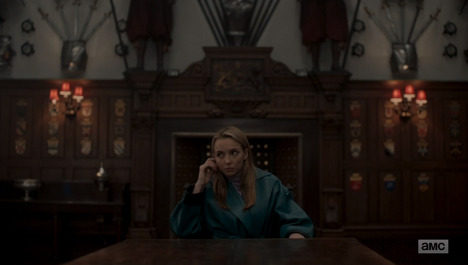
Despite almost failing completely at killing her last mark, Villanelle takes a seat at the head of the table (a seat associated with power and control) and projects an aloof and uninterested demeanor. What I find really odd about this entire encounter is that Helene mandates that Villanelle is unable to work because she is injured and NOT because of her unstable emotional state.

So I have to wonder, why hasn’t the Twelve sent Villanelle for a psych evaluation in series 3? When she showed she was losing her focus in series 1, the Twelve mandated she had to be cleared by a psychologist before she was allowed to work again. I find it very odd that that’s not happening this season but rather Helene was sent to promote her to Keeper and then bench her because of her arm despite the evidence that she is erratically emotional which is clouding her judgement.
Monstrous people like you often feel like they have to fly solo and keep things bottled up inside them.
Maybe Helene is taking a new strategy with Villanelle and is trying to manipulate her emotions and have her unleash them in a productive fashion. Either that, or she has an alternate plan that does not involve prioritizing Villanelle’s health and safety. I mean if she has Rhian, her own assassin that seems to get the job done, why keep a problematic assassin like Villanelle around? It doesn’t make a whole lot of sense on the surface which leads me to assume the Twelve is using her as a means to an end.
The scene ultimately ends with Helene asserting her power over Villanelle, with Rhian hovering over her shoulder.

Once they exit the room, Villanelle releases her emotions and seems to concede to the fact that she truly has no power in this situation and is very alone.

Her fate as a member of the Twelve is to act as a monstrous puppet and do her master’s bidding. I think this scene ultimately shows that Villanelle’s priorities have changed, and she cannot find peace of mind in the role as monstrous killer and she really does not want to spend the rest of her life by herself.
Later on, Dasha reminds Villanelle of both her loneliness and her lack of joy in taking lives.
This season has drawn many parallels between Villanelle and Dasha showing that both women are egotistical, perfectionist killers, and started their careers at young ages. I think the writers might be trying to show us what Villanelle’s career path might look like if she continues working for the Twelve. She could end up as a has been assassin who does not “still got it”, is forced to work with others despite hating every second of it, and is be manipulated by her handlers by being denied what she truly wants.
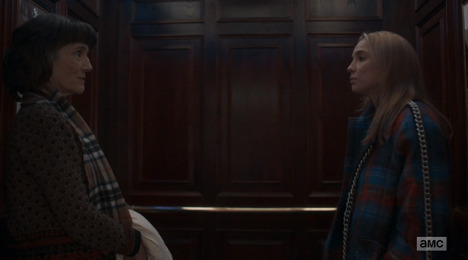
Dasha is under the impression that Villanelle is her final mission and upon completion she will be rewarded with what she wants: her freedom to return home evidently to her loved ones.
Sounds oddly familiar to Villanelle’s wish list, doesn’t it?
The fact that Dasha has family waiting for her is the metaphorical salt in the wound for Villanelle who is still in turmoil over her disastrous family reunion in which she realized that she doesn’t have that sense of family with her blood relatives that Dasha implies to have with her son.
Villanelle is also lacking the joy and power she used to once feel when she watched the life drain from her victims’ eyes.

This is something her and Dasha had in common as Dasha describes how she feels when she kills and how much she will miss that feeling once she retires. In fact we literally see HOW Villanelle NOW feels after she kills someone (or when she thinks she has killed someone).

Rather than feel powerful, she looks lost and panicked. She does not stick around to watch the life drain and take pleasure in that, instead she runs away from the situation entirely and tells her real mark to do the same. Ultimately, this illustrates that Villanelle choses not to walk the same path as Dasha and does not want to share her fate of working for the Twelve for many years to come.
On the opposite side of the murder spectrum is Eve Polastri who finds an injured Dasha.

It is here we witness the beautiful transition into Dark Eve which arises with provocation from Dasha…
Eve processes the new information that Dasha did in fact try to kill Niko.
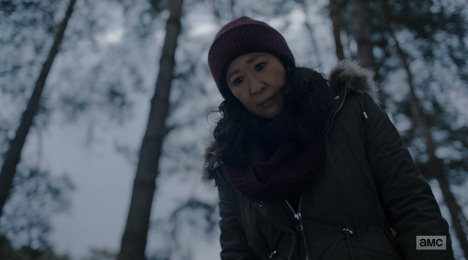
She calculates what she wants to do next to deal with this situation.
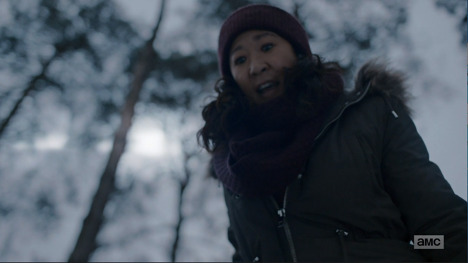
She chooses her own fate by acting as she wants to with a smile on her face. Revealing to us that, when in control of her decision to murder, Eve feels joy watching the life start to drain…

And she feels powerful while killing.
Could this mean that the higher ups in the Twelve could see this in Eve all along and have been keeping an eye on her to recruit her as an assassin? Or maybe Carolyn had similar hopes and dreams for Eve as well?
Either way, it’s as if Villanelle and Eve are both capable of murdering and revealing in that but they currently lie on opposite ends of this spectrum regarding how they feel about killing at this time.
Eve feels powerful while Villanelle feels powerless.
We see this juxtaposition with them in their final (and only) scene together.

When Villanelle first boards the train she seems sad and lost but perks up once she sees Eve.
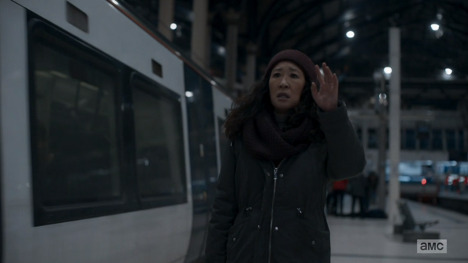
To her, this is tangible evidence that Eve cares about her and maybe she is not as alone in this world as she previously believed. This action from Eve causes Villanelle to reach out to Eve by calling her with the phone number she has apparently had this whole time. Her motivation here is to end the chase and create a new opportunity to form a real relationship with Eve; the one person who seems to care about her despite the chaos. It’s worth noting that Eve cycles through the same thought process when she receives the phone call that she did when she chose to try and kill Dasha (ie giving into her deepest desires).
Eve processes the new information that Villanelle is calling her.
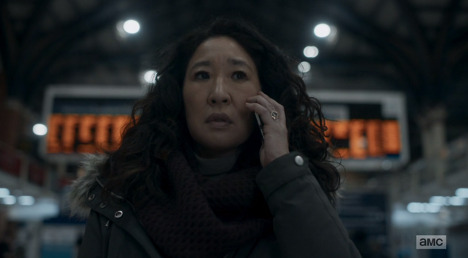
She calculates what she wants to do next to deal with this situation.

She chooses her own fate by acting as she wants to with a smile on her face.
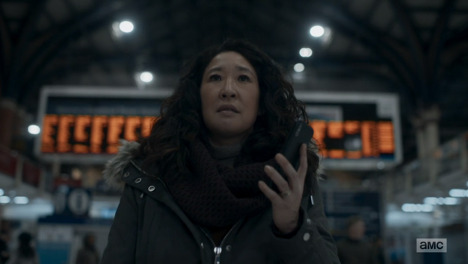
Carolyn begins this episode seemingly in control of her own destiny.

She is making progress with Kenny’s murder and has identified a weasel in MI6 that is working for the Twelve. However, by the end of the episode we see Carolyn realize that she may not be as in control of this situation as she once believed.
I feel the walls closing in on me. This is starting to feel personal.

As a long-standing MI6 agent and head of the Russia desk, Carolyn has to have been involved in many entanglements with the Twelve. In fact, in series 2 she successfully negotiated with them in regard to the Aaron Peele mission. Carolyn has managed to separate her MI6 work life from her personal life for many years and it seems like now that line of separation is breaking down. The death of Kenny and Mo now feel personal attacks to Carolyn rather than the typical collateral damage she is used to.
Perhaps Carolyn too will find a way to once again become the master of her own destiny rather than succumb to the will of the Twelve.
(Carolyn and Villaneve team up in series 4, please!)

Konstantin mentions death a lot in this episode and seems fixated on the many explosive tasks he is juggling. He claims that everyone in his life wants him dead because he is a prick and toys with the idea of letting the Twelve kill him since running away is pointless. They will eventually find him and kill him.

This conversation with Villanelle made me think of the promo photos and the concepts of The Fates (post). Interestingly, each woman has Konstantin tethered at the neck with flowing fabric from their respective dresses.
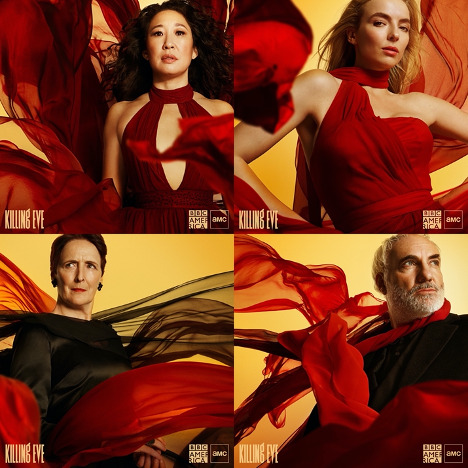
Konstantin is entangled with Carolyn, Eve, and Villanelle thanks to his money embezzling plan to gain his freedom from the Twelve.
This plan lead to the death of Kenny who was trailing the money and this personally affected Carolyn. Carolyn then involved Eve to uncover what foul play lead to Kenny’s demise which then directed Eve’s attention to chasing down Villanelle.
Konstantin seems to have now made peace with his decisions and accepts his doomed fate.
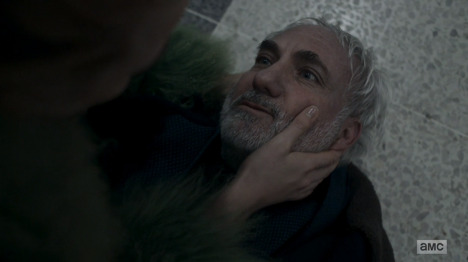
However, when he is on the brink of death during his heart attack he openly confessed that he doesn’t want to die with absolute honesty.
He is revealing in this moment that he will do whatever it takes to save himself and escape his grim fate.
I am a shit.
I think whatever his plan is it will involve redirecting the wrath of the Twelve from him over Carolyn, Eve, and Villanelle
Villanelle has already been implicated the most in the embezzling: she killed Kruger’s wife, a death that Paul is very interested in, and now her and Eve are going to retrieve the money (which now implicates Eve). Maybe Konstantin took advantage of Geraldine’s kindness and manipulated that situation to somehow frame Carolyn in all of this without her knowing as well.
Either way, this is a recipe for an explosive finale that will affect the fates of all the main characters.
#killing eve#killing eve season 3#villanelle#villanelle x eve#villaneve#Eve Polastri#Carolyn Martins#konstantin vasiliev#the fates#killing eve analysis#beautiful monster#i feel things when i’m with queue
19 notes
·
View notes
Photo
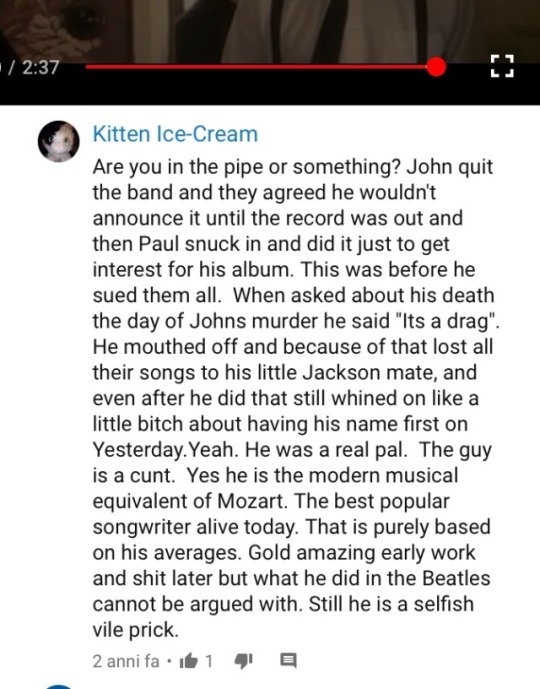
Ok. Here we are. Long post(/rant) ahead in response to the photo above.
Sorry for my English, but I had to get these things off my chest.
Thanks to everyone who will take the time to read this post, and tell me what you think!
1. They had all agreed to shut up about the “divorce” and he announced it to promote his album.
First of all, it was Allen Klein (one of the main villain in this wretched story) that had convinced John - who was very enamoured with him, his persona and his promises - not to tell anyone about it. In late December 1969 John, however, told journalist Ray Connolly, who didn’t say a word. Klein wanted to make as much money as he possibly could from the band, and announcing the break-up would have certainly damaged that prospect.
Paul did it in April 1970. That’s four months of limbo, of nothing. He was in the midlle of an uncertain situation, with a manager who profited off them and their work and that he didn’t want, his bandmates and closest friends against him. Paul loved the Beatles and being a Beatle, he never wanted them to break up but the time had come. George had wanted out for years but never left for good. We all know John had lost interest in the band and had already started working with Yoko. I feel like Ringo didn’t want the band to break-up, but just went along with the other two, hoping that Paul would eventually agree with them.
Releasing a solo album (that he put together without any help from the other three) while staying in the Beatles under Klein, with no hope of a follow-up to Abbey Road, in a tense situation, after John’s “divorce” private announcement, alone against the other three would have meant - for Paul - that everything he made from it would have gone to Klein for the most part. Of course he didn’t want that. Let’s not act like this didn’t affect Paul at all.
It must also be mentioned that, while he was working on his solo album, Allen Klein and John had contacted Phil Spector to work on Get Back/Let It Be, which had been shelved.
Back in Beatles headspace, Paul sat in a room at Cavendish Avenue and, with fresh ears, reviewed the results of the second version of the Get Back LP. To his mind, the music was stark, unadorned, frighteningly bare, but ultimately thrilling. Klein, meanwhile, bluntly deemed it ‘a crock of shit’ and conspired with Lennon to bring in Phil Spector, who had just overseen the rousing production of ‘Instant Karma!’, to rework the tapes. Unknown to McCartney, Spector booked studio time in March and began slathering strings and brass, fairytale harp and aaahing choir onto ‘The Long And Winding Road’, making it sound hopelessly corny, like a BBC orchestra backing Engelbert Humperdinck. At this stage, however, Paul remained unaware of this development, his thoughts somewhere else entirely. Secluded in his music room at Cavendish Avenue, McCartney began recording his first solo album.
Tom Doyle, Man On The Run
Then came a letter (maybe it’s just me, but I find it a little passive-aggressive) from the rest of the Beatles.
Ringo Starr stood on the doorstep of McCartney’s house at Cavendish Avenue, unaware that he was about to precipitate the end of The Beatles. His tricky diplomatic mission, which he had chosen to accept in his role as the chirpy drummer, was to convince his increasingly estranged bandmate that there was an unacceptable clash of release dates between the long-delayed Get Back – now renamed Let It Be – and Paul’s freshly minted eponymous solo album, which was due to be issued only a week before. With him, he had a letter, dated 31 March 1970, handwritten by John Lennon and co-signed by George Harrison. It read: ‘Dear Paul, We thought a lot about The Beatles and yours [sic] LPs – and decided it’s stupid for Apple to put out two big albums within 7 days of each other. So we sent a letter to EMI telling them to hold your release date ’til June 4th (there’s a big Apple-Capitol convention in Hawaii then). We thought you’d come round when you realised that The Beatles album was coming out on April 24th. We’re sorry it turned out like this – it’s nothing personal. Love, John and George.’ Paul – his patience already strained, his temper on a hair-trigger – invited his friend inside and very quickly absorbed this information. Then he erupted. ‘I told him to eff off,’ Paul says. ‘Everyone, to my mind, was completely treating me like dirt. It was kind of like, “We’re the big guys, we’re the grownups.” And I said, “No way, man. Get out.”’ Ringo swiftly departed with the sound of Paul’s fury ringing in his ears. McCartney refused to budge and his solo album was released on 17 April 1970, forcing Let It Be back another two weeks to 8 May. It was the moment when Paul McCartney finally gave up on The Beatles, the point where he mentally quit the group.
Tom Doyle, Man On The Run
Of course the news provoked public outrage, and Paul - trying to set the record straight - later said
‘It was all a misunderstanding,’ he protested. ‘I never intended the statement to mean “Paul McCartney quits Beatles”. I didn’t leave The Beatles. The Beatles have left The Beatles, but no one wants to be the one to say the party’s over’
Tom Doyle, Man On The Run
but John was furious because he had wanted to announce it to the world and Paul had beaten him to it. He didn’t announce it to promote his own solo efforts, he wasn’t the type of person to do such a thing: Paul left that limbo he didn’t want to stay in and did what had to be done, even though it was painful.
His first solo album resented from the announcement, and McCartney was destroyed by critics for ages because of it, not because of the songs, and by John, George and Ringo too.
2. “He sued the Beatles”
Yes, he sued them, that’s a fact. He sued them in December 1970, at the end of an year during which he had received worldwide hate and criticism for his actions and for his album. He could have sued the other three immediately after the release of McCartney or Let It Be (and he was booed during screenings of the movie), but procrastinated and thought a lot about it. He also had a nervous breakdown because he felt worthless and useless and because of that difficult situation within the group (which at that point didn’t exist anymore) and with Klein. We could have lost him if it hadn’t been for Linda.
There was no other escape from that situation. He brought his former bandmates to court with a heavy heart. He “killed” the Beatles, but he also saved them from their manager. In the end they all recognised Paul was right about Klein, and he did them a favour by freeing them from that shark and from Apple.
3. “It’s a drag”
Imagine having just learned of your close friend’s sudden, terrible death at the hands of psycopath. Imagine burying yourself in your work, in the studio to deal with your grief, and crying your eyes out all the while (George Martin was there with him, and I trust George Martin). Then you come out of the studio and a journalist shoves a microphone in your face, prying, asking you for a reaction to the sad news you’ve been trying to deal with for hours. He probably was still in denial. Everyone has a different reaction to death and grief.
4. “He lost their songs to his little Jackson mate”
Paul and Michael had worked together on two singles, and MJ had hung out with the McCartneys in their Scottish estate. He had also asked Paul for financial advice, and he suggested investing in song-publishing. The Beatles catalogue was up for sale and Jackson seized the opportunity. Of course Paul didn’t think MJ would go after their songs and was upset about it (eight years of his and his former bandmates’ hard work in another man’s hands? I would be furious) and he and Yoko weren’t able to outbid Michael and to get the songs back, which only happened ten years ago.
5. The credits for ‘Yesterday’
Every song in the Beatles catalogue that wasn’t a cover, written jointly with Ringo or written by George was credited to Lennon-McCartney, even when they wrote and composed separately (especially after 1967). Paul and John also agreed that the credits could be reversed, if either of them wanted to, on any future releases.
When I first got into the Beatles, I thought that that was a good arrangement, but in my book the name of the main composer should go first. For example,in my opinion, A Day In The Life is correctly credited to Lennon-McCartney, but Eleanor Rigby, which was Paul’s creation with some input by John, should be McCartney-Lennon. But this is just my opinion.
Now, Yesterday. We all know Yesterday was and is Paul’s baby. John repeatedly said he had nothing to do with it. In Wings Over America (1976), Paul reversed the credits for five Beatles songs, and John didn’t say a word about it. In 1996, before the release of Anthology 2, Paul asked Yoko to reverse them only for Yesterday, and she disagreed. He didn’t ask her to remove John’s name. After Yoko’s refusal, (probably unbeknownst to Paul) Linda, who was at the height of her chemo treatment, phoned her to ask the same thing, only to be answered “That’s never going to happen”. She could have been more empathetic and polite. Maybe she refused beause Yesterday is the most covered song of all time and still makes a lot of money?
6. “Salieri and Mozart”
Some people may argue that I’m bringing Yoko into this for no reason whatsoever, but - actually - there is a reason. The comparison with Salieri and Mozart was made by Yoko herself in a BBC interview in December 1997, when Linda was diagnosed with terminal liver cancer. Put yourself in Paul’s shoes.
Your wife is dying and your best friend’s widow rubs salt into the wound and describes you as the Salieri to her late husband’s Mozart. Common knowledge has it that the two composers were enemies, and that Salieri even poisoned Mozart, but in reality the Italian musician was Wolfgang’s mentor and tutor, and we probably wouldn’t have had Mozart without Salieri. If you choose to make that comparison just as Yoko made it, you should keep in mind the historical truth, and that Salieri was essential.
The person who made the comment said that Paul is the modern equivalent of Mozart, and for a reason. Mozart had been a musical prodigy since his childhood, and Paul was and is still considered by many an all-round musician and multi-instrumentalist. People who worked with the Beatles like George Martin and Geoff Emerick, their sound engineer, even said that he was the most musically talented of the four. He also composed Yesterday in his sleep, for heaven’s sake!
You can have your favourite among the four Beatles, but you can’t deny his talent. (The commentator isn’t doing that, but a lot of people did it in the past and still do to this day.)
7. *I’m not going to repeat those last words*
Read up on his life and work, dear commentator, and then tell me if you still think that. And his solo work shouldn’t be dismissed like that. Maybe I’m Amazed? Another Day? Band on the Run? Live and Let Die? Here Today? I could go on. (The other former Beatles wrote some clunkers too, let’s not forget that).
I think that many of the nasty, horrible comments about Paul come from what John said about him immediately after the break-up. John regretted them later, walked back on them, apologised and made peace with Paul (who never badmouthed him in the press), but the media ignored that and continued spreading lies. Paul wasn’t and isn’t perfect, neither of them was. A lot of people (mainly boomers) just like to act like John was Saint John of Peace from Liverpool and never did anything wrong, while the other three were inferior to him and evil people, especially Paul. Nowadays (thankfully) people tend to be objective and to not believe the old whitewashing propaganda that has been perpetuated by the Lennon Estate. But this post is not the place for that.
#i've written a testament#but it was worth it#i'm going to tag john too because i mentioned him a lot#paul mccartney#john lennon#the beatles#rant
71 notes
·
View notes
Text
Time travel rescue pt.3; 11th Doctor x teen reader ft. Queen
*Author’s note*
Alrighty now the next part will be the last one for awhile till I get around and finish writing pt.5 so you all will have to be on hiatus for a bit till then. But I’m happy to see people taking notice of this new mini-series crossover. Trust me this was really fun to write, but we get into a serious note. So here are the warnings for this specific chapter.
Warnings: Parent abandonment, gang activity, drugs, violence, knives, attempted murder, but I SWEAR NO ONE DIES IN THIS PART I PROMISE!!! So if any of these things make you uncomfortable, just skip this part, you won’t be missing much, (plus all this stuff get at around the middle of the fic and the end so you can read the beginning and then skip the middle, trust me you’ll know when one of the warnings begins)
Taglist:
@psychosupernatural
@plethora-of-things
@ixchel-9275
@waddles03
@platawnic
@bensrhapsody
@queendeakyy
@kairosfreddie
@geek-and-proud
_________________________________________________________
I arrived at the Hammersmith Odeon and snuck past security using my own psychic paper that the Doctor had given me (in fact this is the first time it’s worked with just me alone so I was praying that it did. Thank god it did). I told him that I was a new volunteer to Roger’s assistant called in to help check in and make sure his drums were in tiptop shape.
Thankfully security at the time of the 1970’s just let anyone come in and out, not as fully overprotective as they are nowadays. I walked through the doors and soon came onto the stage and I just took it all in. I myself had never been to the Odeon theater, but I knew every square inch from the concert footages Queen did every time they performed here, and I couldn’t believe my luck that I was actually here, here.
As I walked closer to the stage, I was in awe to see Roger’s drum kit all set up and ready for rehearsal. I couldn’t help myself as I walked right up onto the stage and stood right before his drumkit, my eyes immediately catching the Queen logo on it designed by Freddie Mercury himself.
“Hello gorgeous.” I whispered as I very slightly stroked one of the crash cymbals. I walked around the back and couldn’t help myself but sit down and I stroked along the floor toms where Roger was most known for pouring his beer on at the time to make it go really high once he hit it to make it theatrical and rock-n-roll.
I then noticed his drumsticks sitting on top of the one of the two middle toms and I couldn’t help but grab them. Just touching them felt like I was touching something created only by the gods of drums themselves. I twirled one of the stick very skillfully in my hand, much like how Roger does and I thought about what to play.
I knew I couldn’t risk playing any of their future work (which is a shame cause not to brag I could play a mean Hammer to fall) but there were still plenty of choices to play that involved the guys’ early works.
So I decided to try my hand at playing the solo I knew he would play at the live performance Christmas eve, because besides the solo at Montreal 1981, the drum solo he did here for the Christmas eve performance at the Hammersmith was one of my favorite drum solos for Keep yourself alive.
I heard the tune in my head and did my best to replicate each of his movements that I saw him do time and time again every time I would watch that concert. I hit the bass drum when needed, the middle toms and the cymbals were the ones that got struck the most, I played the cowbell when it called for it, and I rhythmically beat down on the floor toms when needed.
I’ll admit there was a slipup here and there (cause hey I hadn’t even reached my five year marker from self-drum lessons). When I knew the drum solo ended I struck the cymbals one last time before grabbing them so that the echo wouldn’t last long.
Already I felt winded cause it’s been awhile since I drummed with my own kit since I was so busy with the Doctor. But I was shocked when I heard four separate applauses. I turned around and there stood Freddie, Deacy, Roger and Brian all with impressed smiles spread across their faces.
I smiled nervously and set Roger’s drumsticks back to where I found them and stood up and lightly curtsied before them.
“Well that’s it Rog we’ve found your replacement.” Joked Fred.
“I wouldn’t go saying that. I’m mediocre at best compared to Roger Taylor.” I said.
“Oh don’t be so modest darling, if you were any more modest you’d be Brian.” Brian looked at him before turning to me and he asked.
“So how long have you taken an interest in drums?”
“Only a couple years now. I was like—14 maybe 13 I can’t remember. My nana actually bought me my first drum kit.”
“Did you take lessons?” asked Deacy.
“Oh no we couldn’t afford drum lessons. I’m—kinda self-taught. I taught myself to play the drums by listening to different records. I know it sounds weird and a bit risky but—nana always told me that I had a keen ear for music, especially the harmony section. She caught me banging on the table with two pens and she’d name the song I was playing.”
“With skills like that I would’ve thought you’d been playing for at least 7 years.” Roger spoke up as he handed me a cup of water. I thanked him and took a sip, “And yeah there were some mishaps that I heard but maybe I could teach you how to properly strike the drumsticks in order to get the perfect sound.”
Oh my god. Did I just get offered a tutoring session with my hero? Roger Taylor was willing to give me a drum lesson? Holy shit nobody pinch me because I better not be dreaming.
“You’d—you’d really do that?” I asked.
“Absolutely. Hardly do I ever see a female drummer and you definitely got the skills love. In fact I’d be honored to teach a worthy student such as yourself.” I blushed at his praise.
“So (y/n) what other songs can you play?” asked Brian.
“Well mostly your stuff is what I first learned to play but I can play some other songs.” I stated.
“Do you know the opening to our song Liar?”
“Do I? That’s like my favorite live performance song you guys do. Well next to Bohemian Rhapsody.”
“Well let’s hear it lovie.” Roger told me as he held his drumsticks out for me to take. I took them in my hand and twirled the sticks again before playing the opening note with the cowbell. I heard the opening in my head and then immediately switched to the high and middle toms before going down to the floor toms and alternating both floor and middle toms.
But what I was shocked to hear next were the joining sounds of Brian’s Red Special as well as Deacy’s bass, even Fred got involved with the tambourine. Roger stood behind me to observe and he would occasionally point out where to go next or whisper a brief tip on how to strike either the cymbals or the floor toms.
Once the intro was done, I exhaled and wiped the sweat already coming down my face and rubbed my hands.
“Well I guess it’s my horror to say that you’ll put me out of the job love.” Roger teased with a grin.
“No, no, no Rog. Like I said I maybe good but I’m nowhere near your speed.”
“But you are getting close. Looks like I better watch my back.” He said as both his hands came on top of my shoulders and he massaged my shoulders which made me rock back and forth.
“And once she surpasses you we can replace you. Maybe she’ll have some sense and not lock herself up in a cupboard like a child over a song.” Said Deacy. Whoa wait a second that actually happened?! I thought that was just a rumor.
“At least my song is worth more than yours was. ‘I’m happy at home’? What the hell kind of rock and roll lyric is that!?!”
“Children please. It’s already set and stone and Deacy’s song is a hit single in America.” Freddie said trying to tone down the heat before the flame got worse.
“Whatever Fred.”
“Alright well we’ve only got an hour for lunch, what do we say we head out and get us something before Reid or in worse case Paul comes in and tries to make us rehearse before we even have the chance to eat. I had to skip breakfast this morning.” Brian said.
“Well then you shouldn’t have slept so late Brian.” Deacy said.
“I hate mornings Deacy, not my fault.” As the boys went ahead it was just Roger and I as we got on our coats.
“So how did the search go? Did you find him?” he asked me.
“No.” I said solemnly.
“Do you have a number that you can call him on?” I mean I did but it was in my cellphone and I’d really rather not show it to Roger because wireless phones weren’t even invented yet, not till like 30 years from now. And even if I could try the Tardis number from memory, there’s just too many numbers for me to keep track of all of them.
“His line’s been down lately. Bugger always has it off the hook for whatever reason. Roger I’m really worried about him. He can be—a bit eccentric and—jumpy after something like this.”
“Hey, it’ll be okay. For now let’s get some food in that belly of yours then after rehearsal I’ll help you find him okay?”
“Or—maybe I should stop trying.”
“Don’t say that love, okay? I promise we’re going to find your friend okay?” I looked into those deep blue eyes of his and I just felt this warmth, that everything Roger had said was true. I nodded and that’s when he leaned his forehead against mine.
Our noses softly touching each other’s and we just stood there with our eyes shut, drawing in each other’s strength.
We got lunch at a nearby pizza joint and I was told tons of stories about the guys. Things that not even the fans of the future on tumblr even knew about (but to respect their privacy, I will not disclose any of that).
Freddie told me about how he and Mary first met each other and how he and her have a flat together. He also told me about his precious furbabies and even showed me a photo of them that he kept in his wallet. I awed at the pictures and he pointed out each cat in the photo; Tiffany, Oscar, Tom, Jerry, Lilly, Miko, and Romeo.
Deacy shared a little bit about his marriage with Veronica and the birth of their first born son Robert. Aww so Robert was born around this time. He even allowed me to see a picture of them, it was a recent picture taken around 2 months ago and he shared that his boy was now 5 months old.
He said he was a handful but Veronica and him loved him to pieces. And I know for a fact he did, I mean I’m talking to the one Queen member who ended up having 6 kids all with the same woman.
“Is that why you dedicated your song to her?” I asked.
“Well it’s only partially true.” I looked at him confused.
“See while I did dedicate it to Veronica, I also kept thinking about my son while I was writing the song. I just imagined playing catch with him in the front yard, teaching him to ride a bike, just—being there for him. So it was both for her and my son that my song is dedicated to.” Aww why couldn’t my damn alcoholic/drug addict of a father be like Deacy?
And the same was said for both Brian and Roger. I got to learn so much about these guys that it felt like I was somehow becoming a part of their little group, their family. Which was a feeling that was quite alien to me (no pun intended since I am technically friends with a timelord) but I liked it.
After lunch, I got to watch the boys rehearse some more till it was nightfall and currently Roger was giving me that drum lesson that he promised. Ohhh I can’t believe I get to say that I got to have a drum lesson with the Roger Taylor of Queen.
“Okay so when it comes to playing Keep yourself alive, you always must keep hitting the bass drum in order to keep the tempo. The drum is like the heartbeat of the band. If it’s all out of sync, then we just sound like rubbish.”
“Okay so when it comes to the first opening note, I can go either cowbell tempo or the high toms?”
“Yes I mostly prefer to use the high toms as the main intro but once you commit to one thing, you gotta follow through with it.” I nodded.
“Now when it comes to playing Now I’m here, do you just find yourself going crazy cause I’ve tried to play it and all I end up doing is act like I’m having a seizure.”
“Yeah it can get easy to just let it all go, and sometimes I find myself doing that for the intro. But the way I remember is just go from high to low on the drum kit. The cymbals, to the high and middle toms down to the low toms. But mainly keep the rock out on the middle and high toms.”
“Okay.”
“Okay let’s see what you got. Start with the double cymbal. I’ll lead you in.” I nodded and twirled his drumstick around. He then began singing Freddie’s part and I nodded to the tempo of the song as I could hear it in me head. When he got midway through the intro at the “Now I’m here/there.” I slammed the cymbal twice before catching it so that the sound would go silent.
Then when Roger sang the “I’m just a” line right before the rock out came on, I did as he said. I went from high to low on the drum kit as Roger kept singing. Once that was done, I caught the cymbals so that they ceased their ringing and Roger clapped.
“Phenomenal lovie, you are truly the best drummer I’ve seen.”
“Thanks Rog. I couldn’t have done it without all your teachings.”
“Well with the speed you’re going you won’t need my teachings for very long.”
“Oh my word. Never did I think I’d live to see the day when Roger admits that someone is better than him at the drums.” We looked up and Deacy soon came in but it wasn’t him that spoke out, it was the woman next to him.
She had long, dark brown hair and a beautiful face even without makeup on. In her arms she held a tiny baby boy and judging by the way Deacy had his arm around her, this had to be Veronica.
“Ronnie, so good to see you. Still seeing your husband’s painted me to be a dick.”
“Hey now no swearing in front of the baby Roger.” She warned him.
“Right, right sorry Robert bubbies.” Roger cooed down towards Robert and he lightly began tickling his tummy which made him coo and laugh. I couldn’t help but smile at the adorable sight and that’s when Veronica turned towards me and asked.
“And who’s this talented young lady?”
“Veronica love, this is (y/n). (Y/n) this is my wife Veronica.” John introduced us as he went ahead and took Robert off her hands for a bit. Veronica held out her hand and I shook it.
“Nice to meet you.”
“Nice to meet you too.” We both greeted each other with a soft smile. God she was beautiful, just like the pictures I’ve seen of her. Sure she was older in the pics because like her husband, she preferred to stay out of the limelight but she still supported her husband through and through. Which is why in the real world, they are my OTP.
“So how did you meet my husband and his friends?” she asked me.
“Well I first ran into Roger the other night.” I explained.
“(Y/n) here got jumped by some arseholes.” Said Roger taking his break from playing with Robert.
“Oh no you poor thing, you okay?”
“Yeah I am. Thanks to Rog and his friends.” I said as Roger came up to me and he playfully gave me a noogie.
“So where are you staying?” she asked me.
“She’s staying with me for now. She had a friend with her that night and we haven’t found him yet. I’m hoping to help her tomorrow since we don’t have as long of a rehearsal tomorrow.”
“Well you know (y/n) if you’d like to take a break from these guys, you’re more than welcome to stay with me at the hotel I’m staying at.”
“How far is it?” I asked.
“Oh it’s just a mile from their hotel.”
“No Veronica how dare you try to take my roommate from me!” Roger exclaimed as he wrapped his arms around me tightly almost to the point of smothering me.
“Rog don’t smother the poor girl.” Said Deacy. Roger released me from his strong embrace allowing me to breathe.
“Besides I know what hanging around you guys for too long does. At least let her hang around someone whose sane and won’t start an argument every five minutes.” Veronica said. Deacy looked at her accusingly and she said, “John you know I love you but let’s be honest, you can be a bit bitchy.” Roger softly laughed before looking down at me.
“Well (y/n), do—you want to go with Veronica for the night?”
“I—well I don’t want to impose. Especially since you have your son.”
“I wouldn’t mind, in fact I could use the extra hand since my love is pretty much busy for the next few days.”
“I promise I’ll try to be over by tonight though.”
“I know you will.” She said as Deacy cupped the side of her face as Veronica nuzzled against her husband’s palm. Gahh I can’t take seeing them together it’s just—so kawaii!
“Well—if you don’t mind. Then I could spend a couple of nights over at your hotel.” I said. She smiled and said.
“Now worries (y/n), we can leave after we all get some dinner.” And that’s what happened.
Soon Veronica and I arrived back at her hotel room. She insisted on helping with my bags but I told her that she needed to take care of Robert and that I could handle everything myself.
Once I got unpacked and changed into my pajamas, Veronica was putting baby Robert to bed. As I watched her look down at her son with loving eyes, I couldn’t help but just feel envious of Robert. They were the perfect parents to Robert who gave him nothing but love and attention and he wasn’t even a year old yet.
She was reading to her son a lovely bedtime story while sitting in the rocking chair. Baby Robert cooing as he leaned against her chest trying to fight off sleep, but the sound of Veronicas soothing, motherly voice as she read to him made him fall asleep.
I couldn’t help but turn away and try to hold in my tears. I buried my face into my hands and bit my lip to hold in any sobs that tried to come out. Damnit what I wouldn’t give to have parents like Deacy and Veronica, instead my parents cared more about their next fix rather than their daughter.
I was a means to an end to them, when they really did notice me it was before they could sell me for drug money. I could’ve been sold off, molested by drug abusers, hooked on drugs and probably died by 5 years old from malnourishment. Why didn’t they love me?
“(Y/n)?” I looked up to see Veronica standing over me looking at me concerned. “Are you okay sweetie?” I sniffled and wiped my tears.
“Yeah. Yeah I’m fine….I’m fine.” I choked out as I turned away from her still wiping my tears.
“You don’t have to lie to me.”
“How can you tell?”
“You and John do a similar thing. You refuse to make eye contact with me whenever you lie. So come on out with it. What’s going on in that mind of yours? Is it your friend?”
“No, no. I—god you’re gonna think I’m a horrible person when I say this.”
“Try me.” Wow she’s such a sweetheart. As she rubbed my back comfortingly and handed me a box of tissues, I dabbed my eyes of the tears and I said.
“I—envy your son.” She looked at me confused and that’s when I continued, “I—I haven’t even told Roger the entire truth but uhh—my parents were…..drug addicts. Hell my mum never even knew she was pregnant till she gave birth to me behind a dumpster. I was—merely a coat to them. They only noticed me when they wanted to. Then when I was 3 they—” I trailed off and shook my head.
“You don’t have to explain anymore (y/n). God I—I cannot even begin to think what you went through. You poor thing.” She tucked a strand of hair behind my ear and I said.
“I always believed that—all parents were like that. That’s why I also denied authority in my younger years. But then seeing you and Deacy speak and treat Robert like that it—” more tears spilled from my eyes and that’s when Veronica took me in her arms and proceeded to rub my back comfortingly.
“Ohh (y/n) I am so sorry you had to go through something like that. But think of it this way, even with a sad and troubled upbringing, you’re still this beautiful, talented, charismatic young woman. Who I believe one day is going to change the world.”
Wow—I mean I read on biography information that she was sweet and down to earth but this—it was just completely mind boggling. I mean I’m barely an acquaintance of her husband and she’s already treating me like I’ve known the boys for years.
“Thank you Veronica.”
“You’re most welcome love, do you feel any better?”
“Yeah I….I’ve never really had the chance to cry about my past….at all really.”
“Well I’m always here to offer a shoulder to cry on, or if you want to get away from the boys.” We both chuckled and that’s when she got up and actually made me some hot chocolate as a comfort drink. As I sat there for a while, I saw Veronica going through Robert’s baby bag when she said.
“Oh darn it.”
“What’s wrong?”
“I thought I packed enough diapers for Robert but I guess I used the last of it just before his bedtime. And I can’t ask John to run the errand for me because his hotel’s 20 blocks from here.”
“You can go get the diapers, I’ll watch Robert.” She looked at me wearily.
“Are you sure? And I don’t mean this in a crude way but do you know how to take care of a baby?”
“I’ve dabbled here and there with some neighbors around my nana’s place.”
“Are you sure you can handle it?” she asked worriedly.
“Hey Veronica, trust me I’ve got this. Besides it’d be better than driving with a baby boy with a wet diaper to the nearest store, get the diapers, come back here, change him and put him back to bed.”
“You’re right okay well if you insist. His bottles are already made and in the fridge. Just warm it up for about 30 seconds in after putting the water in for the same amount of time. Uhh if he drops his sea turtle in the night just put it back in his crib. I should be back in a few minutes so you won’t deal with him long okay?”
“We’ll be okay Veronica now go. Go get those diapers before a store closes for the night. Especially with the holidays getting closer.”
“Yeah you’re right. I’ll be back in about 10 minutes if not 5, think you can be in charge for that long?”
“No worries you can trust me Veronica, now go.” She nodded then grabbed her coat, purse and keys and headed out the door. I went to take a quick peek over at baby Robert to see that he was still asleep which put me at ease so I went back into the main room without a second thought.
I managed to find a random fashion magazine probably given by the hotel management and just browsed through it. Now I’ll admit some of this stuff that came out during the 70’s I’ll admit were super stylish and I kinda wish we kept them around. And yeah call me an old soul but hell I’ve been everywhere far, wide and in between.
But as the minutes ticked by, I kept getting this itch that something wasn’t right. It reminded me of being back in the gang when a standoff would happen and next thing we would know, BANG! BANG someone got shot in the head or heart.
So I went back to check on Robert to see that he was still fast asleep in the pitch black room, but there—there was just the feeling in the air that someone else was here in the room. I thought I heard the chair rock but I was nowhere near it, I carefully and slowly reached into my back pocket my 6 inch tiger claw knife.
I actually caught sight of these when helping out with a weapons trade when I was around 12. I saw this knife along with the tiger-like claws along the handle and I thought ‘damn this is a badass weapon’. So I swiped it and no one suspected a thing. I readied it on my right hand and decided that anything I would see move, I would attack.
Because I’ll be damned if anyone attacks Robert.
It was then I saw a shadow quickly go past the door and I sprung out and immediately attacked the person. I stabbed them repeatedly and all I got in response was an animal-like hiss, a very familiar animal like hiss. The thing and I rolled on top of each other before I kicked them out towards the living room and there I saw it.
It was the fish-humanoid creature that had somehow gotten on the TARDIS, however it wasn’t the exact same one that pushed me out. This one was more strongly built and had a more greenish tone than the previous one. But those eyes, webbed hands, claws and teeth were still the same.
I stood guard over the door holding and skillfully spinning my tiger-claw knife that I wasn’t gonna let this beast get by me without a fight. It snarled as it stared at me pacing back and forth but I kept my eyes and would adjust my stance following it’s every move so that it wouldn’t sneak by me.
But then I saw it smirk at me before it suddenly morph it’s shape into a more human form. The claws shrunk to fingernails, the skin became slightly more tan and long blonde hair began to grow out of its head. Soon standing before me was none other than Roger.
Oh shit. What if—what if this thing was some kind of a siren? I mean it would make sense, fish-like creature, able to turn into a handsome person whether male or female. But there’s one thing this siren didn’t really include, I may love Roger but not in the way it thinks I do.
So I literally had no problem with lunging right at it and pinned it against the wall. I got a knee right where the sun didn’t shine before getting a few good jabs in.
“Nice try, but our love is different you bitch.” The siren eyes shifted from Roger’s famed blues back to its pitch black as it’s teeth and claws came back out and it lunged for me again. It tackled me against the counter and proceeded to try and take a bite out of me but I held it back with as much strength as I could before finally taking a stab at it through its shoulder.
It hissed in pain before taking my wrist and twisting it to the point where I heard the bone break. I let out an agonizing scream as it then grabbed me and threw me towards the table which broke the glass top and I lay there groaning in agony. It’s eyes glared at pure hatred towards me before it turned its attention back towards the bedroom.
It suddenly turned to water and it drained right towards the bedroom. Oh fucking hell you don’t! I tried as best I could to get up and crawl towards the bedroom. I saw it’s shadow standing over Robert’s crib and it took my knife out of it shoulder before admiring it and turning down towards Robert.
No, no, no, no, no, no! That bastard was gonna point the blame on me for killing John and Veronica’s first born! It grinned maliciously at me before pointing the blade right down to Robert.
Suddenly a high pitched sound came out of nowhere and the siren dropped my knife to the floor. It held it’s ears in agony and hissed an echoey type shriek as it’s form kept reverting between it’s true form and Roger’s.
I took this as my moment to take my knife back and tackle the damn bastard down to the ground, but in that process, we had actually knocked the crib over and the next thing that echoed through the room was Robert’s crying.
I trailed behind the siren until I managed to corner it behind the rocking chair and the drapes. I pinned it down with both my legs and stabbed it repeatedly in the back roaring and crying out before finally slicing it’s neck which stained the corner of the room with it’s blood.
Robert’s crying softened as I came out from the corner of the room and collapsed exhaustedly to the floor covered in the siren’s blood.
“Do you have any idea how worried I was about you missy?” I could hear Robert’s cooing and I heard the voice say again, “Yes, yes she did save your life. And she was very brave at that too.” I turned around and smiled and chuckled softly.
“Doctor.”
#doctor who#doctor who imagine#doctor who fandom#doctor who fanfic#doctor who fanfiction#doctor who imagines#11th doctor#11th doctor x reader#11th doctor x teen reader#queen#queen band#queen fanfic#queen fanfiction#roger taylor#brian may#john deacon#freddie mercury#john x veronica#john deacon x reader#roger taylor x reader#brian may x reader#freddie mercury x reader#queen imagine#queen imagines#john deacon x veronica tetzlaff
51 notes
·
View notes